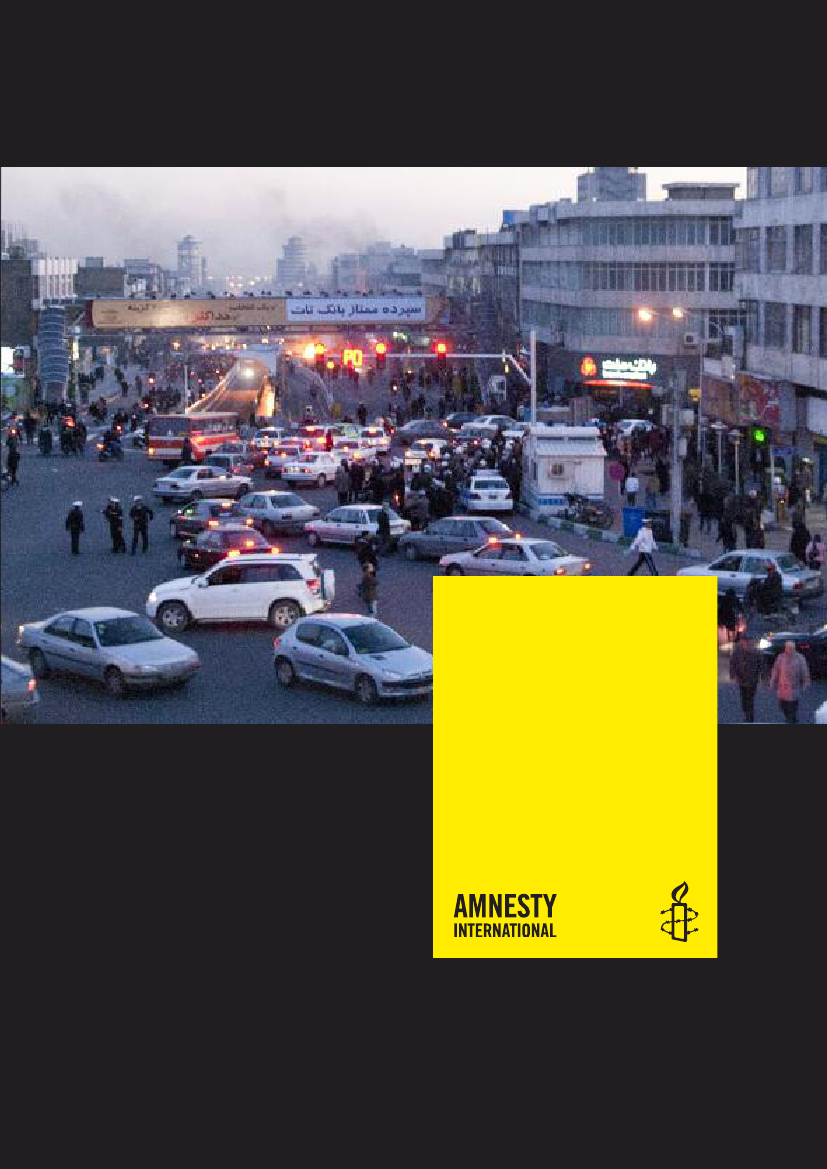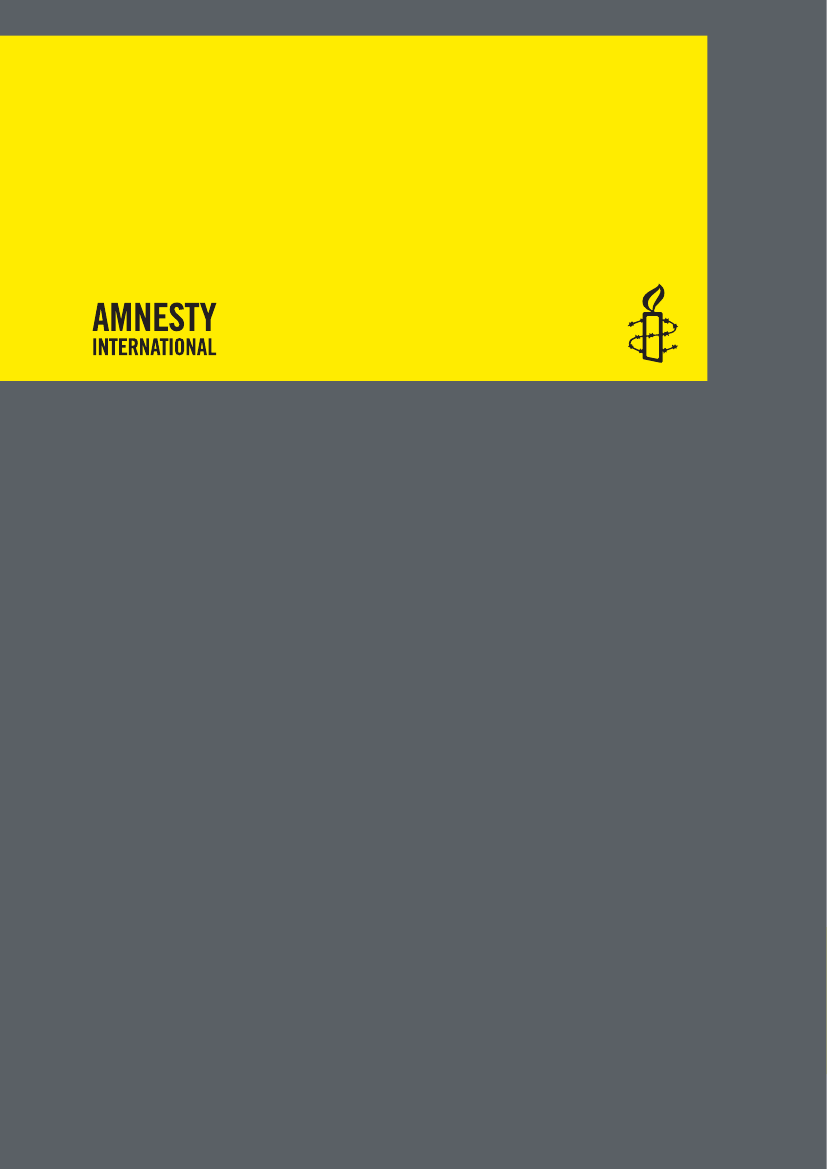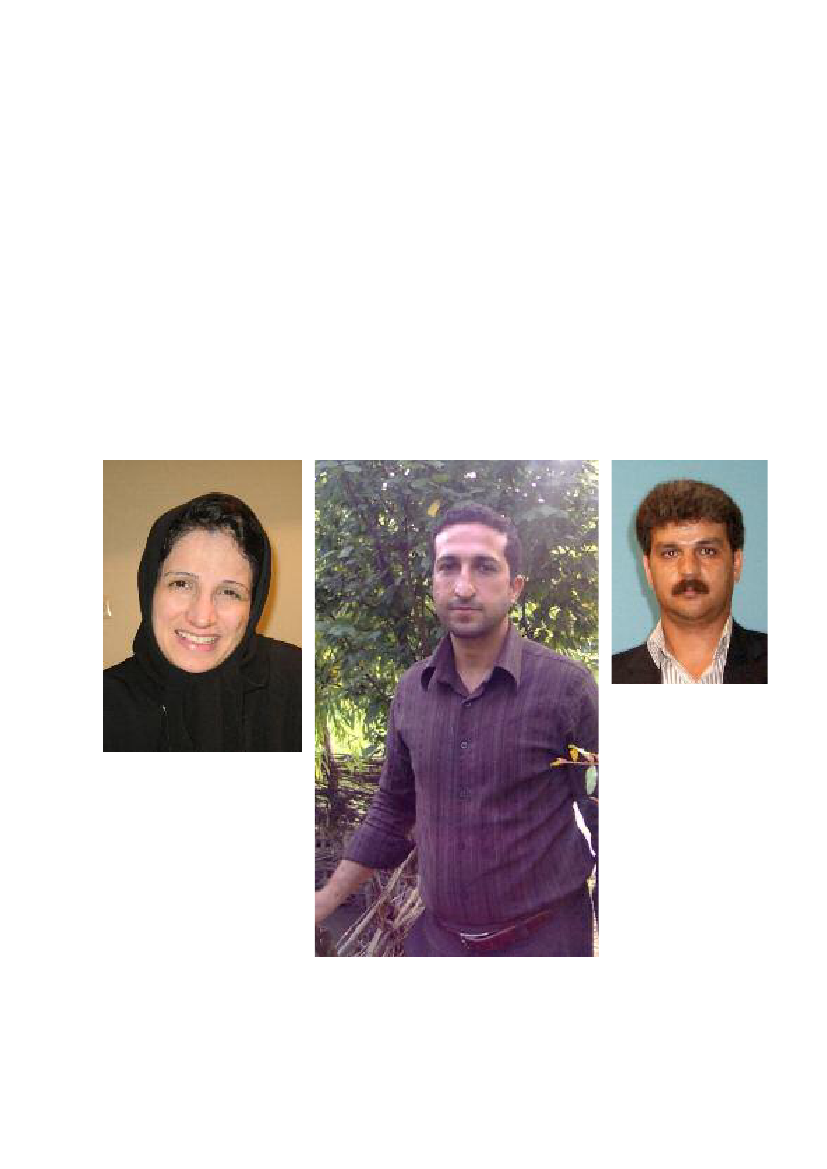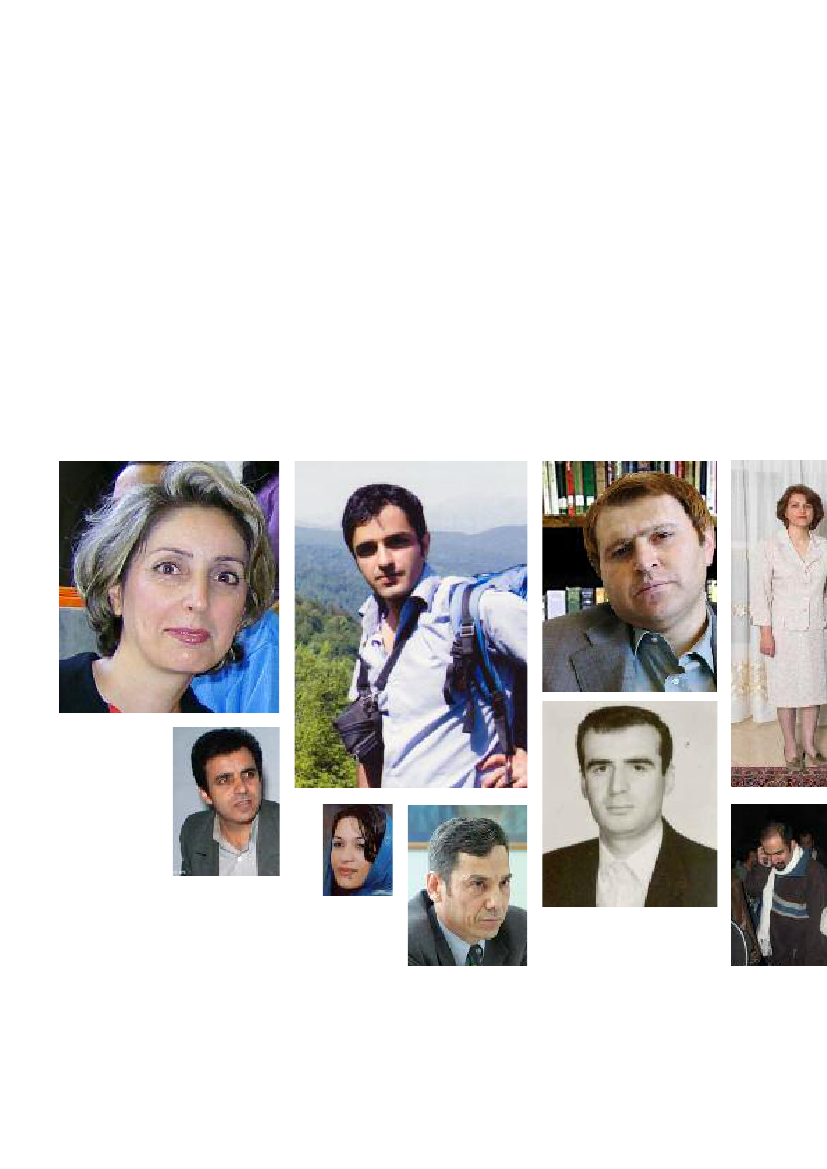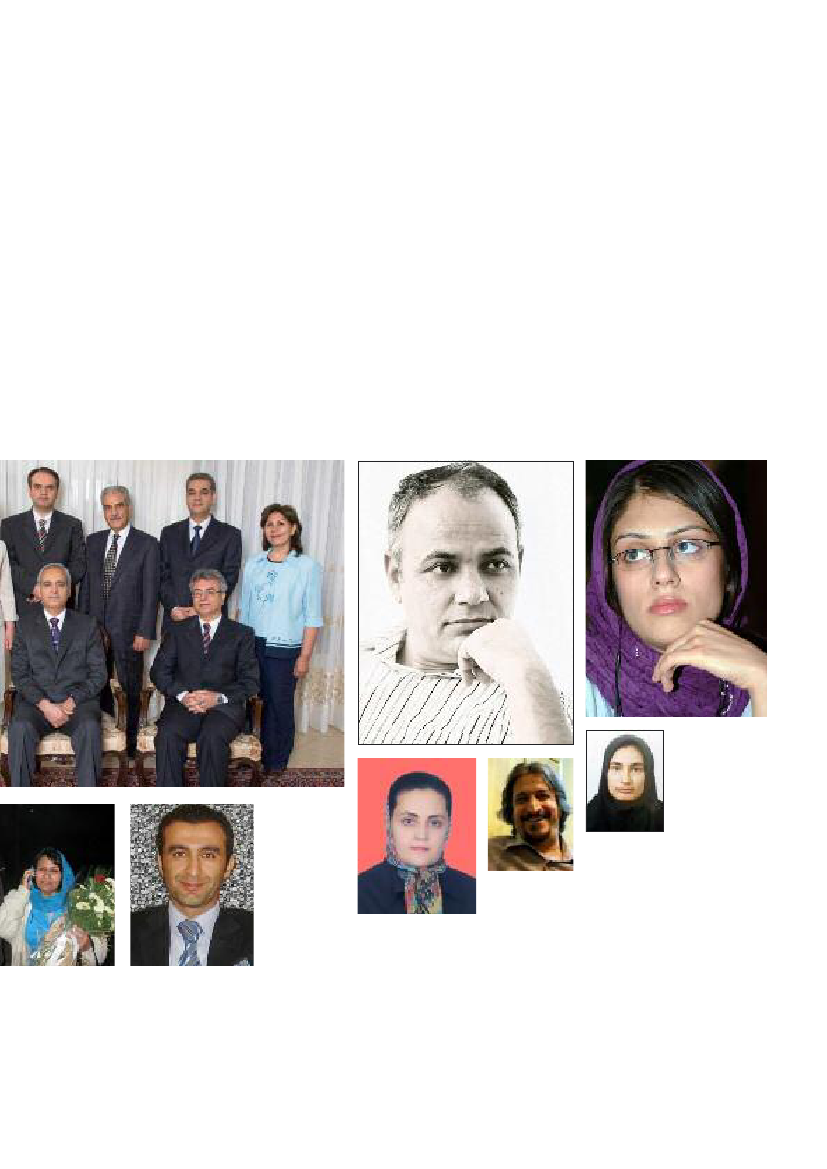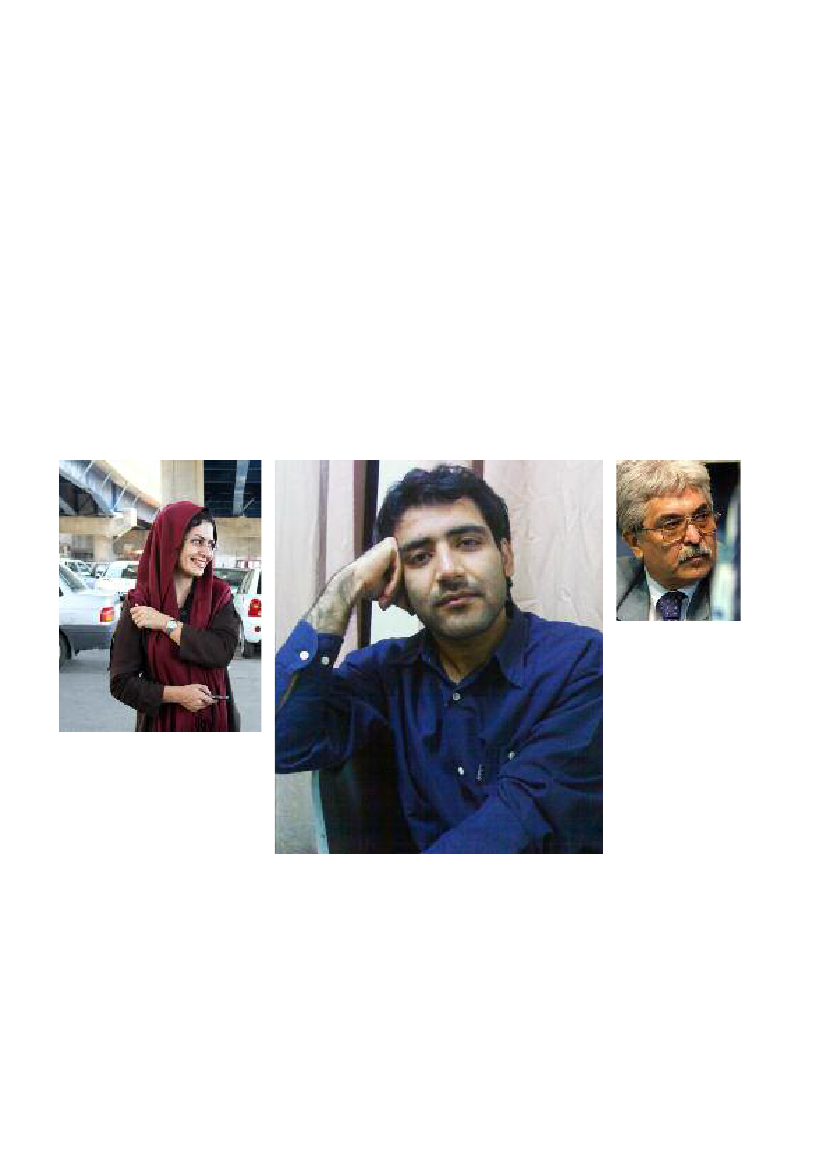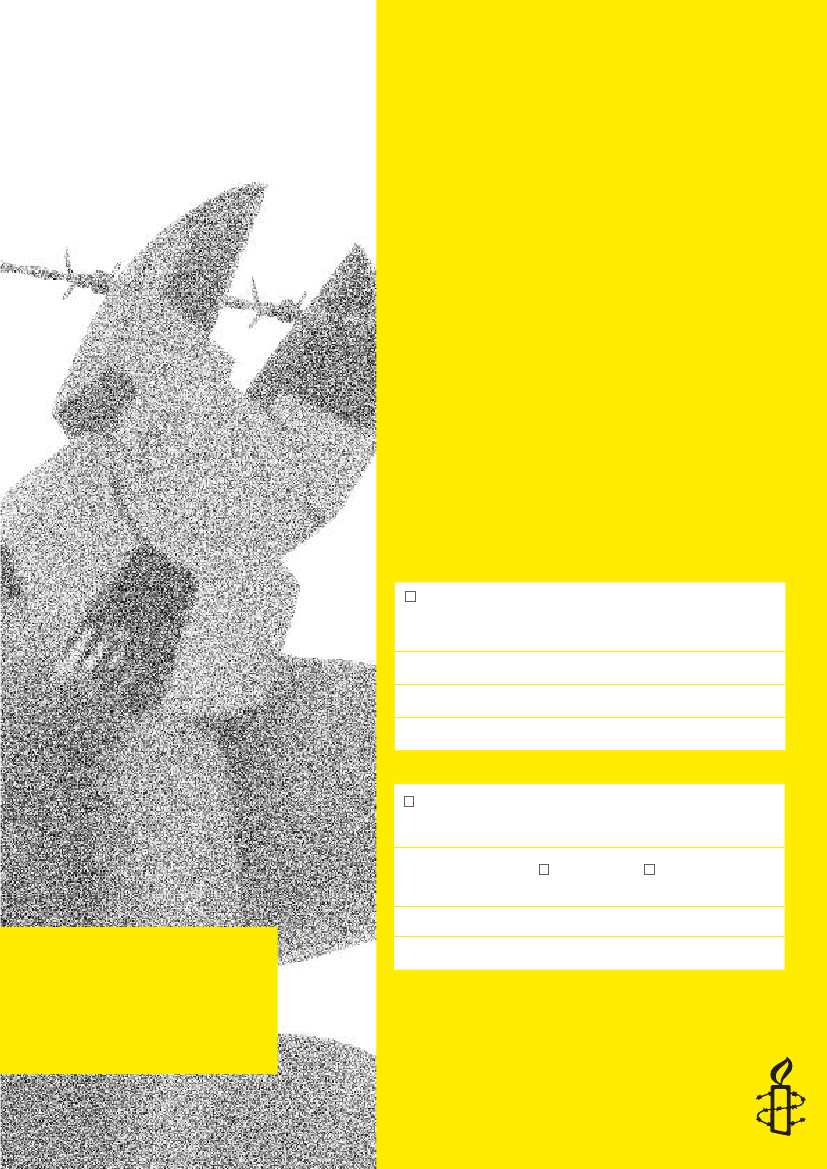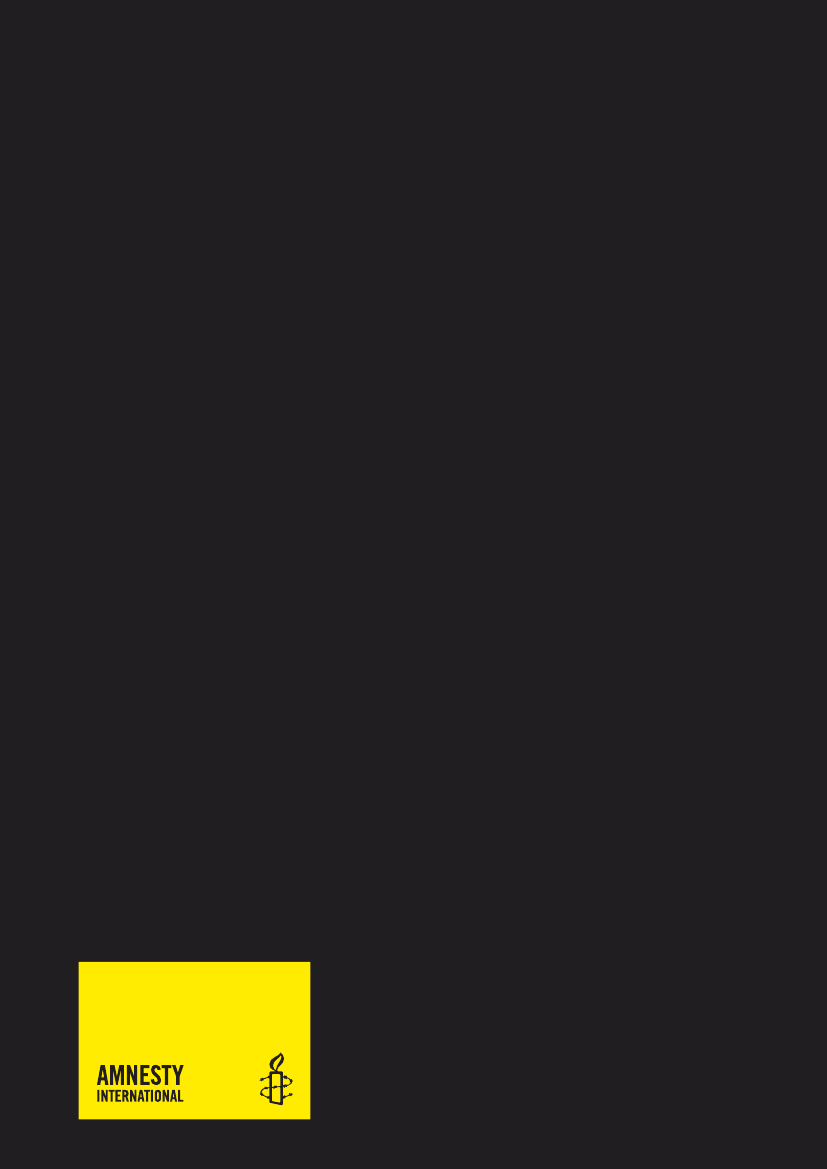Udenrigsudvalget 2011-12
URU Alm.del Bilag 144
Offentligt
‘We areordered tocrush you’
ExpanDIng rEprEssIonoF DIssEnt In Iran
amnesty international is a global movement of more than 3 million supporters,members and activists in more than 150 countries and territories who campaignto end grave abuses of human rights.our vision is for every person to enjoy all the rights enshrined in the universaldeclaration of human rights and other international human rights standards.We are independent of any government, political ideology, economic interest orreligion and are funded mainly by our membership and public donations.
first published in 2012 byamnesty international Ltdpeter Benenson house1 easton streetLondon Wc1x 0dWunited Kingdom� amnesty international 2012index: Mde 13/002/2012 englishoriginal language: englishprinted by amnesty international,international secretariat, united Kingdomall rights reserved. this publication is copyright, but maybe reproduced by any method without fee for advocacy,campaigning and teaching purposes, but not for resale.the copyright holders request that all such use be registeredwith them for impact assessment purposes. for copying inany other circumstances, or for reuse in other publications,or for translation or adaptation, prior written permission mustbe obtained from the publishers, and a fee may be payable.to request permission, or for any other inquiries, pleasecontact [email protected]Cover photo:cars circle a protest in tehran called byopposition leaders in support of the people of egypt andtunisia, 14 february 2011. the protests were violentlyrepressed by security forces, who killed at least two men andarrested hundreds. opposition leaders Mir hossein Mousavi andMehdi Karroubi have been held in unofficial house arrest sincemaking their call.� nima fatemi /demotix
amnesty.org
CONTENTS1. Introduction ............................................................................................................52. Increasing restrictions on freedom of expression and association.................................112.1 Laws and policies restricting freedom of expression...............................................132.2 Restrictions on freedom of association and assembly.............................................163. From arrest to execution: patterns of human rights violations......................................203.1 Torture and other ill-treatment in detention ..........................................................213.2 Poor prison conditions........................................................................................223.3 Unfair trials.......................................................................................................234. Who is being targeted? ...........................................................................................254.1 Human rights organizations and their members.....................................................254.2 Lawyers ............................................................................................................294.3 Women’s rights activists .....................................................................................324.4 Rights activists from minorities ...........................................................................334.5 Filmmakers .......................................................................................................344.6 Bloggers ...........................................................................................................364.7 Journalists ........................................................................................................374.8 Political leaders and activists ..............................................................................394.9 Trade unionists..................................................................................................414.10 Students and academics...................................................................................434.11 Lesbians, gay men and bisexual and transgender people ......................................454.12 Religious and ethnic minorities .........................................................................474.13 People with links to the PMOI ...........................................................................53
5. Beyond Iran’s borders ............................................................................................. 556. Conclusion and recommendations ............................................................................ 57Endnotes ................................................................................................................... 59
“We are ordered to crush you”Expanding repression of dissent in Iran
5
1. INTRODUCTION“His interrogator told him: ‘We are ordered tocrush you, and if you do not co-operate we can doanything we want with you and if you do not writethe interrogation papers, we will force you to eatthem’”.Mahdieh Mohammadi, wife of detained journalist Ahmad Zeidabadi, in an interview with Radio Farda, September 2009.1
On 14 February 2011, thousands of Iranians, encouraged by the mass protests sweepingacross North Africa and the Middle East, defied a government ban by demonstrating inTehran and other cities. The paramilitary Basij militia and other security forces responded byshooting at protesters, firing tear gas at them, and beating them with batons, before arrestingmany of them. In the wake of the toppling of autocratic governments in Tunisia and Egypt,the Iranian authorities were taking no chances.The demonstrations were called by opposition leaders Mehdi Karroubi and Mir HosseinMousavi in solidarity with the people of Tunisia and Egypt and were the first major publicdisplays of opposition since the Iranian authorities viciously crushed vast protests thaterupted and continued in the six months following disputed presidential election results inJune 2009, culminating in demonstrations on the religious festival of Ashoura in December2009.Without apparent irony, Iran's Supreme Leader, Ayatollah Ali Khamenei, celebrated theuprisings in Tunisia and Egypt, saying that it reflected an “Islamic awakening” based onIran's 1979 revolution.2Iran’s leaders also supported Bahrainis demonstrating for theirrights.3Yet in 2009 Iran had ruthlessly repressed Iranians expressing the same desire asTunisians, Egyptians and Bahrainis demonstrating for political rights and social justice. InFebruary 2011, Iran’s response to the mere call for solidarity demonstrations was to placeMehdi Karroubi and Mir Hossein Mousavi under house arrest, blocking opposition websites,and arresting hundreds of political activists and others.Subsequent demonstrations in 2011 in various Iranian cities were forcibly dispersed andfurther measures taken to stifle opposition and silence critics. One year later, Mehdi Karroubiand Mir Hossein Mousavi remain under house arrest, and hundreds of people are believed tobe still in jail simply for daring to express their views. Meanwhile, the security forces,particularly the Basij militia, continue to operate with virtual impunity for their crimes.
Index: MDE 13/002/2012
Amnesty International February 2012
6
“We are ordered to crush you”Expanding repression of dissent in Iran
Since the 2009 crackdown, the authorities have steadily cranked up repression in law andpractice, and tightened their grip on the media. They have stopped public protests usingarticles of Iran’s Penal Code that make demonstrations, public debate and the formation ofgroups and associations deemed a threat to “national security” punishable by long prisonsentences or even death. Lawyers have been jailed along with their clients. Foreign satellitetelevision channels have been jammed. Newspapers have been banned. Dissidents andcritics who write in newspapers or on websites, or speak to the media, risk being chargedwith offences such as “spreading propaganda against the system”, “insulting officials”,“spreading lies with intent to harm state security” or occasionally the “offences” of“corruption on earth” or “enmity against God” which can carry the death penalty.4Iran’s internet community is feeling the chill of a new cyber crimes law, with bloggers andothers being hauled off to prison. The severity of the sentences meted out to bloggersdemonstrates the authorities’ fear of the power of the internet and the free flow ofinformation in and out of the country. At the time of writing in February 2012, ascampaigning for the March parliamentary elections was about to get underway, so too did anew wave of arrests of bloggers, journalists and others, apparently to deter people fromdemonstrating on the anniversary of the 14 February demonstrations, or from highlightingcriticism of the government in the parliamentary elections.Iran’s multiple and often parallel security bodies – including a new cyber police force – cannow scrutinize activists as they use personal computers in the privacy of their homes. Theyhave restricted bandwidth and are developing state-run servers, specific internet protocols(IPs), internet service providers (ISPs) and search-engines. Countless websites, includinginternational and domestic social networking sites are blocked, among them thewww.amnesty.orgwebsite of Amnesty International. A relatively new and shadowy “cyberarmy”, reportedly linked to the Revolutionary Guards – also known as the IranianRevolutionary Guard Corps (IRGC) – has carried out attacks on websites at home and abroad,including the Twitter site and Voice of America.Government restrictions on the internet have also been used to muffle criticism from abroad,a policy backed up by harassment of opponents living in exile and arrests in Iran of relativesof critics or journalists living overseas. New regulations have criminalized contact with any ofmore than 60 listed foreign institutions, media organizations and NGOs.Waves of arrests in recent months have targeted lawyers; students; journalists; politicalactivists and their relatives; members of Iran’s religious and ethnic minorities; filmmakers,workers rights activists and people with international connections, particularly to foreignmedia such as BBC Persian. Dozens have been tortured or jailed, among them prisoners ofconscience. Many others have been harassed or banned from travelling abroad.Repression of human rights defenders has intensified. Many have been harassed or arbitrarilyarrested and imprisoned. Some remain in prison after unfair trials in previous years, many ofthem prisoners of conscience. The Centre for Human Rights Defenders (CHRD), theAssociation for the Rights of Prisoners, Human Rights Activists in Iran (HRA) and theCommittee for Human Rights Reporters (CHRR) have all been closed down or refused legalrecognition. Independent trade unions are still banned and several union members are still injail.
Amnesty International February 2012
Index: MDE 13/002/2012
“We are ordered to crush you”Expanding repression of dissent in Iran
7
Casting a shadow over all those who fall foul of Iran’s unjust justice system is the mountingtoll of people sentenced to death and executed. There were around four times as many publicexecutions in 2011 than in 2010, and hundreds of people are believed to have beensentenced to death in the past year. At least three juvenile offenders were among thoseexecuted in 2011 – the execution of those under the age of 18 at the time of their allegedoffence is strictly prohibited under international law.This report follows two previous Amnesty International reports –Iran: Election Contested,Repression Compounded,issued in December 2009;5andFrom protest to prison: Iran oneyear after the election,issued in June 2010.6It shows that the abuses outlined in thesereports have not only continued but in some cases have become more widespread or moreentrenched in law.For those ending up in Iran’s prisons and detention centres, torture and other ill-treatmentremain routine and widespread. Former detainees – both men and women – as well as someprisoners who write open letters from cells up and down the country recount being beaten,including on the soles of their feet, sometimes while suspended upside down. They have saidthey were burned with cigarettes and hot metal objects. They have described being subjectedto mock execution. They have told of being raped - sometimes with implements - includingby other prisoners, or threatened with rape. They have complained of being denied adequatefood and water, while medical treatment is often delayed or even denied. In many instances,torture and other ill-treatment are used to extract “confessions” under duress, and courtsroutinely ignore complaints of torture and accept as evidence “confessions” extracted usingsuch illegal means.Most trials in Iran are grossly unfair, particularly those before special courts such as theRevolutionary Courts, which are frequently held behind closed doors. Defendants areroutinely denied access to lawyers during pre-trial investigations and often during trial, usinga restrictive interpretation of a note in the Code of Criminal Procedures. Often, trials – beforejudges who appear to be told what sentences to pass by the interrogators – are over in amatter of minutes.Detainees who protest against injustice, torture or appalling prison conditions are sometimestransferred to faraway prisons as punishment, or charged with new offences. Others arereleased but banned from travelling to prevent international networking, or forced to flee infear of further persecution. Detainees’ friends and relatives are arrested or harassed todissuade them from speaking out about their relative’s case or to put pressure on detainees.Iran’s ethnic minority communities, including Ahwazi Arabs, Azerbaijanis, Baluch, Kurds andTurkmen, continue to suffer discrimination in law and in practice. The use of minoritylanguages in state-controlled workplaces and for teaching in schools remains outlawed.Religious minorities face similar discrimination and marginalization. Activists campaigningfor the rights of minorities face threats, arrest and imprisonment, as do activists campaigningagainst the pervasive discrimination that impacts severely on women in law and in practice.As these long-standing patterns of abuse highlight, the recent references by Iran’s leaders toa liberating “Islamic Awakening” during the 1979 revolution are misleading. Not only didtorture continue after the revolution, but so too did repression of political dissent.
Index: MDE 13/002/2012
Amnesty International February 2012
8
“We are ordered to crush you”Expanding repression of dissent in Iran
Members particularly of leftist organizations and Kurdish groups, along with members of thePeople’s Mojahedin Organization of Iran (PMOI), all of which played a major role in therevolution, were arrested in vast numbers after losing the power struggle that followed.Thousands of political prisoners were put to death by the state, many in summary executions,from 1979 onwards, especially in the infamous “prison massacres” of 1988.Vague “Islamic criteria”, enshrined in the new Constitution and subsequent legislation, wereused by the authorities as justification for many violations of human rights. Women’s rightswere one of the first casualties: a strict dress code was imposed, women’s testimony wasdeemed to be worth only half that of a man in court, and women received only half thecompensation for injury or death due to a man, adding to the unequal status accorded towomen in the Civil Code in matters relating to marriage, divorce and child custody. Sexualrelations outside marriage were made punishable by flogging or stoning to death, whilelesbians, gay men, and transgender and bisexual people faced heightened discrimination onaccount of their identity as well as harsh penalties for consensual sexual relations.Discrimination on ethnic and religious grounds also became enshrined in law, policy andpractice. Even “offences” that were not codified in law, such as “apostasy from Islam”, couldbe prosecuted under constitutional and legal provisions requiring judges to use theirknowledge of Islamic law to rule on cases where domestic law was silent.Amnesty International’s reports on Iran since 2009, as well as recent reports issued by UNbodies,7provide compelling evidence of the gravity of the human rights situation in Iran andcontradict the authorities’ frequent denials – including in their dialogue in October 2011with the UN Human Rights Committee – that any human rights are being violated, and theirfrequent assertions that such allegations are politically motivated.The Iranian authorities are doing their utmost to prevent outside scrutiny, including byrefusing to co-operate with UN human rights mechanisms, despite proclaiming that they arerespecting their international obligations. Iran is obstructing nine UN mechanisms that haveoutstanding requests to visit, and no delegation of any of the special UN procedures has beenpermitted to conduct fact-finding visits since 2005. Indeed, the government expresslyrefused to accept recommendations calling for visits made during the Universal PeriodicReview (UPR) process in February 2010.8International human rights organizations arelikewise not permitted to visit – Amnesty International has not been granted access to thecountry to carry out research since shortly after the revolution in 1979.Despite the brutal repression of activists and the relentless attempts to gag bloggers,journalists and dissidents, many people in Iran continue to brave the tentacles of thenumerous security apparatuses – including those now reaching into the virtual world – intheir struggle for their rights and dignity. Their bravery was clear for the world to see in 2009,when hundreds of thousands of people thronged the streets and filled the squares of Tehranand other cities in scenes that proved to be a foretaste of the 2011 so-called “Arab Spring”.Campaigning can bring resultsWhile much of this report focuses on the deteriorating human right situation in Iran, there areoccasional good news stories, including in relation to the releases of individuals on whosebehalf Amnesty International’s members worldwide have campaigned. These releaseshighlight the difference that international attention can make to the lives of individuals and
Amnesty International February 2012
Index: MDE 13/002/2012
“We are ordered to crush you”Expanding repression of dissent in Iran
9
their families and thus the need for the international community to remain attentive to thehuman rights situation in Iran.Brothers Dr Arash and Dr Kamiar Alaei, renowned HIV/AIDS physicians, had been detainedapparently because of their international links, including to US-based civil societyorganizations, and criticism of changes in government policy regarding HIV/AIDS. They werearrested in June 2008 and sentenced in January 2009 to six and three years' imprisonmentrespectively for “cooperating with an enemy government”.Neither had been politically active. Their conviction followed an unfair trial in which secretevidence was produced which they were not allowed to see or challenge, and after havingbeen held for over two months in pre-trial detention without being allowed access to a lawyer.The prosecution is said to have cited the brothers' participation at international HIV/AIDSconferences as part of their scheme to provoke a so-called “velvet revolution” in Iran.Dr Kamiar Alaei was released in 2010 after serving two and a half years of his sentence. Hisbother, Dr Arash Alaei, was released in August 2011, one of some 70 prisoners released onthe occasion of a religious festival. Part of the letter the brothers wrote to AmnestyInternational in November 2011 stated:“As a result of your support, we are now free and we are safe…When we got the messageabout your campaign through our family, it was like getting new blood that warmed our heartsand gave us energy to be strong, to tolerate the situation, and not to become broken…Welearned from our prison experience that if you believe in what you are doing, you mustcontinue your work, whether or not the work is appreciated by your government…and youmust do this until the last moment of your life… Thanks to your efforts, we are rejoicing atbeing reunited and we want to extend your advocacy by being the voice of the voiceless forothers who may face a similar situation to ours. This is at least one way we can pass on thekindness you have shown to us… from the bottom of our hearts; we thank you forcampaigning for our freedom.”Time for actionUrgent action is needed to end the vicious cycle of human rights violations in Iran, a cyclefuelled by the almost guaranteed impunity for perpetrators. The government must takeimmediate steps to establish the rule of law, guarantee the true independence of the justicesystem, and ensure that anyone who does commit human rights violations is held to accountfor their crimes. It must also ensure that the Constitution enshrines protection of humanrights and outlaws discrimination and other breaches of fundamental rights.Among other things, Amnesty International is calling on the Iranian authorities to:release immediately and unconditionally all prisoners of conscience – those detainedsolely for the peaceful exercise of their internationally recognized rights;amend legislation which unduly restricts the rights to freedom of expression, associationand assembly, and to permit open public debate prior to the March 2012 parliamentaryelections;
Index: MDE 13/002/2012
Amnesty International February 2012
10
“We are ordered to crush you”Expanding repression of dissent in Iran
establish an immediate moratorium on executions and work towards the completeabolition of the death penalty.In the absence of independent and impartial bodies to investigate allegations of human rightsviolations and to provide reparations to victims and affected families in accordance withinternational human rights standards, the organization is also calling on the Iranianauthorities to:allow international scrutiny of the human rights situation in Iran, including by allowingvisits by the UN Special Rapporteur on Iran, in addition to other thematic UN humanrights mechanisms which have requested visits, as well as independent internationalhuman rights organizations such as Amnesty International.Amnesty International is also appealing to the international community not to allow tensionsover Iran’s nuclear programme or events in the wider region to distract it from pressing Iranto live up to its human rights obligations as set out in a number of international human rightstreaties to which it is a state party9. In particular, Amnesty International is calling for:the UN Human Rights Council to renew in March 2012 the mandate of the SpecialRapporteur on Iran;the international community to press the Iranian authorities to grant the SpecialRapporteur on Iran access to the country and to fulfil commitments to receive visits byUN human rights mechanisms that have asked to visit Iran.
Amnesty International February 2012
Index: MDE 13/002/2012
“We are ordered to crush you”Expanding repression of dissent in Iran
11
2. INCREASING RESTRICTIONS ONFREEDOM OF EXPRESSION ANDASSOCIATIONLegislation passed since the 1979 revolution has imposed undue restrictions on the peacefulexercise of the rights to freedom of expression, assembly and association – particularly the1981 Press Law, the Penal Code, the Labour Code, and the Law on Political Parties,Societies, Political and Guild Associations, and Islamic or Recognized Minority ReligiousAssociations (Political Parties Law).Amnesty International has for years been documenting violations of human rights relating tothese laws, which have also been criticised by other international human rights monitors suchas the UN Human Rights Committee10. The UN Special Rapporteur on the promotion andprotection of the right to freedom of opinion and expression has also highlighted his concernat the numerous provisions in the Penal Code and the Press Law which restrict freedom ofopinion and expression11.In a report published in December 2001, Amnesty International presented and illustrated indetail its concerns about laws which curtail the right to freedom of expression12. Since then,the violations detailed in that report have continued unabated. The Iranian authoritiescontinue to ban independent television and radio stations and the use of satellite dishes, onoccasion jamming satellite broadcasts from abroad. They have banned books, and restrictedthe paper supply for certain publishers which makes it difficult for them to publish theirbooks. Publications have been banned, mostly temporarily by the Press Supervisory Board,pending decisions by the courts. Some are said to have been closed under the 1960Preventive Restraint Law13. Newspapers are provided with regulations over what they can andcannot publish on certain issues, and journalists and commentators have been targeted forarrest. Countless other Iranians have been harassed and persecuted for expressing theirviews, whether in print or orally.However, the Iranian authorities have been particularly concerned at the rise of the internetover the last decade or more, and the potential it has for people to freely express their views.In common with other repressive governments, the Iranian authorities have gradually beenputting in place an array of legal and other measures intended to limit access to the internetfrom Iran, and to penalise people writing on websites or personal blogs. Additionally, thepost-election unrest of 2009 showed the world exactly how powerful a tool social media suchas Facebook and Twitter could be both in organizing protests and in reporting on humanrights violations committed when protests are repressed. The authorities have taken furthermeasures since then to prevent people in Iran using such tools to organize dissent.
Index: MDE 13/002/2012
Amnesty International February 2012
12
“We are ordered to crush you”Expanding repression of dissent in Iran
MEASURES TAKEN OR IN PROGRESS SINCE 2001 TO FURTHER RESTRICTFREEDOM OF EXPRESSION, ASSOCIATION AND ASSEMBLY IN IRAN2001: Order by Supreme Leader on“Overallpolicies on computer-based information-providing networks”2001: Supreme Council of the Cultural Revolution “Rules and Regulations for Computer InformationProviders” giving full control of the internet to the government and restricting content of internet publications2002: “Decree on the Constitution of the Committee in charge of Determination of Unauthorized Websites”2005: Law on Promoting the Culture of Chastity and ModestyMay 2006: Government-owned Information Technology Company (ITC) announces that Iran’s nationwidefiltering database, which can be used to block access to Internet sites, would shortly begin workOctober 2006: Regulations by Radio-telecommunications regulator including restrictions on online speeds to128 kilobits per second and banning Internet service providers from offering fast broadband packages2007: Requirement by Ministry of Culture and Islamic Guidance for all website and blog owners to registerwith the authorities2008: Law on Audio-Visual Crimes, which extends the scope of the death penalty for some pornography-relatedactivities2009: Law on Cyber Crimes (also called Computer Crimes Law)2009: Establishment of “Cyber Army” believed to be linked to Revolutionary GuardsJanuary 2010: Ban on contact with over 60 foreign media and think tanks.July 2010: Creation of High Council of Cinema, a body which controls all aspects of film production, includingthe provision of fundingJanuary 2011: Inauguration of “Cyber Police Force” in Tehran. Force fully operational by January 2012
Bills which would restrict the right to exercise the fundamental freedoms of expression, assemblyand association if ratified as they stand:Bill on the Establishment and Supervision of Non-Governmental Organizations (NGOs)Bill on the Formation of Political PartiesBill amending the Penal CodeMuch of the legal framework restricting freedom of expression, association and assemblyrelates to measures in the Penal Code. The first four books of the Penal Code have beenunder revision in parliament since 2007. In January 2012, the Council of Guardians, whichvets legislation for conformity to the Constitution and to Islamic Law, said no provisions in
Amnesty International February 2012
Index: MDE 13/002/2012
“We are ordered to crush you”Expanding repression of dissent in Iran
13
the draft were in violation of Islamic Law, paving the way for the Bill to be sent to thePresident for ratification. An earlier version of the Bill seen by Amnesty Internationalmaintains many existing provisions which are incompatible with Iran’s obligations underinternational human rights instruments. In particular, it continues to provide for flogging andamputation as a punishment; it continues to penalise consensual sexual relations outsidemarriage, whether same sex or heterosexual; it continues to allow judges to pass judgment onthe basis of their “knowledge”, which could be their subjective opinion; and discriminatesagainst women and religious minorities in a number of areas. It also appears to still providefor the execution of juvenile offenders at the discretion of the judge and would permit the useof stoning as a penalty for adultery while married by allowing judges to cite Islamic Law.
2.1 LAWS AND POLICIES RESTRICTING FREEDOM OF EXPRESSIONNew measures taken to limit the right of everyone in Iran to exercise their right of expressionare rooted in long-standing policy and practice. Iran’s Penal Code, Press Code and otherregulations have provided the basis for the decades-long censorship of newspaper articles;the banning of newspapers; and the vetting of factual and fictional literature, television, playsand film and forms of pictorial art. The Press Code was amended in April 2009 to cover thematerial published on the internet14but other legal measures set out below impose even moreintrusive restrictions.Individuals who write in newspapers or websites or who give interviews to the media may becharged under the Press Code and Penal Code with “offences” such as “spreadingpropaganda against the system”, “insulting officials”, “spreading lies with intent to harmstate security” or occasionally “corruption on earth” or “enmity against God”.Iran’s various and often parallel security bodies can now scrutinize activists as they usepersonal computers in the privacy of their homes.In recent years, a shadowy "Cyber Army", reportedly linked to the Revolutionary Guards, hascarried out attacks on websites at home and abroad, such as against the sites of Twitter andVoice of America. In January 2012, the Police Chief Brigadier General Esma’il Ahmadi-Moghaddam, announced that the Cyber Police, established a year before and intended “toconfront Internet crimes and counter social networks that spread ‘espionage and riots’”, wasnow operational throughout the country.15In August 2011, the Minister of Culture and Islamic Guidance said that the Cabinet waspreparing a Comprehensive Public Media Bill which would bring SMS messages and CDs, aswell as weblogs or other websites, under the sole remit of the Press law16. In January 2012,the Cyber Police issued new regulations requiring owners of internet cafés to install CCTVcameras and to register the identity and contact details of users before allowing them to usetheir computers. Such information must be stored for six months, and provides yet one moreway for security forces to monitor the activities of activists.17Since 2001, the Iranian authorities have gradually increased measures to control Iranians'access to the outside world via electronic means and media. They have restricted bandwidthand are developing state-run servers, specific internet protocols (IPs), internet serviceproviders (ISPs) and search engines.
Index: MDE 13/002/2012
Amnesty International February 2012
14
“We are ordered to crush you”Expanding repression of dissent in Iran
Countless websites, including international and domestic social networking sites, areblocked, as is thewww.amnesty.orgwebsite of Amnesty International. Many Iranians useproxy hosts and filter-busting programmes to access sites abroad, but increasingly even theseare blocked. Providing such software or training in how to use it is a criminal offence.Iranian officials have stated that they intend to establish a state-wide intranet that conformsto “Islamic principles”, which will run in parallel to the World Wide Web and will “replace itin Muslim countries in the region”18. It appears that by this measure, they may be intendingin the future to shut off the access of most people in Iran to the global internet.Commercial ISPs in Iran that offer internet connectivity to the public are required to connectvia the state-controlled Telecommunication Company of Iran (TCI) which facilitates statecontrol19. The authorities also require ISPs to record access to sites by users20. Recently-issued instructions require internet cafés to keep detailed data regarding users’ identities andthe sites they visit for six months21.Moreover, the authorities jam foreign satellite transmissions into the country and access toinformation is also restricted by the confiscation of satellite dishes, which are illegal in Iran.The security forces closely monitor fixed line and mobile telephone services and people wholive in Iran routinely assume that their line is tapped and adapt their speech accordingly.SMS services have been reported to have been occasionally blocked, particularly during timesand locations where mass demonstrations have been expected.The 2008 Law on Audio-Visual Crimes, amending an earlier version, provides for flogging andthe death penalty for the producers of “obscene” products; producers of such products“intended for sexual abuse”; and the principal agents in the production of those products, onthe grounds that they are “corrupt on earth”. Under Article 4, persons who use such productsto blackmail others “to fornicate with them” will be charged with rape – for which there is amandatory death sentence – under the Penal Code provisions criminalizing adultery andfornication.More restrictions on freedom of expression were imposed under the 2009 Law on CyberCrimes which replicated many of the restrictions placed on freedom of expression in thePenal Code and Press Law, making it clear that these laws do apply to internet and electronicpublications.Ashkan Delanvar,a student banned from further education for his political views, was tried inthe first case recorded by Amnesty International where an individual was sentenced to prisonunder the Law on Cyber Crimes for providing anti-filter software and training in how to use it.He was sentenced to 10 months imprisonment after conviction of these charges, although hissentence was later increased on appeal22. When summoned to start serving the sentenceAshkan Delanvar fled Iran, fearing for his safety. He is in a European country waiting – at thetime of writing – for his asylum application to be determined.The right to education has long been restricted, with students banned from education onaccount of their political activities or faith. After the disputed presidential election, academicfreedom came under renewed attack when the authorities launched a purge of universities,
Amnesty International February 2012
Index: MDE 13/002/2012
“We are ordered to crush you”Expanding repression of dissent in Iran
15
particularly in relation to the teaching of social sciences. Reductions in social sciencecourses, such as sociology and politics, including courses on human rights also followed aspeech in August 2009, in which the Supreme Leader said that “instruction in these humansciences in the universities will lead to reservations and doubts in religious principles andbeliefs”23.In addition to the new restrictions on freedom of expression outlined above, when appearingin public women and men in Iran continue to have to adhere to a mandatory dress code thatis enforced in law. The authorities have stepped up efforts in recent years to enforce the2005 Law on Promoting the Culture of Chastity and Modesty, which has led someuniversities to threaten students who do not comply with the dress code with a ban oncompleting their studies. The dress code, however, has never been fully defined, and whilemany women wear traditional forms of dress, others have also chosen to interpret this code inother ways. This leaves them at risk of harassment from police or other security forces,including the Basij militia, particularly during summer crackdowns, which have increasedsince 2005.In February 2012, it was reported that all women civil servants would be obliged to wear aspecific uniform said to conform to “Islamic dress” from the start of the new Iranian year,which begins on 21 March 2012. According to reports in Iranian news agencies, the policywould be applied first in Tehran, but then would be extended to other parts of the country24.The dress code appears also to be enforced for political reasons as another tool for silencingperceived dissenters or critics. Defence lawyerNasrin Sotoudehwas tried in February 2011,and subsequently fined 500,000 rials25, for not adhering to the dress code in a video shemade to accept a human rights award in Italy in 2008 in which she did not cover her hair.The Iranian authorities had banned her from leaving the country to accept the award inperson. The video was made in her house and was not aired by her in Iran, but was posted onthe internet.
INTERNATIONAL STANDARDS GOVERNING FREEDOM OFEXPRESSIONFreedom of expression is guaranteed by Article 19 of the International Covenant on Civil andPolitical Rights (ICCPR) which states that “everyone shall have the right to hold opinions withoutinterference” and that “everyone shall have the right to freedom of expression; this right shallinclude freedom to seek, receive and impart information and ideas of all kinds, regardless offrontiers, either orally, in writing or in print, in the form of art, or through any other media of hischoice”. Freedom of expression may only be restricted for respect of the rights or reputations ofothers, or for the protection of national security or of public order or of public health or morals andmust conform to strict tests of necessity and proportionality.In its General Comment No. 34 on Article 19, issued in September 2011, the UN Human Rights Committee,which is the authoritative body overseeing interpretation of the ICCPR, made it clear that freedom ofexpression applies to audiovisual material and the internet as well as to more traditional forms ofcommunication, and includes:“expression and receipt of communications of every form of idea and opinion capable of transmission to others… political discourse, commentary on one’s own and on public affairs, canvassing, discussion of human
Index: MDE 13/002/2012
Amnesty International February 2012
16
“We are ordered to crush you”Expanding repression of dissent in Iran
rights, journalism, cultural and artistic expression, teaching, and religious discourse”.The Committee also clarified that lawful restrictions on freedom of expression may never be invoked as “ajustification for the muzzling of any advocacy of multi-party democracy, democratic tenets and human rights”.The Committee, which further highlighted the need for a plurality of media which should not be solely understate control, also warned that “treason” or “national security laws” may not be invoked “ to suppress orwithhold from the public information of legitimate public interest that does not harm national security or toprosecute journalists, researchers, environmental activists, human rights defenders, or others, for havingdisseminated such information” and stressed that “all public figures, including those exercising the highestpolitical authority such as heads of state and government, are legitimately subject to criticism and politicalopposition”.Regarding the internet, the Committee stated that generic bans on the operation of certain sites and systemsare not “permissible restrictions” and that no form of media should be shut down or prevented frompublishing material solely on the basis that it may be critical of the government or the political social systemespoused by the government.The Committee also found that journalists and others (such as persons who wish to investigate human rightsviolations or attend human rights-related meetings) should normally be allowed to leave, enter or travel withina country, including to “locations where there are allegations of human rights abuses”.The Special Rapporteur on the promotion and protection of the right to freedom of opinion and expression hasalso stated that expression on the internet:“should never be subject to restrictions [on] discussion of government policies and political debate; reportingon human rights, government activities and corruption in government; engaging in election campaigns,peaceful demonstrations or political activities, including for peace or democracy; and expression of opinionand dissent, religion or belief, including by persons belonging to minorities or vulnerable groups.”26In addition to the relationship of academic freedom to the right to freedom of opinion and expression, theCommittee on Economic, Social and Cultural Rights, the authoritative body which oversees interpretation ofthe International Covenant on Economic, Social and Cultural Rights (ICESCR), has stated in its GeneralComment 13 that the right to education includes academic freedom of staff and students, noting that “staffand students in higher education are especially vulnerable to political and other pressures which undermineacademic freedom”.27
2.2 RESTRICTIONS ON FREEDOM OF ASSOCIATION AND ASSEMBLYAs part of its efforts to marginalise and isolate Iranians, in January 2010, the authorities alsoeffectively criminalized contact with over 60 foreign institutions, media organizations andNGOs. Numerous human rights defenders were detained, mostly briefly, in the months thatfollowed.In October 2011, Police Chief Esma’il Ahmadi-Moghaddam is reported to have said that co-operating with the BBC or the Voice of America was tantamount to working with the enemyand would be treated “seriously”. In January 2012, he said that Google was not a search
Amnesty International February 2012
Index: MDE 13/002/2012
“We are ordered to crush you”Expanding repression of dissent in Iran
17
engine, but an “espionage tool”.28An increasing number of arrests appear to be motivated byindividuals’ contact with the international media.Such measures exemplify how the authorities are continuing their attempts to restrict humanrights organizations, either by repeatedly harassing and arresting members, or by forciblyclosing them down. The Centre for Human Rights Defenders (CHRD), the Association for theRights of Prisoners, Human Rights Activists in Iran (HRA) and the Committee for HumanRights Reporters (CHRR) – all previously closed down or never recognised despite repeatedattempts to gain legal registration – remain shut. Other professional organizations which havecriticised government actions and human rights violations against their members, such as theAssociation of Iranian Journalists and the House of Cinema (a professional association forfilm industry workers) have also been closed down by the authorities.Numerous human rights defenders have already found themselves facing charges such as“forming or membership of a group whose intent is to harm state security”. Contact withindividuals or institutions abroad could bring charges of “espionage”. If the “offence” isdeemed to amount to “enmity against God", the authorities could sentence an individual todeath.
FREEDOM OF ASSOCIATION AND ASSEMBLY IN IRANFreedom of assembly and association are guaranteed under Articles 21 and 22 of the ICCPRrespectively, and both rights are subject only to similar restrictions as may limit freedom ofexpression.Freedom of expression is provided for under Article 26 of the Iranian Constitution, but is limited by a vaguelyworded clause which stipulates that associations must not violate the criteria of Islam or the basis of theIslamic Republic. As a result, restrictions are placed on the activities of associations, under Article 16 of theLaw on Political Parties, Societies, Political and Guild Associations, and Islamic or Recognized MinorityReligious Associations.Restrictions on freedom of association are also placed on independent trade unions, under the Labour Law.Membership of the Bar Association, and approval for candidacy for elections to its board, is also subject todiscriminatory vetting procedures which limit its independence by subjecting membership to approval by thejudiciary29. The Bar Association has also been undermined by the introduction of so-called “legal advisers”which are subject to licensing by the Judiciary and are therefore not independent.30Freedom of assembly is provided for under Article 27 of the Iranian Constitution, which stipulates that“[p]ublic gatherings and marches may be freely held, provided arms are not carried” but once again is limitedby a vaguely worded clause that they must not be “detrimental to the fundamental principles of Islam”.Article 10 of the Law on Political Parties, Societies, Political and Guild Associations, and Islamic or RecognizedMinority Religious Associations creates a commission that not only approves licences for organizations, butalso verifies that demonstrations requested by licensed organizations meet the criteria of Article 27 of theConstitution.In its concluding observations of November 2011, the UN Human Rights Committee expressed concern at wideranging restrictions on the rights to freedom of assembly and association31and recommended that the Iranianauthorities should ensure that these rights are guaranteed to all individuals without discrimination and
Index: MDE 13/002/2012
Amnesty International February 2012
18
“We are ordered to crush you”Expanding repression of dissent in Iran
release immediately and unconditionally anyone held solely for the peaceful exercise of this right, includingstudents, teachers, human rights defenders (including women’s rights activists), lawyers and trade unionists.The Committee also said that the authorities in Iran should ensure the prompt, effective and impartialinvestigation of threats, harassment, and assault on members of these groups, and, when appropriate,prosecute perpetrators of such acts.Regrettably, the Iranian authorities have not taken the opportunity presented by the revisionof the first four books of the Penal Code to remove undue restrictions on freedom ofassociation. In January 2012, the Council of Guardians announced that it had found nothingincompatible with Islamic Law in the draft presented by parliament, thereby paving the wayfor its imminent passage into law after it is signed by the President. The new code continuesto provide penalties for vaguely worded concepts such as “enmity against God”. This articlecan be used to impose the death penalty for “enmity against God” on anyone convictedunder Article 498 (in Book 5 of the Penal Code, which was not revised) of “forming a group,branch or association whose aim is to harm national security”. Article 498 specifies thatsuch a person should be sentenced to between two to 10 years’ imprisonment “if they are notconsidered to be an enemy of God”.Likewise, a draft reform of the Labour Code, not passed by parliament at the time of writing,continued to undermine freedom of association by prohibiting the creation of independenttrade unions. The draft also continued to give governmental security and intelligence bodiescontrol over the approval of candidates permitted to stand for election to the leadershipcommittees of workers’ bodies.The numbers of human rights defenders facing such charges would be likely to increase if adraft law, the Bill on the Establishment and Supervision of NGOs is passed. If passed, theBill would replace existing regulations with a regulatory framework that would effectively wipeout all independent NGOs in the country by creating the Supreme Committee SupervisingNGO Activities, an unaccountable body. Chaired by the Interior Ministry, it will includerepresentatives from the Intelligence Ministry, the police, the volunteer Basij militia, theRevolutionary Guards – all of which have in the past acted to curtail freedom of expression,association and assembly – and the Foreign Ministry, among others. It will have only onemember representing NGOs’ interests. The Committee will be empowered to issue and revokeregistration permits for all NGOs and have ultimate authority over their boards of directors. Ifthis Bill is passed, members of NGOs that fail to secure registration permits or who have theirpermits revoked, will be even more at risk of prosecution. At the time of writing, the Bill hadnot yet been passed. The UN Human Rights Committee, which reviews states’ compliancewith the ICCPR, has said that the Bill should be withdrawn.32The Council of Guardians reviewed the draft legislation in October 2011. It rejected some ofthe Bill’s articles which the Council of Guardians found in contravention to the Constitutionand Islamic Law, and returned the Bill to parliament. Parliamentarians have reportedlyamended the relevant articles and the draft is, at the time of writing, under consideration bythe Expediency Council33. Once resolved, the legislation can be signed into law by thePresident.
Amnesty International February 2012
Index: MDE 13/002/2012
“We are ordered to crush you”Expanding repression of dissent in Iran
19
Political parties, particularly those associated with opposition leaders Mehdi Karroubi and MirHossein Mousavi, have been closed down by court order since 2009, joining other politicalparties banned since 1979.Further restrictions on the formation and activities of political parties appear to be underway.A third parliamentarians’ Bill, the draft Law on Formation of Political Parties, has beenintroduced by the Article 10 Commission, established under the current Political PartiesLaw.34In addition to failing to remove discriminatory provisions over who can form or join apolitical party35, the Bill also envisages supervision and evaluation of a political party by theArticle 10 Commission in the period between registering for a licence to operate and thelicence being granted. It is feared that this could pose an undue restriction – in breach ofIran’s own Constitution – on the right to freedom of association, as the Article 10Commission would be empowered to refuse a licence to any party whose activities it did notapprove of in the post-registration period. Additionally, “fronts and associations” formed ofmore than one party would require separate registration, creating an extra hurdle for politicalparticipation.36Additionally, 2011 saw proposals by the authorities to implement gender segregation ininstitutions of higher education, most of which have run mixed gender courses in recentyears. In August 2011, it was reported that 20 universities would be restricting certaincourses – including sociology, history, literature, mining, arts education and mathematics –to one gender of students only in the coming academic year.37These measures, as well as therequirement for women students to study in or near their hometown appear to be reducingthe percentage of women entering university (from over 60 per cent in 2007 to fewer than 50per cent in 2010). Later that August, the Ministry of Education issued a directive banningmixed-gender classes in pre-schools in most cases.38Schools in Iran are already gender-segregated.Freedom of assembly too continues to be very limited except in cases where the authoritieswish demonstrations to occur. For permits to be issued by the Interior Ministry, thedemonstration must be deemed by the Article 10 Commission of the Political Parties Law notto “violate the fundamental principles of Islam”. The Bill on Political Parties retains thisrequirement for advance vetting of demonstrations by the Article 10 Commission. The InteriorMinistry also has the power to refuse a permit for other reasons. It is also not clear whetherpermits for demonstrations can be sought by private individuals, or only by political parties,NGOs or other registered organizations.39In the current situation, there is a de facto refusalby the authorities to authorise demonstrations perceived as expressing dissent. The fewdemonstrations that have taken place since 2009 have therefore largely been unauthorised.Policing methods against demonstrators who have not obtained a permit are brutal and oftenresort to excessive use of force, which can sometimes be lethal.
Index: MDE 13/002/2012
Amnesty International February 2012
20
“We are ordered to crush you”Expanding repression of dissent in Iran
3. FROM ARREST TO EXECUTION:PATTERNS OF HUMAN RIGHTSVIOLATIONSIran’s domestic legal framework governing pre-trial detention, although flawed, shouldprovide some protection against arbitrary arrest and detention, which are prohibited underArticle 9 and 14 of the ICCPR. Despite this, and the country’s international obligations,thousands of people have been arbitrarily arrested since 2009, many of whom have beensubjected to other serious human rights violations, including incommunicado detention inconditions amounting to enforced disappearance and torture or other ill-treatment.
LEGAL PROVISIONS GOVERNING ARREST AND DETENTIONThe Iranian Constitution, Code of Criminal Procedures and the 2004 Law on Respect for Legitimate Freedomsand Safeguarding Citizens' Rights all specify that arrests must be made on the basis of a warrant which mustcontain the reason for the summons and be read to the accused40unless someone is caught in the act ofcommitting a crime. Iran’s Code of Criminal Procedure41empowers the police and the Basij and RevolutionaryGuards to make arrests. Iran’s Supreme National Security Council may also empower other bodies or agenciesto do so as well, although the basis and mechanism is not clear in the law and there appears to be norequirement for the authorities to inform the public as to what bodies have been granted arresting anddetaining powers. For example, Ministry of Intelligence personnel do not appear in law to have the power ofarrest, but under these provisions they may well have been given it.The Iranian Constitution states that “charges with the reasons for accusation must, without delay, becommunicated and explained to the accused in writing, and a provisional dossier must be forwarded to thecompetent judicial authorities within a maximum of 24 hours”42. The Code of Criminal Procedure, whichreiterates that 24-hour limit43, states that a judge may issue temporary detention orders for a maximum oftwo months, thereby allowing authorities to hold detainees without charge beyond the 24-hour period44. TheCode gives the accused the right to appeal against the detention order within 10 days, and although it statesthat the detainee’s case must be resolved within a month, it also allows the judge to renew the temporarydetention order45. The Code sets no limits on how many times this order may be renewed.The Code of Criminal Procedures says that detainees can petition a judge for release on bail46. It requires thatthe bail or surety is appropriate and proportionate to the crime and punishment in question, as well as thestatus of the accused and his background47.Despite this, bail is often set extremely and disproportionately high, which may force the family of the detaineeto surrender more than one property deed. Many of those arrested since the June 2009 election have stood bailof amounts equivalent to several hundred thousand US dollars. In some cases, detainees and their familiesare simply unable to meet such high demands, and the individual continues to languish in detention.The Code of Criminal Procedures is also currently under review in Iran. Although someprovisions of the current Code appear to provide some degree of protection from arbitrary
Amnesty International February 2012
Index: MDE 13/002/2012
“We are ordered to crush you”Expanding repression of dissent in Iran
21
arrest and torture or other ill-treatment, in practice, the restrictive interpretation of certainnotes are for example used to deny detainees access to a lawyer from the time of arrest untilsuch time as the interrogation has been finished. The draft revised code also does not appearto fully clarify which agencies have the power of arrest in Iran.The lack of transparency over which agencies have the right to carry out arrests facilitatesabuses and impunity. Under the law, detainees must be held in facilities controlled by thePrisons Organization. However, in practice, many of those arrested, particularly thosesuspected of opposing the government, are arrested without a warrant or on the basis of ageneral arrest warrant that does not specify them by name or fully explain the reason forarrest, and are taken to detention facilities run by intelligence bodies such as the Ministry ofIntelligence or the Revolutionary Guards Intelligence branch. It is common for detainees tobe held incommunicado for days, weeks or even months after arrest with no chance tounderstand or challenge the basis for their detention, in conditions which can amount toenforced disappearance. Detainees’ families are often unable to obtain any informationconcerning their whereabouts, and are shuffled from pillar to post as they try to find out iftheir relatives are even in the hands of the authorities.
3.1 TORTURE AND OTHER ILL-TREATMENT IN DETENTIONThe Iranian legal framework provides limited protection from torture. Article 38 of theConstitution prohibits torture if it is “for the purpose of extracting confession or acquiringinformation”, while Article 39 bans all affronts to the dignity of detained or imprisonedpersons. Article 6 of the 2004 Law on Respect for Legitimate Freedoms and SafeguardingCitizens' Rights further provides that while a prisoner is being detained, interrogated orinvestigated, law enforcement officers must not harm an accused person, for example, byblindfolding them or tying their limbs.However, in reality torture is routinely and widely used. The Iranian authorities have admittedthat in order to obtain information or confessions, law enforcement officials are, in specialcases, permitted to use interviewing and interrogation techniques which may cause physicalor mental pain or suffering when ordered to do so by a superior law enforcement official orother government official.48In many instances, torture and other ill-treatment are used to extract “confessions” underduress. Methods frequently reported by detainees include severe beatings; electric shocks;confinement in tiny spaces; hanging upside down by the feet for long periods and rape orthreats of rape of both men and women, including with implements. Detainees are alsofrequently subject to death threats, including mock executions; threats to arrest and torturefamily members; actual arrest of family members; deprivation of light or constant exposure tolight and deprivation of food and water. Accusations of torture are routinely ignored in courtand not investigated, while “confessions” extracted under duress are accepted as evidence.In August 2011, the Head of the Prisons Organization denied that torture occurred in prisonsunder his jurisdiction, but stated that detainees held for interrogation were tortured. He toldthe semi-official Mehr News Agency:"Torture is practised in prisons that are run by the police and where prisoners arecontinuously being interrogated. But Iranian prisons are not run by the police or the judge.
Index: MDE 13/002/2012
Amnesty International February 2012
22
“We are ordered to crush you”Expanding repression of dissent in Iran
They are instead run independently as subsidiaries of the Prisons Organization, under thesupervision of the judiciary."49
3.2 POOR PRISON CONDITIONSHundreds of prisoners of conscience and political prisoners are held in overcrowded prisonsin poor conditions leading to health problems and are then denied adequate medical care. InMarch 2011, the Head of the Prisons Organization said that the prison population hadreached more than 220,000. He said:“During the [18-month] period since I took over as director of the organization, 55,000people have been added to the overall number of prisoners while not even as little as 55meters of space has been added to the current system.”50In late June 2011, Younes Mousavi, a member of the parliamentary Judicial Committeereportedly stated in parliament that overcrowding in some prisons was so severe thatprisoners were sleeping on the stairs. He also reportedly said that the budget of the PrisonsOrganization was insufficient to clothe and feed prisoners, so that in some prisons prisonersshared a blanket, that some prison buildings were no longer fit for purpose and that thehealth system of some prisons was so poor that some prisoners could experience “unsuitablemedical conditions” while in prison.51Some family members of a group of around 600 women, including some political prisoners,transferred in 2011 to Gharchak (or Qarchak) prison, near Tehran wrote a letter to the Headof the Islamic Human Rights Commission in May 2011. The letter described the conditionsin which they were held and alleged that guards had beaten prisoners who had complained:“…Prison authorities at Gharchak refuse to provide prisoners with food and water andaccording to the prisoners there are no regular meal times and prison authorities serve food attheir convenience. The 600 female prisoners have access to only four bathrooms and thesame bathrooms must be used by everyone for taking showers, washing their clothes andwashing other items such as dishes. Furthermore, the water supply is cut off during most ofthe day.”52
“There are no laws in our country and there is no one we can go to in order to report thislawlessness. How is it that in a prison that is operated under the oversight of Prisons Organization,any member of the IRGC who wishes can come and beat up my son? I am truly sorry for a countrythat only claims to be carrying out justice. There are no laws, there are no authorities who wouldreview the complaints, and human rights organizations just talk. None of this helps the politicalprisoners,”Ahmad Ronaghi Maleki, father of imprisoned blogger Hossein Ronaghi Maleki, August 201153
Hossein Ronaghi Maleki,a blogger, was held in solitary confinement for 376 days after hisarrest, during which he was tortured or otherwise ill-treated. He was sentenced to 15 years’imprisonment after an unfair trial and went on hunger strike for about a week in December2011. In failing health after developing kidney complications since his arrest, he hasundergone at least four operations. He said in an open letter to the Tehran Prosecutor AbbasJa’fari Dowlatabadi54that he was beginning his hunger strike in protest at his unfair
Amnesty International February 2012
Index: MDE 13/002/2012
“We are ordered to crush you”Expanding repression of dissent in Iran
23
sentence, the refusal of the prison authorities to grant him a medical furlough, and the“psychological and physical pressures” he had been subjected to since his arrest.55Hossein Ronaghi Maleki was beaten unconscious by a Revolutionary Guards officer in prisonin August 2011 after a previous letter to the Tehran Prosecutor. He was taken to hospital butreturned to prison after he regained consciousness.Many other detainees referred to in the sections below have also complained of poor prisonconditions and denial of medical treatment.
3.3 UNFAIR TRIALS
“It appears that the judges presiding over the political cases in the revolutionary courts are in effectmercenaries whose job is to execute security policies of the regime. Often these judges do not evenpossess proper knowledge or expertise regarding the content of the case they are presiding over,have not read the case file, and basically do not know much about the accused at all. In these courtsessions, which are barely a few minutes long, the judges merely ask simple and formal questions(limited to the name and address of the accused, the charges and such), and do not probe touncover the truth or social motivations of the accused.”Behnam Daraeizadeh, an Iranian defence lawyer56
The majority of trials in Iran are grossly unfair, particularly those before Revolutionary Courtsand other special courts such as the Special Court for the Clergy (SCC).57RevolutionaryCourts are used to prosecute national security offences and offences under the Anti-NarcoticsLaw, whereas the SCC tries cases in which Muslim clerics or their followers are involved.Trials by Revolutionary Courts are frequently held behind closed doors. Defendants areroutinely denied access to lawyers in the preliminary pre-trial investigation stage and oftenduring the trial itself under a restrictive interpretation of a note to Article 128 of the Code ofCriminal Procedures. Dozens of defendants have told Amnesty International how they weretold that if they did not have a lawyer, ‘it would be better’ for them. Trials are often onlyminutes long and prisoners sometimes claim that the judges receive instructions from theintelligence service which has overseen their interrogation on the verdict and sentence.Behnam Daraeizadeh, a lawyer who has defended clients charged with political offences, isof the same opinion. He has stated that in political cases:“Agents of the Ministry of Intelligence prepare a report called ‘final circulation’. In this reportor ‘circulation’, the manner of formation of the case and selected confessions of the accusedare noted, while the judge or court magistrate of the case are given the options of designatedpunishments, and even recommendations regarding increasing or decreasing the level ofpunishment.”58While some prisoners of conscience and political prisoners receive lengthy prison sentences,others are sentenced to death on vaguely worded charges relating to national security.Prisoners of conscience held for non-political reasons are also sometimes sentenced to death,and executed, for offences not codified in law, such as “apostasy from Islam”. The Iranianauthorities do not provide official statistics on their use of the death penalty and there iscredible evidence that large numbers of executions are carried out in secret. Lawyers are notalways informed in advance of their clients’ execution, despite the legal requirement thatthey must be informed 48 hours in advance, and families are not always given an opportunity
Index: MDE 13/002/2012
Amnesty International February 2012
24
“We are ordered to crush you”Expanding repression of dissent in Iran
for a final visit, or to receive the body and effects of their relative after execution. Publicexecutions are believed to have quadrupled in 2011 in what may be a strategy to spread fearamong the population and to deter protests. As the repression of dissenters widens, the riskof further death sentences and executions cannot be excluded59.
INTERNATIONAL STANDARDS FOR ARREST, DETENTION AND TRIALArbitrary arrest is prohibited under Article 9(1) of the ICCPR. This provides that “No one shall be subjected toarbitrary arrest or detention. No one shall be deprived of his liberty except on such grounds and in accordancewith such procedure as are established by law”. It also provides that anyone deprived of their liberty shall bepromptly informed of the reasons for their arrest and shall have the right to challenge before a court thelawfulness of their detention.A growing body of international treaties, customary law and jurisprudence recognizes enforceddisappearances60as a continuous crime for as long as the fate of the victims is not clarified, and justice andreparation are not afforded61. International jurisprudence also acknowledges that enforced disappearances notonly constitute inhumane treatment for the disappeared, but also for their relatives who suffer constantdistress not knowing whether their loved ones are alive or dead, where they are held, and how they are beingtreated.While Iran has not ratified the Convention against Torture, Article 7 of the ICCPR prohibits torture and cruel,inhuman or degrading treatment or punishment. The UN Commission on Human Rights has also ruled that“Prolonged incommunicado detention or detention in secret places may facilitate the perpetration of tortureand other cruel, inhuman or degrading treatment or punishment and can in itself constitute a form of suchtreatment”.Article 14 of the ICCPR guarantees the right “to a fair and public hearing by a competent, independent andimpartial tribunal”, as well as the right not to be compelled to testify against oneself or to confess guilt andby having time to prepare an adequate defence.The right to life is also guaranteed under Article 6 of the ICCPR and the UN has on many instances expressedconcern at the high number of executions in Iran, including of juvenile offenders.
Amnesty International February 2012
Index: MDE 13/002/2012
“We are ordered to crush you”Expanding repression of dissent in Iran
25
4. WHO IS BEING TARGETED?Waves of new arrests have followed the mass arrests of 2009; political activists were amongthe first targeted, along with human rights defenders, journalists, bloggers, members ofreligious and ethnic minorities, and workers’ rights activists. Since then, lawyers andfilmmakers have joined the swelling ranks of prisoners, many of whom are prisoners ofconscience or political prisoners held without trial or tried unfairly62.At the time of writing in February 2012, as campaigning for the March 2012 parliamentaryelections is about to start, a further wave of arrests of bloggers and journalists is underway63.Over 10 journalists, writers and bloggers have been detained, as have members of ethnic andreligious minorities. Reports have emerged that Revolutionary Guards’ intelligence serviceshave been targeting Iranians working abroad for foreign media, particularly BBC Persian (seechapter 5 below).Hundreds of prisoners of conscience and political prisoners are currently imprisoned ordetained, although it is difficult to provide accurate figures on the numbers held at any onetime. Secrecy surrounding arrest and detention; the difficulty of obtaining information aboutthose held in prisons outside the major cities; the denial to detainees of access to familymembers and lawyers; pressures placed on family members not to talk publicly about theirrelative’s arrest; and the practice of granting temporary prison leave, as well as the Iranianauthorities’ refusal to grant access to the country to international human rights monitorsincluding international human rights organizations and UN human rights mechanisms, meanthat Amnesty International has been unable to compile a comprehensive list of politicalprisoners, including prisoners of conscience. All those held are at risk of the serious humanrights violations as described in previous sections of this report.As a result, this is by no means an exhaustive account of the repression of freedoms ofexpression, association and assembly, or of arbitrary arrest, torture or unfair trial, but anattempt to highlight patterns of violations and the plight of those who are detained and whoare at risk of detention.
4.1 HUMAN RIGHTS ORGANIZATIONS AND THEIR MEMBERS
“What crime has he committed that he deserves to be tortured? Is defending the rights of Haft Tapehfactory workers, drivers’ union workers, and other organizations a crime?”Asareh Eyvazi, mother of journalist and human rights activist Abolfazl Abedini Nasr, from a letter to Iran’s Head of the Judiciary inApril 201064
Human rights defenders continue to be arbitrarily arrested, ill-treated, subject to enforced“disappearance”, sentenced after unfair trials and denied medical care. Others have beenbanned from international travel and prevented from leaving the country.Three CHRD members,Mohammad Seyfzadeh, Mohammad Ali Dadkhah(both foundermembers) andNarges Mohammadi,received long sentences in 2011. Mohammad Seyfzadeh,serving a two-year sentence, andAbdolfattah Soltani,another founder member, who isawaiting completion of his trial, remain held in Evin Prison, Tehran. Mohammad Ali Dadkhah
Index: MDE 13/002/2012
Amnesty International February 2012
26
“We are ordered to crush you”Expanding repression of dissent in Iran
has been sentenced to nine years’ imprisonment but is currently at liberty, awaiting deliveryof the appeal court’s verdict, some three months after being held.Narges Mohammadi, the Executive Chairperson of the CHRD, was sentenced in September2011 to 11 years in prison after her conviction for “spreading propaganda against thesystem” and “membership of a group whose object is to disturb the security of the country”.The Revolutionary Court verdict stated that Narges Mohammadi’s assertion that her activitieswere entirely peaceful was “lies” and that her true aims were to tarnish the country’sreputation. She is at liberty awaiting the outcome of her appeal against her conviction andsentence.In March 2011, Branch 26 of the Tehran Revolutionary Court sentenced journalistAbdolrezaTajikto six years’ imprisonment for “membership of an illegal group [the CHRD]” and“spreading propaganda against the system”. His lawyer has denied he was an active member.The sentence was upheld on appeal in October 2011. After visiting him in detention in July2010, his sister Parvin said he told her, “When they brought me in, on the first night ofdetention, in the presence of the Lieutenant Attorney General and the magistrate of Branch1, my self respect and dignity were violated.”65Parvin Tajikwas later herself sentenced to 18months in prison after conviction of “spreading lies with intent to disturb public opinion” and“spreading propaganda against the system” for speaking out in this way.66Hadi Esmailzadeh,a lawyer and CHRD board member, was reportedly summoned forquestioning on 12 July 2011 on suspicion of “gathering and colluding with intent to harmstate security” and “propaganda against the system through membership of the CHRD”. He,like Abdolreza Tajik and Narges Mohammadi, is subject to a travel ban.In 2008, Mohammad Ali Dadkhah, Hadi Esmailzadeh and Abdolfattah Soltani – who are allmembers of the CHRD – and Ferideh Gheyrat were disqualified under discriminatoryselection regulations from standing for the Central Board of the Bar Association because oftheir activities as human rights defenders. In 2012, despite confirmation from the currentboard of the Bar Association that they are competent to stand for election, Mohammad AliDadkhah, and other lawyers not linked to the CHRD including Ferideh Gheyrat, were onceagain disqualified from standing.Members of the CHRR are also facing imprisonment or have fled the country for their ownsafety. The Iranian authorities have accused the CHRR of having links with the bannedopposition group, the People’s Mojahedin Organization of Iran (PMOI), termed “monafeghin”(hypocrites) by the Iranian authorities. The CHRR vehemently denies any such links.In January 2011,Navid Khanjaniwas sentenced to 12 years’ imprisonment following anunfair trial before Branch 26 of the Tehran Revolutionary Court. He was found guilty ofoffences relating to his work for human rights organizations including “causing unease in thepublic mind” and “spreading propaganda against the system”. Following his arrest in March2010, Navid Khanjani was held for at least 23 days in solitary confinement, beaten whilebeing questioned and subjected to near strangulation while blindfolded by a prison officialfor refusing to “confess” on camera. A member of the Baha’i religious minority, he is also amember of the Association to Oppose Discrimination in Education (AODE). An appeal held inAugust 2011 confirmed the 12 years handed down by a lower court, and added a four million
Amnesty International February 2012
Index: MDE 13/002/2012
“We are ordered to crush you”Expanding repression of dissent in Iran
27
rial fine. In late January 2012, still at liberty, he told Amnesty International the order to startserving the sentence had been processed and that he expected to receive it imminently.Shiva Nazar Ahariwas arrested in December 2009 with two other CHRR members on theirway to attend the funeral of Grand Ayatollah Montazeri, a senior cleric who had criticized theIranian government’s crackdown on demonstrators in the aftermath of the disputedpresidential election in June 2009. Held in conditions amounting to torture, she wassentenced in September 2010 to 74 lashes, converted to a fine, and a six-year prisonsentence. This included three-and-a-half years for “enmity against God” to be served ininternal exile at Izeh Prison, Khuzestan province; two years for “gathering and colluding tocommit a crime against national security” and six months for “spreading propaganda againstthe system.” In January 2011, she was acquitted on appeal of “gathering and colluding tocommit a crime against national security” and so her prison sentence was reduced to fouryears. The appeal court also changed her internal exile location from Izeh Prison inKhuzestan Province to a prison in Karaj, near Tehran. Shiva Nazar Ahari was released on bailin September 2011 but may be summoned at any time to serve her sentence. In January2012, Shiva Nazar Ahari’s mother was knocked over from behind by a man in the street,injuring her hands and knees as a result. The man then jumped on his motorcycle, shouting“Death to the monafegh” and left.67As with Navid Khanjani, at the time of writing, she hadnot received the order to serve her sentence and was at liberty.Kouhyar Goudarzi,another CHRR member, disappeared for several weeks after his arrest inJuly 2011 until discovered to be in solitary confinement at Evin Prison, where he remained atthe end of 2011. A friend, Behnam Ganji Khaibari, aged 22, arrested with him andapparently tortured, committed suicide after his release in August 2011. Before his death,Behnam Ganji Khaibari said that he had been interrogated every morning and afternoon andpressured to make a “confession” incriminating Kouhyar Goudarzi.Kouhyar Goudarzi’s trial before Branch 26 of the Revolutionary Court in Tehran, on thecharges of “spreading propaganda against the system by giving an interview toDer Spiegelmagazine” and “gathering and colluding with intent to harm state security throughmembership in the Committee of Human Rights Reporters” began in the presence of hislawyer on 20 January 2012. An earlier session on 9 January 2012 had been postponed at hisrequest as his lawyer was not present.68Kouhyar Goudarzi’s mother,Parvin Mokhtare,was arrested on 1 August 2011, one day afterthe arrest of her son, and has since been held in Kerman Prison, south-east Iran. She wastried before a Revolutionary Court in Kerman in September 2011 on charges of “spreadingpropaganda against the system” and “acting against national security” said to relate to heradvocacy for her son after he was sentenced to one year in prison after conviction in aprevious case in 2010 of charges including “spreading propaganda against the system”.Without any access to a lawyer since her arrest, she was sentenced to 23 months’imprisonment in December 2011 after security officials told her that she had “no need of alawyer or defence team”69.At least 30 people, including some independent human rights activists and a number of HRAmembers, were arrested in early March 2010. Twenty websites belonging to the HRA werefiltered by the authorities70. Most of those arrested were released shortly afterwards. One of
Index: MDE 13/002/2012
Amnesty International February 2012
28
“We are ordered to crush you”Expanding repression of dissent in Iran
those detained was the HRA’s former Head of Public Relations, freelance journalist andhuman rights activistAbolfazl Abedini Nasr,now aged 29, who was reportedly beaten bothduring his arrest and on his arrival at Evin Prison.Abolfazl Abedini Nasr had previously been arrested shortly after the June 2009 presidentialelection and held for four months before being released on bail. After his re-arrest in March2010, his lawyer was informed that Abolfazl Abedini Nasr had been convicted by Branch 1 ofthe Revolutionary Court in Ahvaz in connection with his June 2009 arrest. He was sentencedto 11 years’ imprisonment for “membership of an illegal organization [HRA]”, “spreadingpropaganda against the system” for talking to foreign media and “contacts with enemystates. The charge of “contact with enemy states” may be related to claims that theauthorities made in March 2010 that HRA was set up by the CIA as part of alleged attemptsto orchestrate a “soft revolution” in Iran. His sentence was confirmed on appeal in May2010. He suffers from a heart problem for which he requires regular medication and check-ups. It is not clear to Amnesty International whether he is receiving adequate medical care inprison.On 1 May 2011, Branch 28 of the Revolutionary Court in Tehran sentenced Abolfazl AbediniNasr to an additional year’s imprisonment after he was convicted of “spreading propagandaagainst the system” in connection with interviews he gave to media outlets in his capacity asHead of Public Relations for the HRA. This sentence was upheld on appeal in November2011.Abolfazl Abedini Nasr is also a member of the Pan-Iranist party, a banned political oppositionparty which advocates for the solidarity and reunification of the Iranian peoples inhabitingthe Iranian plateau.Civil society activists have left the country for their own safety. For example,Sohrab Razzaghinow lives abroad. He was previously the Director of Iranian Civil Society OrganizationsTraining and Research Centre (ICTRC) (Koneshgaran Davtalab, also known as VolunteerActors Institute) which promoted civil society capacity building, sustainable development,democracy and human rights. It was forcibly closed by the authorities in March 2007 thoughno explanation was provided. Formerly a professor at the Law and Political Department of theAllameh Tabatabaei University in Tehran, he was dismissed in 2005 during a wave ofdismissals and enforced retirements of academic staff regarded as being too reformist. Hewas arrested in October 2007, his home and offices were searched and material confiscated,and he spent a month in solitary confinement in Evin Prison before being released on heavybail71. After the 2009 election, he was summoned to court, but did not attend and left thecountry. In January 2012, he was sentenced in his absence to 20 years in prison and a heftyfine after conviction of “acting against state security by forming a group with intent tooverthrow the system”, “gathering and colluding with intent to harm state security”, “keepingclassified information with the intent to make it available to foreigners” and “illegallyreceiving funds from international organizations”.
Amnesty International February 2012
Index: MDE 13/002/2012
“We are ordered to crush you”Expanding repression of dissent in Iran
29
4.2 LAWYERSAt least nine defence lawyers are currently detained or imprisoned in Iran apparently becauseof their defence work, other human rights activities, or the legitimate exercise of theirfreedom of expression. Others have faced harassment and prosecution and at least four havefled Iran fearing persecution.Lawyers who defend prisoners of conscience or political prisoners or who publicly raiseconcerns over torture or judicial proceedings are particularly at risk of harassment and arrest.Others who have previously been arrested have cases open against them which can remainunresolved for months or even years, or are at liberty awaiting the outcomes of appealsagainst prison sentences. This state of uncertainty is a tactic frequently resorted to by theIranian authorities apparently as a means to silence political and civil society activists.Abdolfattah Soltaniwas arrested on 10 September 2011 and is now held pendingcompletion of his trial on charges of “spreading propaganda against the system”,“establishing an illegal group opposed to the system [the CHRD]”, and “gathering andcolluding with intent to harm state security”. He is also facing a further charge relating to hisacceptance of what the authorities have termed “an unlawful prize” – the NurembergInternational Human Rights Award – which Abdolfattah Soltani was awarded in 2009,although he was banned from travelling to Germany to accept it. Prior to his trial, AbdolfattahSoltani was threatened by Ministry of Intelligence officials with 20 years’ imprisonment.At a UN press conference in November 2011, Mohammad Javad Larijani, the SecretaryGeneral of the Judiciary’s High Council for Human Rights, said that Abdolfattah Soltani wasbeing held on suspicion of “relations with terrorist groups” which he said had beenresponsible for murdering more than 10,000 people in Iran. Members of AbdolfattahSoltani’s family have told Amnesty International that he flatly denies this allegation and toldthem that he wished to lodge a judicial complaint against Mohammad Javad Larijani.Another prominent lawyer,Mohammad Seyfzadeh,is currently serving a two-year prisonsentence, reduced on appeal from nine years for his role in establishing the CHRD. He wasarrested in April 2011 for allegedly attempting to leave the country illegally and was held in adetention facility in Oroumieh, north-west Iran, in conditions amounting to enforceddisappearance for around two weeks. Mohammad Seyfzadeh had previously been sentencedin October 2010 to nine years’ imprisonment for “forming and being a member of anassociation …whose aim is to harm national security” in relation to the CHRD and “spreadingpropaganda against the system”72. At the same time, he was also sentenced to a 10-yearban on practising law, despite the fact that only the Disciplinary Court for Lawyers mayimpose such professional bans. In November 2011, Mohammad Seyfzadeh was, for a shorttime, transferred from prison to an unspecified hospital. Despite doctors’ wishes that he bekept for observation, he was promptly returned to Evin Prison.Another co-founder of the CHRD,Mohammad Ali Dadkhahwas sentenced in July 2011 tonine years’ imprisonment on charges relating to his alleged involvement in seeking the “softoverthrow” of the government and “spreading propaganda against the state”. He was alsobanned from teaching and from his profession as a lawyer for 10 years and sentenced to afine for possessing a satellite dish, which is illegal in Iran. He told Amnesty International in
Index: MDE 13/002/2012
Amnesty International February 2012
30
“We are ordered to crush you”Expanding repression of dissent in Iran
February 2012 that although his appeal court hearing had been held three months earlier, hehad not received notification of the verdict73.Nasrin Sotoudeh,human rights lawyer and mother of two, was sentenced on 9 January 2011to 10 years in prison on the charge of “acting against national security, includingmembership of the Centre for Human Rights Defenders”. She received an additional one-yearsentence for “spreading propaganda against the system”. She was also banned frompractising law and from leaving the country for 20 years, reduced on appeal in September2011 to 10 years. The prison sentence was also reduced by the appeal to six years.Although Nasrin Sotoudeh has defended CHRD members, she has said that she herself is nota CHRD member. The charges appear to relate to her legitimate defence work74. Before herarrest, Nasrin Sotoudeh had been warned to stop representing Nobel Laureate and CHRDfounder, Shirin Ebadi, or face reprisals.Nasrin Sotoudeh’s husband,Reza Khandan,has faced repeated questioning by theauthorities over his advocacy for his wife. Shortly after his wife’s sentencing, Reza Khandanwas held overnight in Evin Prison after being summoned to appear at the office of Tehran’sProsecutor at the prison. He was questioned for about 10 minutes while blindfolded andasked to put two of his replies in writing. He was told that he was accused of “publishinglies” and “disturbing public opinion” on account of an unpublished letter he wrote to theProsecutor’s Office in which he complained about the conditions of detention of NasrinSotoudeh. He was released on bail of 500 million rials.Since 1 November 2010, when a prosecutor said that he was held on suspicion of havingthree forged or duplicate ID cards, the Iranian authorities have given no informationconcerning the legal situation ofJavid Houtan Kiyan,the legal representative ofSakinehMohammadi Ashtiani.Other sources have since suggested that he has been sentenced to atleast four years in prison on various charges, as well as a five-year ban on practising law aftera trial in which he was denied legal representation. Most, if not all, of these appear to relateto his defence of Sakineh Mohammadi Ashtiani, a woman sentenced to death by stoning for“adultery while married” whose case has received considerable international attention.Javid Houtan Kiyan was arrested on 10 October 2010 in his office along withSajjadQaderzadeh,Sakineh Mohammadi Ashtiani’s son and two German journalists who wereconducting an interview with them about her case. Sajjad Qaderzadeh was released on bail inDecember 2010 and the journalists in February 2011 after payment of a fine.In March 2011, a letter attributed to Javid Houtan Kiyan emerged which alleged that he wastortured while held in solitary confinement in Section 209 of Evin Prison from 11 October to12 December 2010.In the letter, Javid Houtan Kiyan said that he had been burned withcigarettes and repeatedly beaten, causing some of his teeth to be broken as well as beingsoaked with water and left for hours in the cold75.Naghi Mahmoudi,Javid Houtan Kiyan’s former legal representative fled Iran in August 2011,fearing for his own safety. With a long history of defending Azerbaijani cultural rightsactivists, he received instructions to represent Javid Houtan Kiyan in March 2011, followinga passing encounter with him in a Tabriz courthouse in January 2011. Naghi Mahmoudi
Amnesty International February 2012
Index: MDE 13/002/2012
“We are ordered to crush you”Expanding repression of dissent in Iran
31
confirmed to Amnesty International in February 2012 that he managed to meet him onlyonce, in March 2011, at a Tabriz prison..In interviews with news agencies76, Naghi Mahmoudi stated, “I couldn’t believe what I saw”,in reference to Javid Houtan Kiyan’s appearance. Naghi Mahmoudi also said that during thetwo-hour meeting, he saw that Javid Houtan Kiyan’s teeth had been smashed, his nose hadbeen broken, and that Javid Houtan Kiyan spoke “slowly, and in little more than a whisper”.Naghi Mahmoudi stated that Javid Houtan Kiyan told him how he had been beaten for hoursat a time, taken into a courtyard on winter nights and soaked while left in the cold for hours,and had been burned on his genitals. Following this visit, Naghi Mahmoudi said that he wasnot only banned from subsequently visiting his client, but from all prisons in Tabriz.According to Naghi Mahmoudi, Javid Houtan Kiyan has appeared in three different courts. Heappeared before Branch 15 of the Revolutionary Court in Tehran, on the charge of“apostasy”, relating to his translation of a book by an Indian author, a charge which wassubsequently dropped.He also appeared before Branch 104 of the General Court in Tabriz, on charges relating tocounterfeit identity documents, which Naghi Mahmoudi believes were also subsequentlydropped, although he acknowledged they could still be pending. His third appearance wasbefore Branch 1 of the Revolutionary Court in Tabriz on the charge of “spreading propagandaagainst the system”, for which he received a one-year prison sentence, and “gathering andcolluding with intent to harm national security”, for which he was sentenced to three years’imprisonment. He was also banned from practising law for five years. Naghi Mahmoudi saidthat his client could still be facing espionage charges in connection with the interviewconducted with the two German journalists and Sakineh Mohammadi Ashtiani’s son.Espionage can carry the death penalty in Iran. Reports in February 2011 suggested that anappeal court had upheld a six-year conviction against Javid Houtan Kiyan.77Marcus Hellwig, one of the two German journalists arrested at the same time, said inFebruary 2012 that guards had taken him “to a torture cell to show me what they were usingthere to torture people”. He said that he was beaten but expressly refused to discuss otheraspects of his experience there. He added that he heard cries from other victims throughoutthe day78.Public criticisms of violations of clients’ rights or judicial procedures seem to be behind thearrest of some lawyers.Farshid YadollahiandAmir Eslamiwere sentenced in January 2011 to six months’imprisonment for “spreading lies with intent to disturb the public mind” after lodgingcomplaints regarding unlawful actions by the security forces in connection with theirrepresentation of six Sufi clients on the island of Kish. Farshid Yadollahi and Amir Eslamiwere again arrested in September 2011 with over 60 other Sufis, including two otherlawyers,Afshin KarampourandOmid Behrouzi,as part of a crackdown on religiousminorities. All are believed to remain detained in Section 350 of Evin Prison, and werereported in late December 2011 to have been charged with “insulting the Leader”, “causingunease in the public mind”, “gathering and colluding with intent to harm state security”,
Index: MDE 13/002/2012
Amnesty International February 2012
32
“We are ordered to crush you”Expanding repression of dissent in Iran
“spreading lies” and “membership of a ‘deviant’ group”. Further arrests of Sufis havecontinued since.Mostafa Daneshjou,another Sufi lawyer, was arrested in his Tehran office on 18 May 2011by plain clothes security agents and taken to Sari Prison, in northern Iran, to serve a seven-month prison term imposed in January 2010. The sentence followed his conviction of“spreading lies” in connection with his representation of two Sufis in Neka, in Mazandaranprovince, northern Iran, who had complained about an illegal search of their house by theMazandaran security forces. On 15 June 2011, he was transferred from the prison to an“addicts’ rehabilitation camp” for three days for unclear reasons, which may have beenconnected to the free legal advice sessions he was providing for fellow prisoners in SariPrison. In late October 2011, he was reportedly transferred to Evin Prison and is reported tohave been charged along with the four lawyers named above. He is also said to have had hislicence to practise law revoked.In February 2011,Khalil Bahramian,who has represented many political prisoners includingsome on death row, was sentenced to 18 months in prison by Branch 28 of Tehran’sRevolutionary Court on charges of “spreading propaganda against the system” and “insultingthe Head of the Judiciary”. He was also banned from practising law for 10 years. The realmotive for his prosecution appears to have been his public criticism of flaws in the judicialprocess in the cases of some of his clients, who were executed. Khalil Bahramian has beenpractising law in Iran for 46 years. He is currently free pending appeal against this sentence.
4.3 WOMEN’S RIGHTS ACTIVISTSSeveral women’s rights activists are currently detained or serving prison terms for theirpeaceful activities, often on vaguely worded charges related to offences against the state.Most are associated with the One Million Signatures Campaign (also known as the Campaignfor Equality), a grassroots movement dating from 2006 that aims to collect a millionsignatures of Iranians demanding an end to discrimination against women in law79. Judicialprocedures regarding their detention, trial and release have not been respected. Many havebeen held in solitary confinement or with extremely limited contact with their families andlawyers. Some have been ill-treated and denied medical care. Others are banned fromtravelling abroad.Fereshteh Shirazi,a mother of two and member of the One Million Signatures Campaign, wasarrested on 4 September 2011 after being summoned to the office of the Ministry ofIntelligence in Amol, northern Iran. In October 2011, she was sentenced to two years’imprisonment for “causing unease in the public mind by spreading lies” and “insulting theauthorities” on her blog and a further year for “spreading propaganda against the system”.She was also banned from leaving the country for seven years80. The sentence was upheld onappeal by the Mazandaran Appeal Court in January 2012. She is reportedly held in poorprison conditions in Amol Prison.In May 2011,Mahboubeh Karamibegan serving a three-year sentence (reduced on appealfrom four years), imposed for her peaceful activities in support of greater rights for women.Mahboubeh Karami has been a member of the One Million Signatures Campaign since itsfoundation and is also a former director of the HRA Women’s Unit. Over 30 members of HRAwere arrested in 2010. At her trial by Branch 26 of the Revolutionary Court she was
Amnesty International February 2012
Index: MDE 13/002/2012
“We are ordered to crush you”Expanding repression of dissent in Iran
33
convicted of “membership of an illegal organization [the Human Rights Association of Iran]”,“gathering and colluding with intent to harm state security” and “spreading propagandaagainst the system”.Mahboubeh Karami has health problems that her family and friends fear will worsen inprison. She was suffering from depression at the time of her arrest in March 2010 whichbecame more severe while she was in detention. She is also said to suffer from insomnia andrespiratory problems. Released on bail in August 2010, she returned to Evin Prison in May201181.These women have joined other women in prison, who have been held since before the 2009unrest. For example,Ronak Safazadeh,a 25-year-old member of Iran’s Kurdish minority anda member of the Campaign for Equality and the Azar Mehr Women’s Organization ofSanandaj, is currently detained in Sanandaj Prison, Kordestan Province, north-west Iran. Sheis serving a six-year prison term imposed after she was convicted in April 2009 of“membership of an illegal organization [The Party For Free Life of Kurdistan, PJAK]” and“spreading propaganda against the system”.The day prior to her arrest, Ronak Safazadeh attended a meeting on the International Day ofthe Child in Sanandaj, during which she collected signatures in support of the Campaign forEquality. The following day, security officials reportedly came to her house, confiscated hercomputer, copies of the Campaign’s petition and a booklet produced by the Campaign, andarrested her.Amnesty International has seen no evidence that Ronak Safazadeh has personally used oradvocated violence and believes she is a prisoner of conscience, held solely on account of herpeaceful human rights activities. Ronak Safazadeh has been suffering from dental problemsin prison, for which she appears not to have received adequate medical treatment82.Zhila Karamzadeh-Makvandi,a member of the Mothers of Park Laleh (formerly known as theMourning Mothers), which campaigns against unlawful killings and other serious humanrights violations, was arrested at the Passport Department in Tehran on 27 December 2011.She was taken to serve her two-year prison sentence imposed after conviction of “founding anillegal organization” and “acting against state security” in connection with her peacefulactivities. Leyla Seyfollahi and Nader Ahsani – a male supporter of the group – are also bothfacing two-year prison sentences after conviction of similar charges and risk imprisonment atany time. All three had been arrested in 2010 in connection with their activities on behalf ofthe group.Mansoureh Behkish,another member of the Mothers of Park Laleh, was detainedbetween 12 June and 9 July 2011 before being released on bail. Her trial began on 25December 2011 on charges of “spreading propaganda against the system” and “gatheringand colluding with intent to harm national security by establishing the Mourning Mothersgroup”. Between 1981 and 1988, six members of Mansoureh Behkish’s family were killed ordisappeared, including a sister, four brothers and a brother-in-law.
4.4 RIGHTS ACTIVISTS FROM MINORITIESDemands by ethnic minority rights activists for greater rights have, for many years, beensuppressed, in the context of armed opposition from some groups, particularly from theAhwazi Arab, Kurdish and Baluch communities. Activists from these communities who
Index: MDE 13/002/2012
Amnesty International February 2012
34
“We are ordered to crush you”Expanding repression of dissent in Iran
advocate for greater respect and protection of the rights of their communities – which facediscrimination in law and practice in Iran – risk numerous human rights violations rangingfrom arbitrary arrest to the death penalty after unfair trial, as well as restrictions onmovement and denial of other civil rights. This pattern continues in the context of a wide andgeneralized suppression of most forms of dissent over government policies.Kaveh Ghasemi Kermanshahi,a Kurdish human rights defender and member of the OneMillion Signatures Campaign, was held between February and May 2010, including 80 daysin solitary confinement. His trial on national security charges began in October 2010 and inFebruary 2011 he was sentenced to five years’ imprisonment, which was reduced to fouryears by an appeals court. In March 2011, he was required to serve the sentence, but fearingfor his safety, he fled the country. In 2011, he was a recipient of a Hellman-Hammett award,awarded to human rights activists by Human Rights Watch.Mohammad Sadiq Kabudvand,a 49-year-old Kurdish human rights defender, is servingsentences totalling 10-and-a-half years imposed in May 2008 for “acting against statesecurity by establishing an illegal group [the Human Rights Organization of Kurdistan,HROK]”. He is also facing other charges brought against him while in prison for his writingson women’s rights and other human rights issues. Mohammad Sadiq Kabudvand suffers fromkidney and prostate conditions, exacerbated by poor prison conditions and lack of adequatemedical care, and while in prison has developed heart problems. He is believed to have hadone heart attack and two strokes while in prison and to have other serious health conditions,for which he has not received adequate medical attention. Since his imprisonmentMohammad Sadiq Kabudvand has lost about 20kg.In January 2012, Mohammad Sadiq Kabudvand was taken to hospital outside Evin Prison formedical tests, but his wife Parinaz Baghbani Hassani told Amnesty International that despitethe recommendation of doctors that he remain in hospital, he was taken back to Evin prison.Sa’id Metinpour,a member of the Azerbaijani minority and advocate for the linguistic andcultural rights of the Azerbaijani minority is also still imprisoned. He is a journalist and amember of the board of editors of the weekly Azerbaijani Turkic publicationsYarpagh (Page)andMoj-e Bidari (The Awakened Wave),in addition to writing his own blog.Following his arrest in May 2007, Sa’id Metinpour was tortured and later sentenced to aneight-year prison sentence by Branch 15 of the Revolutionary Court in Tehran after beingconvicted of “espionage” and “spreading propaganda against the system”. He is detained inEvin Prison. He suffers from severe back pain, but has not been granted temporary leave toseek medical care.
4.5 FILMMAKERSIn their attempts to suppress any form of dissent and to prevent dissenting voices from beingheard in the outside world, the Iranian authorities are gradually increasing the pressure onthe world-renowned Iranian film industry. People working in and connected to the industryhave been arbitrarily arrested on vague charges linked to threatening state security andsubjected to torture and ill-treatment. Severe restrictions have been placed on theirmovement and ability to work. Directors, such asJa’far Panahi,although free could be
Amnesty International February 2012
Index: MDE 13/002/2012
“We are ordered to crush you”Expanding repression of dissent in Iran
35
returned to prison at any moment after being sentenced to long prison terms, while others,such asMohsen MakhmalbafandBahman Ghobadi,now live in exile.Directors have long demonstrated skill in circumventing existing domestic censorship laws,which require film scripts to be vetted before production starts. Additional measures wereintroduced during 2010. In May 2010, a Ministry of Culture and Islamic Guidance officialsaid that Iranians must also obtain permission from the Iranian authorities before co-operating in foreign film productions. Additionally in July 2010, the government created theHigh Council of Cinema, overseen by the President of Iran and headed by the Minister ofCulture and Islamic Guidance, supported by six pro-government cinematographers, which isthe main source of production funding. All cinema-related work in the country is to becoordinated by this recently established body, including the operations of the House ofCinema, a professional association for the industry.During 2011, several workers in the industry were detained briefly or faced imprisonment fortheir peaceful activities related to their work. They included actressMarzieh Vafamehrwhowas arrested in June 2011. She was sentenced on or around 8 October to one year in prisonand 90 lashes in connection with her appearance in the Australian film, My Tehran for Sale,in which she appears in one scene without the mandatory head covering women in Iran arerequired to wear. In another scene she also appears to drink alcohol, a criminal offence inIran, although her husband has denied she had actually drunk alcohol. She was released laterin October after an appeal court reduced her imprisonment to three months and commutedthe flogging sentence to a fine of 12 million rials following an international outcry at herconviction and sentence.Filmmakers with links to outside broadcasters such as the BBC have been arrested anddetained. Five documentary directors,Hadi Afarideh, Naser Saffarian, Mohsen Shahrnazdar,Mojtaba Mir TahmasbandMehran Zinatbakhshalong with producer and distributor,Katayoun Shahabiwere arrested in September 2011. All were held in Section 209 of EvinPrison, which is controlled by the Ministry of Intelligence, with extremely limited contact withtheir families. By mid-December 2011, all had been released on bail.Hadi Afarideh, Naser Saffarian, Mohsen Shahrnazdar and Katayoun Shahabi are believed tohave sold their films to a variety of broadcasters including the BBC’s Persian service and thearrests followed a documentary shown on BBC Persian about the life of Iran’s SupremeLeader, Ayatollah Ali Khamenei. The BBC’s satellite transmission of the programme wasjammed inside Iran.Earlier, on 5 September 2011, Mojtaba Mir Tahmasb was removed from a flight and hispassport confiscated as he attempted to travel to Europe to present This is Not a Film, a 75-minute depiction of the life that director Ja’far Panahi has led since his December 2010conviction.Ja’far Panahi was sentenced to six years’ imprisonment in December 2010 after beingconvicted of “acting against state security” and “propaganda against the system”. He wasalso banned from any involvement in filmmaking for 20 years, from travelling abroad andfrom talking to domestic or international media. His sentence was upheld in October 2011.Another director of international renown,Mohammed Rasoulof,was convicted of similar
Index: MDE 13/002/2012
Amnesty International February 2012
36
“We are ordered to crush you”Expanding repression of dissent in Iran
charges and sentenced to six years’ imprisonment, reduced on appeal to one year. In May2011, an international travel ban imposed on Mohammad Rasoulof in 2009 was lifted. Atthe time of writing in February 2012, both men remain free.
4.6 BLOGGERSBefore and since 2009, bloggers have been held for long periods without charge or trial,sentenced to lengthy sentences on vague charges after unfair trials, ill-treated and subjectedto judicial punishments amounting to torture, such as flogging. The length of the sentencesperhaps demonstrates the authorities’ fear of the power of the internet.Hossein Derakhshan,a prominent blogger – sometimes called the Iranian “Blogfather” – iscredited with helping to spark the initial surge in blogging in Iran by posting simpleinstructions in Persian on how to set up a site and begin writing online comments. He wassentenced in September 2010 after an unfair trial before Branch 15 of the RevolutionaryCourt and ordered to repay funds he had allegedly received from abroad83. The sentencefollowed his conviction on vaguely worded charges relating to national security such as “co-operating with hostile states”, for which he received 10 years’ imprisonment, “insults to theholy sanctities”, which attracted five years’ imprisonment, along with “spreading propagandaagainst the system in favour of counter-revolutionary groups” and “the set-up andmanagement of vulgar and obscene websites”, which made up the rest of the extremelylengthy 19-and-a-half year prison sentence. His appeal was reportedly unsuccessful.A dual Canadian-Iranian national who had visited Israel (a crime in Iran84) and who wrote hisblog mostly from outside Iran, Hossein Derakhshan was arrested at his family home on 1November 2008 shortly after he returned to Iran for a family visit. Despite his dualnationality, he was denied consular assistance as the Iranian authorities do not recognizedual nationality. He was detained without charge for about 19 months prior to his trial anddenied access to his lawyer and regular visits from his family during this time.Another blogger,Hossein Ronaghi Maleki(see section 3.2 above), was arrested on 13December 2009 and is now serving a 15-year prison sentence. The sentence includes 10years imposed for “membership of an [illegal] internet group called Iran Proxy” and lesserterms for “spreading propaganda against the system”, “insulting the [Supreme] Leader” andfor “insulting the President”. He did not receive a fair trial and was denied access to hisdefence lawyer. He told the judge that he was tortured in pre-trial detention but the judge issaid to have answered he “deserved it”. He is in poor health.In September 2011,Somayeh Tohidlou,a well-known blogger and opposition activist wasflogged 50 times for “insulting” the country’s President. Afterwards, in a message on herblog to those who carried out the punishment, she recounted how she was chained hand andfoot before being flogged and said, “Be happy, because if you wanted to humiliate me, myentire body is burning with humiliation”.85
Amnesty International February 2012
Index: MDE 13/002/2012
‘We ARe ORdeRed TO cRuSH yOu’exPanding rePression of dissent in iran
SHINING A LIGHT INTO IRAN’S PRISONS
Pictures of some of the detainees and Prisoners featured in this rePort1. Nasrin Sotoudeh, human rights lawyer and mother of two,currently serving a six-year prison sentence imposed becauseof her legal defence work. She is also banned for 10 years frompractising law and leaving the country. � Payvand.com2. Yousef Naderkhani, a Christian convert and pastor in anevangelical church, is in prison awaiting a verdict followinga retrial. He was sentenced to death for apostasy in October2010. � Private3. Reza Shahabi, treasurer of the Tehran Bus Drivers’ Union, hasbeen held since June 2010 in Evin Prison, Tehran. He is inpoor health and has staged hunger strikes to protest againstthe inadequate medical treatment he has received. � Private
1
2
3
index: mde 13/002/2012
Amnesty International February 2012
‘We ARe ORdeRed TO cRuSH yOu’exPanding rePression of dissent in iran
4. Rozita Vaseghi, a member of the Baha’i religious community,is serving two sentences totalling 10 years in Vakilabad Prison,Mashhad, north-east Iran. � Private5Student Ziaoddin (Zia) Nabavi, who is serving a 10-yearprison term. He was prosecuted because he peacefullyexercised his rights to freedom of expression and association,including his activities for the Council to Defend the Rightto Education. � Private6. Javid Houtan Kiyan, a legal representative. He is imprisonedin Tabriz, north-west Iran, on charges that appear to relate tohis defence of Sakineh Mohammadi Ashtiani, a womansentenced to death by stoning. � Private7. Seven leaders of Iran’s Baha’i minority who are serving 20-yearprison sentences imposed solely for their peaceful activitieson behalf of the Baha’i community. � Private
8. Ahmad Zeidabadi, journalist and spokesperson for theGraduates’ Association, who was sentenced to six years’imprisonment, which he is currently serving in Reja’i ShahrPrison in the city of Karaj in northern Iran, plus five years ininternal exile in the city of Gonabad in north-east Iran. Hewas also banned for life from all social and political activities.� www.kosoof.com9. Parastou Dokouhaki, a researcher and women’s rightsactivist. She was detained during a wave of arrests in early2012 in the run-up to the March parliamentary elections.� www.kosoof.com10. Mohammad Sadiq Kabudvand, a Kurdish human rightsdefender, is serving sentences totalling more than 10 years.He has serious health problems for which he has not receivedadequate medical attention. � Private
4
5
6
7
1310
11
12
14
Amnesty International February 2012
index: mde 13/002/2012
‘We ARe ORdeRed TO cRuSH yOu’exPanding rePression of dissent in iran
11. Fereshteh Shirazi, women’s rights activist and mother of two,is serving a two-year sentence and is reportedly held in poorconditions in Amol Prison, northern Iran. � Private12. Abdolfattah Soltani, lawyer and one of the founding membersof the Centre for Human Rights Defenders, was arrested on10 September 2011 and is now held in Evin Prison, Tehran,pending completion of his trial. � Private13. Sa’id Metinpour, journalist and member of the Azerbaijaniminority, is serving an eight-year prison sentence imposedbecause of his peaceful advocacy of the rights of theAzerbaijani community in Iran. � Private14. Kouhyar Goudarzi, a member of the Committee of HumanRights Reporters, being escorted home by his mother ParvinMokhtare after he was freed from an earlier period of detentionin 2010. Both were arrested in mid-2011. � Kaveh Kermanshahi
15 Abolfazl Abedini Nasr, freelance journalist and humanrights activist, who was arrested shortly after Iran’s disputedpresidential election in June 2009. He is serving a 12-yearsentence in Evin Prison, Tehran. � Private16. Mahboubeh Karami is serving a three-year sentence imposedon account of her peaceful campaigning for greater rights forwomen. � Campaign for Equality17. Heshmatollah Tabarzadi, Secretary General of the bannedIran Democratic Front, is serving a nine-year prison sentence.� komitedefa.com18. Ronak Safazadeh, a member of Iran’s Kurdish minority andthe One Million Signatures Campaign which campaigns forequal rights for women in law, is serving a six-year sentencein Sanandaj Prison, Kordestan Province, north-west Iran.� Campaign for Equality
8
9
181617
15
index: mde 13/002/2012
Amnesty International February 2012
‘We ARe ORdeRed TO cRuSH yOu’exPanding rePression of dissent in iran
19. Women’s rights activist Behareh Hedayat is serving a prisonsentence of 10 years imposed because of her peaceful studentand human rights activities. � Amin Ahmadian20 Majid Tavakkoli, student leader and member of the IslamicStudents’ Association, is serving a nine-year sentence inEvin Prison, Tehran. � Private21. Mohammad Seyfzadeh, lawyer and one of the foundingmembers of the Centre for Human Rights Defenders,is serving a two-year sentence in Evin Prison, Tehran.� Radio Zamaneh
19
20
21
� Amnesty International
Amnesty International February 2012
index: mde 13/002/2012
“We are ordered to crush you”Expanding repression of dissent in Iran
37
4.7 JOURNALISTSJournalists expressing views contrary to those of the authorities have long been persecuted.In recent years, dozens have been harassed, detained and imprisoned after unfair trials.Journalists continue to be at risk of ill-treatment and of torture.86Journalist and women’s rights activist,Faranak Farid,was reportedly beaten severely after herarrest on 3 September 2011 in Tabriz amid mass demonstrations to protest at the drying upof Lake Oroumieh in East Azerbaijan province. She was left unable to move one of her armsand temporarily lost the hearing in one ear. Faranak Farid was interrogated for many hours ata detention centre in Tabriz. Her glasses were taken from her and she was forced to sign adocument that she could not read. It appears that she may be accused of “insulting theSupreme Leader”, “spreading propaganda against the system” and “acting against nationalsecurity”. She was released on bail in October 2011 but remains at risk of returning to prisonif tried and convicted on these charges. Her trial was held on 21 February 2012.Many journalists arrested because of their non-violent professional activities in the run-up toand the aftermath of the June 2009 elections remain in detention.Isa Saharkhiz,aged about 53, was detained without charge or trial for over 11 months beforebeing sentenced in September 2010 to three years’ imprisonment for “insulting the country’sleadership” and “propaganda against the system”. Prior to his arrest, in addition to hisjournalistic work, Isa Saharkhiz had been active in Mehdi Karroubi’s election campaign. Hewas transferred to Reja’i Shahr Prison, Karaj in May 2010, which his family consider to be aform of punishment.His health has deteriorated significantly as a result of harsh conditions of detention in Reja’iShahr Prison, aggravated by lack of access to adequate medical care. Isa Saharkhiz wasbadly beaten at the time of his arrest in July 2009 and in late 2010 he was reported to be inextremely poor health and required surgery for internal bleeding. He required further medicalcare following a hunger strike he and several other prisoners began in protest at the deaths ofprisoners of conscienceHaleh SahabiandHoda Saberin May 201187. In August 2011 IsaSaharkhiz was sentenced to an additional two years’ imprisonment for work he carried out asa journalist prior to his imprisonment. He has appealed against this conviction andsentence88.Haleh Sahabi, a women’s rights activist and member of the organization Mothers for Peace,died, apparently after being struck by a member of the security forces, on 1 June 2011during the funeral of her father, Ezzatollah Sahabi, a former parliamentarian and the leaderof the Nationalist Religious Alliance (Melli Mazhabi). She had been granted temporaryrelease from detention, where she was serving a two-year sentence relating to her peacefulparticipation in a demonstration in 2009, to attend the funeral. Hoda Saber, prisoner ofconscience and member of the Nationalist Religious Alliance died from a heart attack in jailon 10 June 2011 after going on hunger strike in protest at Haleh Sahabi’s death. Accordingto a letter from over 60 of his fellow prisoners, he was beaten and denied adequate medicaltreatment before his death89.Ahmad Zeidabadi,aged about 46 and a journalist forRoozonline,an online publicationbased in Belgium, and Secretary General of the Graduates’ Association, which has promoted
Index: MDE 13/002/2012
Amnesty International February 2012
38
“We are ordered to crush you”Expanding repression of dissent in Iran
reform and greater respect for human rights, is serving a six-year prison term in Reja’i Shahrprison.Ahmad Zeidabadi was held incommunicado in a cell only 1.5m long in Evin Prison for 35days from his arrest until his appearance on 8 August 2009 in a mass “show trial”. In protesthe went on hunger strike for 17 days until doctors convinced him to stop. He was alsoreportedly severely beaten and threatened during questioning. In December 2009, he wassentenced to six years’ imprisonment, five years of internal exile and banned for life from allsocial and political activities after conviction of “spreading propaganda against the state”and “causing unease in the public mind”.His sentence was upheld on appeal in January 2010. In May 2011, he was awarded the2011 UNESCO/Guillermo Cano World Press Freedom Prize in recognition of his outstandingcontribution towards press freedom in Iran, despite the personal cost to himself.Attempts to repress freedom of expression by attacks on journalists have continued evenwhile they are in prison.Abdollah Momeni,a journalist and spokesperson of the Graduates’ Association, also appearedin a “show trial” in August 2009. He was sentenced to six years’ imprisonment in November2009 and a previously suspended sentence of two years’ imprisonment was alsoimplemented. In May 2010, this was reduced to four years and eleven months on appeal.However, in August 2011, he was reportedly charged with the fresh charge of “spreadingpropaganda against the system” and “causing unease in the public mind” in connection withan open letter to the Supreme Leader published in September 2010. In the letter hedescribed his arrest and interrogation, during which he was tear-gassed, beaten and held insolitary confinement in an extremely small, dirty cell. The letter also described how hereceived threats to himself and his family; had his head pushed down a dirty toilet bowl, sothat he ingested faeces and was forced to eat his interrogation forms during the fastingmonth of Ramadan90.Abdollah Momeni was also among a group of 26 political prisoners, including prisoners ofconscience, who in May 2011 wrote an open letter to the committee responsible foroverseeing the implementation of the Law on Respecting Legitimate Freedoms and ProtectingCitizens’ Rights91. The letter called for an investigation into the numerous violations since the2009 election of all the rights protected under that law which they described92.In January 2012, Abdollah Momeni was reportedly taken to the medical facility in Evin prisonwith stomach pains where he said to have been assaulted and abused by the staff93.Bahman Ahmadi Amou’i,an editor at the business daily paperSarmayeh,was also arrestedfollowing the June 2009 elections. A Revolutionary Court in Tehran sentenced him to sevenyears’ and four months’ imprisonment and to 32 lashes in January 2010. The sentenceincludes five years for “colluding with intent to harm national security”, one year for“spreading propaganda against the system”, one year and 32 lashes for “disturbing publicorder” and four months for “insulting the President”. The sentence was reduced to five yearson appeal. He was temporarily released after payment of a large bail amount but returned to
Amnesty International February 2012
Index: MDE 13/002/2012
“We are ordered to crush you”Expanding repression of dissent in Iran
39
Evin Prison in late May 2010 where he remains. The authorities closedSarmayehinNovember 2009 and in December 2011 he wrote an open letter to Iran’s parliamentarianswhere he wrote of having spent at least 90 days in solitary confinement94.At the time of writing, a new wave of arrests of writers, journalists, bloggers and familymembers of Iranian journalists abroad was underway95. The arrests appeared to be an attemptto repress potentially critical voices in advance of the March 2012 parliamentary elections inIran. Those detained includedEsmail Jafari,a journalist and blogger on labour and humanrights;Fatemeh Kheradmand,a writer on social issues;Ehsan Houshmand(orHoushmandzadeh), a sociologist and member of Iran’s Kurdish minority, who has writtenabout Iran’s ethnic minorities;Saeed Madani,a sociologist and political activist and amember of the National Religious Alliance;Mehdi Khazali,the son of Ayatollah AbolghasemKhazali, a member of the Council of Guardians;Parastou Dokouhaki,social and culturalresearcher and women’s rights activist;Peyman Pakmehr,the editor of the Tabriz Newswebsite; journalistMarzieh Rasouli; Sahamoddin Bourghani,who writes for the news websiteIrdiplomacy; former student leader and journalistSaid Razavi Faghih,arrested at the airporton return to Iran from Paris; journalistShahram Manouchehri;andMohammad Soleymaninia(or Soleymani Nia). Some had been released by the time of writing.
4.8 POLITICAL LEADERS AND ACTIVISTSIn February 2011, the authorities arrested hundreds of political activists and others toprevent them from attending demonstrations in support of protest movements in Tunisia andEgypt. Demonstrations went ahead in Tehran, Esfahan, Kermanshah, Shiraz and other citiesdespite permission not being granted. They were violently dispersed by the security forces,which arrested scores and killed at least two people –Sane’ Zhaleh,aged 26, andMohammad Mokhtari,aged 22.Most of those arrested are believed to have been released, but some were sentenced to prisonterms after unfair trials, such asRamin Parchami,a well-known television actor, who wasarrested in Tehran while filming demonstrations on 14 February 2011. He was latersentenced to one year in prison after conviction of charges including “participating in anunlawful gathering” and “disturbing public order”.Opposition leaders and former presidential candidates,Mehdi KarroubiandMir HosseinMousavi,as well as their wives were placed under de facto house arrest shortly afterrequesting permission to hold the demonstrations; a measure which remained in place at thetime of writing. There has been no attempt on the part of the authorities to charge them withany offence and the decision to keep them detained appears to rest with the SupremeLeader.Fatemeh Karroubi’sde facto house arrested ended in July 2011 when her husband movedfrom the family home to a different apartment under the control of the Ministry ofIntelligence96. During a visit from his wife in late December, Mehdi Karroubi said that hebelieved the elections are a “sham” and there is no point in participating in the electionprocess. Following this, up to the time of writing in February 2012, Mehdi Karroubi wasdenied access to family visits97.
Index: MDE 13/002/2012
Amnesty International February 2012
40
“We are ordered to crush you”Expanding repression of dissent in Iran
In January 2012, a group of 39 political prisoners, including many prisoners of conscience,called for the immediate and unconditional release of the two political leaders98. Thesignatories included many of the individuals discussed in this report.A number of people close to Mehdi Karroubi and Mir Hossein Mousavi or other politicalopposition leaders were detained for several weeks in early 2011 before being released,mostly on payment of large bail amounts. They includedTaghi Rahmani,an advisor to MehdiKarroubi during the 2009 presidential election as well asSayed Sadreddin BeheshtiandMohammad-Hossein Sharif-Zadegan,both close aides to Mir Hossein Mousavi who were alsodetained for several weeks, the latter was released on bail around 50 days after his arrest.Fariba Ebtehaj,secretary and office manager to Massoumeh Ebtekar, the former head ofIran’s Department of Environment and a former vice-president and advisor to formerPresident Mohammad Khatami, was also detained for several weeks.Prior to the February 2011 demonstrations, a ban on political parties such as the IslamicIran Participation Front (IIPF) and the Mojahedin of the Islamic Revolution Organization(MIRO) and the National Trust Party had been imposed after the 2009 elections. This banremains in force, and other political activists have since been arrested solely because of theirpeaceful political activities.Mohammad Tavassoli,the Head of the Political Bureau of the banned Freedom Movementwas arrested in November 2011 in connection with a letter sent by 143 political activists toformer President Khatami the previous month warning that the forthcoming parliamentaryelections would be neither free nor fair.Emad Bahavar,the Head of the Youth Wing of the party, is currently serving a 10-year prisonsentence in Section 350 of Evin Prison. He was convicted in December 2010 of“membership in the Freedom Movement Organization”, “gathering and colluding with intentto harm national security”, “spreading propaganda against the system” and “insulting theLeader”. He was also banned from media and political activities for 10 years.The Freedom Movement’s former leader, 80-year-oldEbrahim Yazdiwho suffers fromprostate cancer, was sentenced to eight years in prison in December 2011. Arrested inOctober 2010 at a funeral ceremony in a private home in Esfahan, he was held first in EvinPrison and then later in a Ministry of Intelligence “safe house” in Tehran. He was released onbail in March 2011 and stood down as leader of the party. At the time of writing, he was atliberty, awaiting the outcome of an appeal against his conviction and sentence.Prominent political opponents such asBehzad Nabavi,a former Deputy Minister,parliamentarian and founding member of MIRO, remained in detention at the time of writing.Behzad Nabavi returned to prison in late May 2010 to continue serving a five-year prisonterm after having been released temporarily on 16 March 2010. He was convicted inNovember 2009 of “acting against national security” and “spreading propaganda against thesystem” and sentenced to six years’ imprisonment, reduced on appeal to five years, after hewas acquitted of the charge of “spreading propaganda against the system”.
Amnesty International February 2012
Index: MDE 13/002/2012
“We are ordered to crush you”Expanding repression of dissent in Iran
41
Heshmatollah Tabarzadi,the 53- or 54-year-old Secretary General of the banned IranDemocratic Front, is serving a nine-year prison sentence imposed after his arrest inDecember 2009 at his home in Tehran after the Ashoura protests of that year. He wascharged with “insulting the Leader”, “spreading propaganda against the system”, “gatheringand colluding with intent to harm national security”, “insulting the President” and“disturbing public order” and was also sentenced to 74 lashes. His arrest appeared to belinked to some of his articles and interviews critical of the authorities, which appeared beforeand during the Ashoura unrest.Several members of the banned Pan-Iranist Party were arrested in 2011.Hojjat Kalashi,theHead of the Party’s Youth wing andMilad Dehghan,a member, were arrested in Khuzestanprovince in January 2011, but released later. They were also among 10 party membersreportedly arrested in Khuzestan in June 2011. Fellow member,Reza Kermani,aged 77,received a one-year sentence in February 2011 after being convicted of “acting againstnational security”. Reza Kermani, who has serious health problems for which he requiresmedical treatment, began serving his sentence in August 2011.These political activists arrested since 2009 have joined other political activists who havebeen imprisoned for years. Some have also been punished for their activities inside prison.For example,Arzhang Davoudi,the Director of the Parto-e Hekmat Cultural-Education Centrein Tehran has been held since his arrest in 2003 in connection with an interview he gave toan illegally-filmed TV documentary called “Forbidden Iran” in which he spoke about theplight of political prisoners at the time and the death in custody of Zahra Kazemi, aCanadian-Iranian photojournalist. Arzhang Davoudi was held for three months inincommunicado detention during which he was tortured, resulting in injuries including abroken shoulder blade, bleeding in his left eye, deafness, a broken jaw and broken teeth. Hewas subsequently sentenced to 15 years in prison after convictions of charges relating to hisappearance in the documentary, his role in establishing the Iran Liberation Movement, andfor writing a document called “Manifesto for a Secular Iran”. In 2011, he was sentenced toan additional 14 months in prison on charges of “spreading propaganda against the system”,“insulting officials” and “causing unease in the public mind” in connection with statementshe had made from prison. His house has been confiscated and sold.
4.9 TRADE UNIONISTSIndependent trade unions are banned in Iran. However, a small number of independentunions and workers’ support organizations exist. Their members have fought against thewithdrawal of subsidies, unpaid wages and precarious work conditions and are challenging arevised Labour Code which they believe will worsen conditions for workers in Iran. Bus driversand metal workers in Tehran, bakers in Kordestan, sugar workers in Khuzestan and teachersacross the country are among those determined to struggle for their rights. Without exception,their union actions put them at great risk99.Rasoul Bodaghi,a member of the Iran Teachers’ Trade Association (ITTA) in Tehran, and ateacher of 20 years standing was arrested in September 2009. He was subsequentlyconvicted of “spreading propaganda against the system” and “gathering and colluding withintent to disturb national security”, for which he is currently serving a six-year sentence. Hissentence was confirmed on appeal in January 2011. The Appeal Court also banned him from
Index: MDE 13/002/2012
Amnesty International February 2012
42
“We are ordered to crush you”Expanding repression of dissent in Iran
taking part in any civil society activities for five years. Members of ITTA have been facingarrest and harassment for years.A number of Tehran Bus Drivers’ Union (Sherkat-e Vahed) members have been sentenced toprison terms because of their peaceful union activities. The deputy head of the Tehran BusDrivers’ Union,Ebrahim Madadi,is currently serving a three-and-a-half-year prison sentencefor “acting against national security”. He was released temporarily for a few days just beforethe International Labour Organization’s (ILO) 15th Asia and the Pacific Regional Meetingopened in Kyoto, Japan on 4 December 2011, but returned to prison on the day the meetingconcluded. The Union’s leader, Mansour Ossanlu (or Ossalu), serving a five-year prison term,was earlier released in June 2011 before the annual conference of the ILO opened inGeneva. He remains free on temporary prison leave.Reza Shahabi,the Union’s treasurer, was at the time of writing in February 2012, awaitingthe outcome of his trial which concluded in May 2011 before a branch of the TehranRevolutionary Court. Accused of “spreading propaganda against the system” and “gatheringand colluding against state security”, according to his lawyer, the prosecution is seeking tobring a fresh charge of “enmity against God” for alleged contact with the PMOI. Held sinceJune 2010, he remains in Section 209 of Evin Prison in poor health and has conductedhunger strikes to protest the lack of medical treatment he has received.Other members of the Union are challenging a ban on their working as bus drivers related totheir union activities.Similarly, leaders and members of the Haft Tapeh Sugar Cane Company (HTSCC) TradeUnion have faced arrest and persecution for their peaceful activities.Ali Nejati,a formerleader of the HTSCC, began serving a one-year prison term in November 2011. He wasreleased temporarily for medical reasons in December and is believed to remain free at thetime of writing. His wife, Shahnaz Nejati, was detained for 24 hours in late November 2011for unknown reasons.Others working to establish independent trade unions in Iran have also been targeted. Atleast five members of theCommittee to Pursue the Establishment of Workers Organizationshave been arrested since June 2010.Behnam Ebrahimzadeh,a worker at a polyethylenepipe-manufacturing factory in the outskirts of Tehran who reportedly suffered two broken ribsas a result of beatings during his arrest in June 2010, was initially sentenced to 20 years’imprisonment in December 2010 after conviction of “enmity against God” for his allegedcontacts with an unspecified banned opposition group. This was overturned by the SupremeCourt, and he was sentenced to five years after a retrial after conviction of “gathering andcolluding with intent to harm state security”, which was upheld on appeal in October 2011.Ayat Niafar,the spokesperson of the Committee, was arrested in October 2011 and releasedlater on bail. Another member of the Committee in Tabriz, painter and decoratorShahrokhZamani,and four other labour rights activists –Nima Pour Yaghoub, Sassan Vahebivash,Mohammad JarahiandSayed Boyuk Sayedlar– were all arrested in June 2011 and laterreleased on bail.
Amnesty International February 2012
Index: MDE 13/002/2012
“We are ordered to crush you”Expanding repression of dissent in Iran
43
In August 2011, Branch 1 of the Revolutionary Court in Tabriz sentenced Shahrokh Zamanito 11 years, Nima Pour Yaghoub to 6 years, Mohammad Jarahi to 5 years and SassanVahebivash to six months in prison after conviction of charges including “acting againstnational security by establishing or membership of groups opposed to the system” and“spreading propaganda against the system”. Sayed Boyuk Sayedlar was acquitted. Thesentences were upheld on appeal in November 2011. Shahrokh Zamani was arrested in mid-January 2012.In November 2011, two members of the board of directors of the Free Workers of Iran Union–Sheis AmaniandSedigh Karimi– were notified that their 30-month prison sentences hadbeen reactivated. Arrested during a demonstration marking International Worker’s Day on 1May 2008 in Sanandaj, the capital of Kordestan province, they were released on bail after 42days and later tried.
4.10 STUDENTS AND ACADEMICSSince 2009, university teachers have been fired or forcibly retired and plans have been madeto change university courses to make them more “Islamic” (see section 2.1 above). Forexample, in May 2011, 150 senior professors of business administration, sociology,economics, communications, law and political science at Alameh Tabatabei University inTehran were said to be facing forcible dismissal or early retirement100. Other professors hadbeen removed since 2005. Academics have been persecuted for attending conferencesabroad and for their links with other professionals in their field.University professor, lawyer and former MPGhasem Sholeh Saadiwas arrested in April 2011to serve an 18-month prison sentence imposed in 2006 in connection with chargesstemming from a critical open letter he wrote to the Supreme Leader in 2002101. After hisarrest, Ghasem Sholeh Saadi was also informed that a further one-year sentence had beenpassed against him, along with a 10-year ban on teaching and a 10-year ban on practisinglaw, apparently imposed for interviews he had given to foreign media. According to reports,on 17 Sept 2011 he was again tried in a Revolutionary Court which convicted him of“insulting the Leader” and sentenced him to an additional two-year prison sentence102.On 30 January 2011,Omid Kokabi,aged 28, a post-graduate ethnic Turkmen student inexperimental physics at the University of Texas, who had previously studied in Barcelona,Spain, was arrested as he waited to leave the country after visiting his family. Held in solitaryconfinement for 36 days in Section 209 of Evin Prison, in a letter to the Head of theJudiciary in July 2011 he said that he had been coerced into signing a false confession. Inhis letter, he stated:“I have been frequently threatened that my university professors in Iran, who had invited meto their university to co-operate in research and with whom I have mutual scientific interests,will be arrested. I have been threatened that I will be handed to interrogators who willinterrogate me more harshly, torturing and physically assaulting me, depriving me of food,access to the toilet and contact with the outside world. My interrogators have repeatedly toldme that my father, who has not yet fully recovered after his open-heart surgery, has had aheart attack as result of my arrest and is hospitalised. They have told me that they wouldkeep me in detention and in solitary confinement in utter disconnection from my family untilmy father passes away as a result of these pressures and that I could never see him again.
Index: MDE 13/002/2012
Amnesty International February 2012
44
“We are ordered to crush you”Expanding repression of dissent in Iran
They have told me that my sister also suffers from heart problems and that she is in a badway because she follows my case under hard mental pressure.”103During questioning, he was reportedly made to write down details of individuals he had seenin embassies or at conferences, and was told by those questioning him that some of thepeople he had met were CIA operatives. In the letter, he also said that he had been forced towrite down answers to questions he had been asked verbally leaving a blank space on thepaper for questions to be filled in later. A second letter complaining about his lack of a fairtrial, pressures on his family and increased pressure on himself since his first letter wasmade public on 10 January 2012104.His trial, reportedly on charges of “contact with “hostile” countries” and receiving “illicitpayments” began in October 2011. His lawyer has not been able to visit him since his arrestnor to have access to his case file.Dr Rahman Ghahremanpour,the Director of the Disarmament Research Group in the Centrefor Strategic Research – a think-tank affiliated to the Expediency Council – was arrested inJune 2011 at around the same time as three Turkish academics who had travelled to Iran toattend a seminar titled “Iran, Turkey and the Arab Spring”. The Turkish academics werereleased after 13 days, but Rahman Ghahremanpour remained held, apparently withoutcharge or trial, at the time of writing, possibly facing accusations of espionage. He hadattended workshops organised by a Turkish professor on free and fair elections and hadparticipated in a study group visiting the USA for electoral observation.Dr Mohammad Maleki,a 78-year-old former Chancellor of Tehran University and foundingmember of a human rights organization who suffers from prostate cancer, was summoned inJanuary 2012 to begin serving a one-year prison term imposed after he was convicted of“spreading propaganda against the system”. He had been arrested in August 2009 after herefused to vote and then proceeded to criticize the conduct of the 2009 presidential election.He was held for over six months before being released on bail. In September 2011, he wrotea letter to the UN Special Rapporteur on Iran, Ahmed Shaheed, detailing his treatment inprison, after which he was interrogated and banned from travelling abroad105.Student activists who have expressed views opposing the government or its policies havefaced harassment, arrest and bans on continuing their education, both temporary andpermanent. Some continue to serve long sentences handed down after unfair trials beforeand since June 2009 or have been sentenced to flogging, a punishment that amounts tocruel, inhuman and degrading treatment. In September 2011,Peyman Aref,a studentactivist, was flogged 74 times after being convicted of “insulting the President”.Peyman Aref was released on 10 October 2011 at the end of his one-year sentence, followingimplementation of the flogging conviction. However, on 30 October 2011, he was againarrested along with two women while they were visiting the grave of Neda Agha Soltan, awoman killed in the course of street demonstrations in 2009. He was taken to Evin Prison,where he was held until his release on 12 December 2011 following a reported acquittal; thetwo women were released after one day.
Amnesty International February 2012
Index: MDE 13/002/2012
“We are ordered to crush you”Expanding repression of dissent in Iran
45
StudentZiaoddin (Zia) Nabaviwas arrested on 14 June 2009 shortly after attending a massprotest at the announcement of President Ahmadinejad’s electoral victory. He has said thathe was beaten, kicked, insulted and humiliated during his subsequent questioning. AmnestyInternational believes that he is held solely for his peaceful activities for the Council toDefend the Right to Education, a body set up in 2009 by students barred from further studybecause of their political activities.He was sentenced in January 2010 to 15 years for “gathering and colluding against nationalsecurity”, “spreading propaganda against the system”, “disturbing public order” and “enmityagainst God through links and co-operation with the PMOI”, to be served in internal exile inIzeh, Khuzestan province. He was also sentenced to 74 lashes for “causing unease in thepublic mind”. The sentence was reduced on appeal in May 2010 to 10 years on the vaguecharge of “enmity against God” and in September 2010 he was “exiled” to Karoun Prison, inthe city of Ahvaz. His particularly heavy sentence appears in part because he has familymembers based in PMOI-run camps in Iraq. Since his transfer to Ahvaz, he has revealed theextremely poor prison conditions in Karoun Prison106.A number of student activists have been given additional sentences or punishments inrelation to actions they have carried out while in detention.Majid Tavakkoli,women’s rights activistBehareh (also Bahareh) HedayatandMahdiehGolrou,serving prison terms of eight-and-a-half years, nine-and-a-half years and two yearsrespectively for their peaceful student and human rights activities, were sentenced in April2011 to additional six-month prison terms after conviction of “spreading propaganda againstthe system” because of a Students’ Day declaration they jointly wrote from prison in 2010.The declaration, written to coincide with the 16 Azar (7 December) Student Day anniversary,praised the efforts of Iranian students abroad and said that the anniversary was a greatopportunity to protect and promote the student movement. The sentences were upheld onappeal in November 2011.Following publication of the statement, Behareh Hedayat was transferred to the “methadoneward” of Evin Prison, where she was interrogated while being denied contact with her family.She undertook a week-long hunger strike in protest.
4.11 LESBIANS, GAY MEN AND BISEXUAL AND TRANSGENDER PEOPLESame-sex sexual activities are prohibited for both men and women under the Hodoud sectionof the Penal Code. Lesbians, gay men and bisexual and transgender (LGBT) people alreadyface harassment and persecution, cruel punishment of flogging or even the death penalty forsame-sex sexual activities107. They also face hostility from a society that is intolerant ofsexual identities other than heterosexuality.That this hostility is reflected at the highest level is shown by President Ahmadinejad’sstatement in New York in 2007 that “Iran has no homosexuals” and the response of theIranian government to the UN Human Rights Committee to a question about protection ofLGBT rights, where the government merely stated that the question was “beyond themandate and subject matter of the [ICCPR]”. The Committee reminded the Iranianauthorities that discrimination, prosecution and punishment of people because of their sexualorientation or gender identity fall squarely within the purview of the Covenant and urged the
Index: MDE 13/002/2012
Amnesty International February 2012
46
“We are ordered to crush you”Expanding repression of dissent in Iran
authorities to repeal or amend all legislation which provides for or could result in thediscrimination, prosecution and punishment of people because of their sexual orientation orgender identity. The Committee also urged the authorities to take all necessary legislative,administrative and other measures to eliminate and prohibit discrimination on the basis ofsexual orientation, including with respect to access to employment, housing, education andhealth care, and to ensure that individuals of different sexual orientation or gender identityare protected from violence and social exclusion within the community108.Amnesty International fears that new measures to monitor the internet will increasemonitoring of lesbians, gay men and bisexual and transgender people in Iran, leading tofurther persecution.
“One day [my son] said something that really brought pain to my heart. He said, ‘I am starting toforget what my father looks like. Lately, when I have a dream about him, I don’t see his faceanymore.’”Farzaneh Mirvand, wife of Siyamak Ghaderi,109
Siyamak Ghaderi,a former journalist with the state news agency, was sentenced to fouryears’ imprisonment, flogging and a fine in January 2011 after he was convicted of chargesincluding “publishing lies” and committing “religiously unlawful acts”. The sentence waslater upheld on appeal. The charges relate in part to interviews with people from the LGBTcommunity he had posted on his blog after President Ahmadinejad’s speech in New York.Held in solitary confinement in Section 209 of Evin Prison, where he endured over 30 daysof interrogation, he said in a letter from prison that he had been beaten and had his facepushed into a dirty toilet to force him to make a false “confession”110.At least three men were executed in 2011 following their conviction of “sodomy”. At leastthree other men, alleged to have taken part in sexual acts between men, were reportedlyunder sentence of death. One, known only to Amnesty International as “Ehsan”, was underthe age of 18 at the time of the alleged offence.Ehsan was arrested in 2008 at the age of 17 after a man brought a complaint against himand two other youths, alleging that the three had attempted to rape him, although the mansubsequently withdrew the accusation. Reportedly tortured for almost a month, Ehsan“confessed” to the charges, but withdrew his “confession” in court and denied all charges.He was convicted by Fars General Court of “sodomy” and sentenced to death. The deathsentence was confirmed by Branch 13 of the Supreme Court in Tehran and once Ehsanturned 18, he was transferred from a juvenile detention centre to Adel Abad Prison in Shiraz.He remains imprisoned in Shiraz, though his lawyer has requested his case be considered byan Amnesty and Clemency Commission panel.There is no separate offence of male rape in Iran. Article 111 of the Penal Code provides that“sodomy will result in execution provided both the active and passive parties are mature,sane and consenting”, with the presumption being that in the absence of these requirements,the individual would not be subject to prosecution for “sodomy”. Activists for LGBT rightsbelieve that this has in some cases led to one party to consensual sexual activity claiming tohave been raped in order to avoid execution.
Amnesty International February 2012
Index: MDE 13/002/2012
“We are ordered to crush you”Expanding repression of dissent in Iran
47
4.12 RELIGIOUS AND ETHNIC MINORITIESDespite constitutional guarantees of equality, religious and ethnic minorities – which oftenintersect – face widespread discrimination in law and practice. This includes confiscation ofland and property; denial of employment and restrictions on social, cultural and linguisticrights, including adequate opportunities to learn their mother tongue and to have it used as amedium of instruction, something the Azerbaijani community has been prominent indemanding in recent years. Members of minority groups may be disadvantaged before thecriminal justice system if they are unable to speak Persian, the official language, well. Thiscan particularly impact rural women who are less likely to be well-educated than their urbancounterparts. Religious freedoms, such as restrictions on communal prayers for SunniMuslims, including on building mosques in large cities, are also restricted. At least one Ahl-eHaq shrine was reportedly destroyed in 2011 by Iranian officials, who also blocked attemptsby worshippers to rebuild it111.Persecution of religious minorities, including converts to Christianity, Baha’is, dissident Shi’aclerics and members of the Ahl-e Haq and Dervish communities has increased since the2009 presidential elections112. Non-Muslims, especially the Baha’i community, have beenincreasingly demonized by Iranian officials and in the Iranian state-controlled media. In2011, repeated calls by the Supreme Leader and other authorities to combat “false beliefs”– apparently an allusion to evangelical Christianity, Baha’ism and Sufism – appear to haveled to an increase in religious persecution.The Baha’i minority, which numbers between 300,000 and 350,000, suffers particularlyharshly at the hands of the state, which regards it as a “heretical” sect. Numerous anti-Baha’i articles have been published, for example by the official government news agency, theIslamic Republic News Agency (IRNA), and other agencies or websites affiliated to thegovernment or security forces. These include Javan Online, Jahan News, Fars News, IranianStudents News Agency (ISNA), Iranian Quran News Agency (IQNA) and Tabnak News Agency.At the end of January 2012, over 80 Baha’is were held in connection with their beliefs,including seven leaders whose 20-year prison sentences were re-imposed in March 2011,reversing a 2010 appeal court decision. A Tehran Revolutionary Court convicted the seven,Fariba Kamalabadi, Mahvash Sabet, Jamaloddin Khanjani, Afif Naeimi, Saeid Rezaie,Behrouz TavakkoliandVahid Tizfahmin August 2009 on charges including “espionage forIsrael”, “insulting religious sanctities” and “spreading propaganda against the system”. Theydenied all the charges against them, but were sentenced to 20-year prison terms. One oftheir lawyers told Amnesty International in February 2010 that the seven’s file was emptyand the accusations baseless.In September 2010, the group was told verbally that their sentences had been reduced to 10years after an appeal court acquitted them of some of the charges, including espionage, butwas never given a written copy of the court verdicts. In March 2011, the 20-year sentenceswere re-imposed, possibly as a result of a legal challenge by the Prosecutor General113.Rozita Vaseghi,a member of the Baha’i religious community, was arrested on 15 March2010 at her home in Mashhad, Razavi Khorasan province, and subsequently sentenced tofive years for “membership of an illegal organization whose aim is to harm the security of thecountry” and “spreading propaganda against the system”. She was also banned from leaving
Index: MDE 13/002/2012
Amnesty International February 2012
48
“We are ordered to crush you”Expanding repression of dissent in Iran
the country for 10 years. While in prison, in July 2011 she was convicted of a new charge of“spreading Baha’i teachings“ and sentenced to an additional five years in prison.Initially held for six months in solitary confinement, Rozita Vaseghi is now held with otherBaha’i prisoners in Vakilabad Prison, Mashhad. She is said to be in poor health, having lost alot of weight and suffering from low blood pressure.Members of the Baha'i community established the Baha'i Institute for Higher Education(BIHE) in 1987 with a view to providing higher education for young Baha'is who aresystematically denied access to state tertiary education. Since then, the authorities haveperiodically harassed the BIHE. Most recently, around 39 homes associated with the BIHEwere raided in May 2011 and at least 17 BIHE staff and faculty members were arrested, ofwhom at least seven –Kamran Mortezaei, Vahid Mahmoudi, Riaz Sobhani, MahmoudBadavam, Ramin Zibaie, Farhad SedghiandNoushin Khadem– were subsequentlysentenced to jail terms of four or five years after conviction of “membership in the deviantBahaist sect, with the goal of taking action against the security of the country, in order tofurther the aims of the deviant sect and those of organizations outside the country”. Thesentences of six of them were upheld in January 2012, but Vahid Mahmoudi’s five-year termwas suspended and he was released114.Christians – mainly from evangelical denominations and converts from Islam, who can facethe death penalty for “apostasy” even though this is not an offence in codified Iranian law –have faced increasing persecution in recent years, notably since the disputed presidentialelection of 2009115.Farshid Fathi,a 33-year-old Christian, was seized by police at his home in December 2010and has been held in Evin Prison. He was reportedly tried on 5 February 2012116.Other Christians, including children, were arrested in late December 2011 in Ahvaz whenmasked police raided a church during a service. All were later released except for the pastor,Farhad Sabokroh,andtwo of his assistants,Davoud AlijaniandNaser Zamen-Dezfuli.At thetime of writing in February 2012, they were believed to still be denied legal representationand were held in Karoun Prison, Ahvaz117.Yousef Naderkhani (also Nadarkhani),a Christian convert and a pastor in an evangelicalchurch, was sentenced to death in October 2010 after being convicted of apostasy118. Hewas arrested in October 2009 following a protest he made to the local education authoritiesafter discovering that his child was being forced to read from the Qur’an at school.In June 2011, the Supreme Court of Iran ruled that a lower court should re-examine someprocedural flaws in the case, with the power to decide whether to release, execute or retryYousef Naderkhani. The verdict included a provision for the sentence to be overturned shouldhe recant his Christian faith. Yousef Naderkhani was retried in September 2011 and refusedto recant his religious beliefs. His lawyer told Amnesty International on 22 February 2012that the verdict is yet to be announced and the court is reported to have asked AyatollahKhamenei for a religious ruling (fatwa) on the case.
Amnesty International February 2012
Index: MDE 13/002/2012
“We are ordered to crush you”Expanding repression of dissent in Iran
49
In September 2011, an appeal court upheld a one-year prison sentence imposed on sixmembers of the Church of Iran. They had been convicted in April 2011 of “spreadingpropaganda against the state”, reportedly for proselytizing. In a separate case, in February2012, a court reportedly banned Fatemeh Nouri, a convert to Christianity, from universityeducation for one year119.Over 60 Gonabadi Dervishes (a Sufi religious order), as well as 12 journalists for Mazjooban-eNoor, a Gonabadi Dervish news website, were arrested in Kavar, in south-west Iran, andTehran in September and October 2011. At least 11 were still detained, mostly withoutaccess to lawyers or family, at the end of 2011. Anti-Dervish demonstrations took place inKavar on 3 September, and at least six people were shot, one of them fatally, by members ofthe security forces as they attempted to enter Kavar on 4 September to show solidarity withthe Dervishes of Kavar. Further arrests took place in December 2011 and January 2012 (seesection 4.2 above).Amnesty International has documented unfair trials against Shi’a religious leaders, heldunder the auspices of the Special Court for the Clergy, since 1997120.For example,Sayed Hossein Kazemeyni Boroujerditrained as a Shi’a cleric. He advocatedthe separation of religion from government and held public events in Tehran which led to hisarrest. In August 2007, he was sentenced in an unfair trial, by the Special Court for theClergy, to one year’s imprisonment in Tehran followed by 10 years’ imprisonment in exile inthe city of Yazd. He was also stripped of his title of Ayatollah and position as a cleric, whilehis residence and all of his assets were reportedly confiscated.According to sources in Iran, Sayed Hossein Kazemeyni Boroujerdi has been tortured andotherwise ill-treated on numerous occasions since his arrest including by being beaten,thrown against a wall, filmed in a state of partial undress and having cold water thrown onhim when he was sleeping.Sayed Hossein Kazemeyni Boroujerdi was returned to Evin Prison in August 2009 where, inFebruary 2011, he was reportedly attacked and beaten by prison officials who also forciblyshaved his beard. Sayed Hossein Kazemeyni Boroujerdi suffers from many illnesses includingParkinson’s disease, diabetes, high blood pressure and kidney and heart problems. Recentreports suggest that Kazemeyni Boroujerdi may have lost his vision in one eye and has stillnot been allowed to leave prison to receive medical treatment.Six of Sayed Hossein Kazemeyni Boroujerdi’s followers –Tayebeh Hosseini, NargesGhaffarzadeh, Forough Hematyar, Maryam Azimi, Roya Araghiand a man,Mohammad RezaSadeghi– were arrested in November 2010121. Mohammad Reza Sadeghi was reportedlytortured or otherwise ill-treated in detention. A seventh follower, Mohammad Mehmannavaz,was arrested in December 2011. All were released on heavy bail; at least one has since fledthe country, fearing persecution.The Iranian authorities have long been suspicious of Iran’s ethnic minorities, includingAhwazi Arabs, Azerbaijanis, Baluch, Kurds and Turkmen, many of which are situated inborder areas. Some members of these minorities belong to armed opposition groups whichcarry out attacks, such as the People’s Resistance Movement of Iran (also known as
Index: MDE 13/002/2012
Amnesty International February 2012
50
“We are ordered to crush you”Expanding repression of dissent in Iran
Jondallah), a Baluch armed group which has carried out indiscriminate attacks in the south-east of the country, and some Ahwazi Arab groups. For many years, Kurdish organizationssuch as the Kurdistan Democratic Party of Iran (KDPI) and the Marxist group Komalaconducted armed struggle against the Islamic Republic of Iran, although neither currentlydoes so. The Party For Free Life of Kurdistan (PJAK), was formed in 2004, and carried outarmed attacks against Iranian security forces, but declared a unilateral ceasefire in 2009,although it still engages in armed clashes with security forces in what it terms “self-defence”.Inrecent years, the authorities have accused foreign powers such as the USA andthe UK of stirring unrest among them.Amnesty International condemns attacks by armed groups on civilians, including localpoliticians and judges, indiscriminate and disproportionate attacks, hostage-taking, and thekilling of hostages or of captured members of the security forces which violate principles ofinternational humanitarian law.Many members of ethnic minorities have also been arrested or harassed after protesting atenvironmental degradation in their areas.On 18 May 2011, members of the Ministry of Intelligence arrestedFarzad Haghshenas,aged35, a Kurdish environmental activist, in front of his shop in Marivan, Kordestan Province. Hewas released on 1 October after the payment of about 520 million rials. Until his release hewas held in solitary confinement in the Marivan Intelligence detention facility. FarzadHaghshenas is a member of Sabzchia (The Green Mountain Society) which aims to ensurethat the countryside around Marivan is kept clean.Members of the Kurdish minority who express any form of peaceful dissent are vulnerable toaccusations of participation in banned Kurdish political groups such as KDPI, Komala andPJAK. Such accusations put them at even greater risk of serious human rights violationsincluding torture and the death penalty.At least 19 Kurdish men are also believed to be on death row in connection with their allegedmembership of and activities for banned Kurdish organizations. They include:SherkoMoarefi, Anvar Rostami, Rostam Arkiya, Mostafa Salimi, Hassan Talai, Rashid Akhkandi,Sayed Sami Hosseini, Sayed Jamal Mohammadi, Mohammad Amin Abdolahi, GhaderMohamadzadeh, Aziz Mohammadzadeh, Habibollah Golparipour; Zaniar Moradi; LoghmanMoradi; Ali Afshariand his brotherHabib Afshari,andReza Esmaili (Mamadi).In late January 2012, Amnesty International received conflicting information about the statusof Zaniar and Loghman Moradi, sentenced to death in December 2010 for their allegedmembership of Komala and for the July 2009 murder of the son of the Friday Prayer leaderof Marivan. Most reports stated that the Supreme Court had upheld death sentences againstthem while some reports stated that their death sentences had been sent to the enforcementoffice of the judiciary, for implementation.Habibollah Latifi,an industrial engineering student at Ilam University, was sentenced todeath on 3 July 2008 following an unfair trial behind closed doors before the SanandajRevolutionary Court. Habibollah Latifi was also denied legal representation. He was convictedof “enmity against God” for his alleged role – a role he denied – in attacks in the city of
Amnesty International February 2012
Index: MDE 13/002/2012
“We are ordered to crush you”Expanding repression of dissent in Iran
51
Sanandaj on behalf of the PJAK. Habibollah Latifi’s death sentence was upheld for a secondtime in May 2011 and he remains at risk of imminent execution.Sa’id Sa’ediandYahya Qavami,two Iranian Kurdish men, both active members of civilsociety, were arrested while celebrating the postponement of Habibollah Latifi’s execution inDecember 2010. They were held for three months before being released on bail valued at400 million rials, taken in the form of property deeds. Sa’id Sa’edi was reportedly ill-treatedin detention by Ministry of Intelligence officials and was sentenced to three years in prison,which has been upheld on appeal, although he remained free at the time of writing.A founder member of the East Kurdistan Cultural Research Institute (otherwise known as theXorkhelat Institute, EKCRI ) which the authorities have refused to register, Sa’id Sa’edi hasbeen repeatedly harassed because of his human rights activities122. Others, including at leastseven relatives of Habibollah Latifi who were arrested at the same time, were all reportedlyreleased, some after the payment of large amounts of bail, by January 2011.Ali Reza Sepahi Laeen,a Kurdish writer and poet from the Kurdish minority in Khorasan, whoworks in the Public Relations office of Ferdowsi University in Mashhad, north-east Iran, wasarrested on 30 July 2011 from his home in the city. In February 2011, he was reported tostill be held apparently without trial in a detention facility under the control of theRevolutionary Guards in Mashhad. He is reportedly accused of writing poems critical of theauthorities, praising Kurdish leaders and cooperating with one of the Kurdish oppositiongroups. Ali Reza Sepahi Laeen suffers from diabetes but it is not known whether he isreceiving adequate medical care. His wife was reported in November 2011 to have comeunder considerable pressure from Revolutionary Guards intelligence officials in Mashhad notto speak of his ordeal.Two activists for the rights of the Ahwazi Arab minority were arrested in late January 2012.Ghalib Manabi,a singer, and his brotherHassan Manabiwere reportedly arrested in Ahvazcity, the latest in a wave of arrests of Ahwazi Arabs in the area. They were not known to havebeen released at the time of writing.Like many others, members of ethnic minorities are frequently tortured or otherwise ill-treated after arrest. The testimony of one Kurdish prisoner received by Amnesty Internationaldescribed how he spent four months in solitary confinement in a tiny cell, which wascontinually lit. He said that in addition to the “devastating loneliness of solitaryconfinement” the unbearable heat made it like living in hell. He was reportedly torturedblindfold, repeatedly slapped on the face and verbally insulted:“…they handcuffed me from behind and while my eyes were closed they took me to thetorture room then they began to hit me violently with a whip, made of thick cable, mostly onmy palms my head and under my feet and sometimes stroke my head to the wall”.Those who seek to promote Azerbaijani cultural identity and linguistic rights are oftencharged with vaguely worded offences such as “acting against state security by promotingpan-Turkism”.
Index: MDE 13/002/2012
Amnesty International February 2012
52
“We are ordered to crush you”Expanding repression of dissent in Iran
PoetSaeed Mughanli,who is a journalist and editor of Yashmaq, a literary magazine, wasarrested on 8 June 2011. He was reported to have been released on bail on 25 September2011 but details of his release were not known. He has been arrested for his activities onbehalf of the Azerbaijani community several times before.Around 70 Iranian Azerbaijanis were reportedly arrested on 2 April 2011 during peacefuldemonstrations in Tabriz and Oroumieh, calling on the Iranian authorities to remove dams onrivers feeding Lake Oroumieh (also known as Lake Urmia), which is at risk of drying up.Similar to demonstrations in previous years, the protesters brought glasses of water andpoured them into the rivers feeding the lake or the lake itself. They also carried banners withslogans such as “Break down dams and let water flow into the Lake Urmia”, “Lake Urmia hasno water in it and [if] Azerbaijan does not wake up now, it will be too late” and “Long liveAzerbaijan”.Most of those arrested were reportedly released without charge within 24 to 48 hours.However, at least three of those arrested – Jalil Alamdare Milani, Ali Salimi and Sa’id Siyami123– were sentenced to flogging and only released after the lashes were administered. Onedetainee was reportedly tortured with electric shocks. Further arrests took place in Augustand September 2011.Ebrahim Rashidi,an activist for the Azerbaijani minority from the city of Meskinshahr, wasreportedly arrested on 24 January 2012 in Tabriz by security forces who failed to show anarrest warrant. He is also said to have gone on hunger strike in order to protest at what hecalled his “illegal” detention though it is not known whether, at the time of writing, hecontinued to maintain it. He had previously been arrested in 2006, when AmnestyInternational had campaigned on his behalf124.Scores of members of the Ahwazi Arab minority were reportedly arrested before, during andafter demonstrations on 15 April 2011, and at least three people were killed during clasheswith the security forces. The demonstrations – called a “Day of Rage” in common with otherprotests across the Middle East at the time – were marking the sixth anniversary of massdemonstrations during and following which members of the security forces killed dozens ofprotestors and carried out mass arrests, sparking a cycle of violence and human rightsviolations.At least four Ahwazi Arab men reportedly died in custody between 23 March 2011 and mid-May 2011, possibly as a result of torture or other ill-treatment. Others have beenhospitalized, apparently as a result of injuries sustained from torture or other ill-treatment.One man,Ejbareh Tamimi,was reportedly arrested at home following the 15 Aprildemonstrations, apparently on suspicion of having been in contact with, and having providedinformation to, al-Arabiya TV. According to reports received by Amnesty International he diedin Sepidar Prison, in Ahwaz, after being tortured in a failed attempt to extract a recorded“confession”.At least eight Ahwazi Arabs in Iran, includingHashem Hamidi,said to have been aged only16, were executed between 5 and 7 May 2011. Three of the eight were reportedly executed
Amnesty International February 2012
Index: MDE 13/002/2012
“We are ordered to crush you”Expanding repression of dissent in Iran
53
in public. The precise charges those reportedly executed were convicted of are unknown toAmnesty International.The Iranian authorities have not acknowledged these executions. However, a police colonelsaid on 21 April 2011 that eight members of a group he described as “the Khalq-e Arabterrorist group” had been arrested by security forces, accused of the killing of threeindividuals, including a law enforcement official, on 15 April 2011. Ahwazi Arab sourceshave claimed that the eight were arrested in connection with demonstrations that took placeon 15 April 2011 in Khuzestan province. In either case, they were tried, convicted andexecuted within three weeks. Amnesty International does not have information concerningmost of their trials, although Hashem Hamidi was reportedly tried without the presence of alawyer in a trial that lasted only about 10 minutes.At the time of writing in February 2012, an unfolding wave of repression in Khuzestanappeared to have resulted at least two deaths in custody and between 50 to 65 arrests in atleast three separate locations in the province. Arrests in Shoush, north-central Khuzestanappeared to have been brought on by the appearance of anti-election slogans painted onwalls while others appeared to be pre-emptory arrests aimed at preventing any gathering ofAhwazi Arabs either on the anniversary of the 14 February demonstrations or on the 15 Aprilanniversary of the “Day of Rage” (see above)125.
4.13 PEOPLE WITH LINKS TO THE PMOIDuring 2011, a number of individuals appear to have been arrested solely on account of theirfamily links to members of the PMOI. In other cases, unduly harsh sentences appearmotivated by family links with PMOI members. The PMOI, formerly engaged in armed actionagainst the Iranian government, is based in Iraq. Some 3,400 Iranian refugees and exiles,mostly PMOI members, live in Camp Ashraf, Iraq, where they were given refuge by SaddamHussain years before he was overthrown by a US-led coalition in 2003, although theresidents are in the process of being relocated.Seven people arrested on 1 May 2011, includingMahmoud Azimi, Hossein Haj Aghaei, AriaHaeri, Negar Haeri, Nasser Sodagari, Tahereh Pour-RostamandPouyan Sodagari,were alllater released. All had relatives residing in Camp Ashraf and this appeared to be the main, ifnot the only, reason for their arrest.One of those arrested, Mahmoud Azimi, a former political prisoner imprisoned in the 1980sfor his membership of the PMOI, was reportedly arrested after he and other members of hisfamily sought to hold a memorial ceremony for his niece, Nastaran Azimi. Nastaran Azimiwas among at least 30 camp residents killed on 8 April 2011 when the Iraqi security forcessought to take greater control of Camp Ashraf, using lethal and other excessive force126.Around 70 other people previously sentenced apparently because they have relatives in CampAshraf are believed to remain imprisoned.They includeShabnam Madadzadeh,a student teacher who was a member of the Tehranbranch of the Office for the Consolidation of Unity, a student body, and her brotherFarzadMadadzadeh,a taxi driver, who were both arrested in February 2009 and sentenced after anunfair trial to five years in prison to be spent in exile on charges of “enmity against God
Index: MDE 13/002/2012
Amnesty International February 2012
54
“We are ordered to crush you”Expanding repression of dissent in Iran
through contacts with the PMOI” and “spreading propaganda against the system”. Theirconvictions appear to relate to the fact that they have family members who were members ofthe PMOI or who reside in Camp Ashraf.Amnesty International considers any individual held solely on account of their family links tomembers of the PMOI or for their own imputed political opinions, who has not used oradvocated violence, to be a prisoner of conscience who should be released immediately andunconditionally.The heavy sentence imposed uponZiaoddin (Zia) Nabavi(see section 4.10 above) appears inpart to be linked to the fact that he has family members based in Camp Ashraf.Some people with links to the PMOI have been sentenced to death, and a few even executed.Three alleged PMOI supporters – Ali Saremi, Ja'far Kazemi and Mohammad Ali Haj Aghaei –were executed in Iran in December 2010 and January 2011. All three men had beenconvicted of “enmity against God” in relation to contacts with the PMOI127. In January 2012,Mohammad Javad Lari, another alleged PMOI supporter, who was arrested in 2009, wassentenced to death for a second time, after his initial sentence had been overturned by theSupreme Court. The Supreme Court overturned his death sentence once again, and returnedit to a lower court for a further retrial, after which he was sentenced to two years’imprisonment, and then reportedly released.
Amnesty International February 2012
Index: MDE 13/002/2012
“We are ordered to crush you”Expanding repression of dissent in Iran
55
5. BEYOND IRAN’S BORDERSIn Vienna in July 1989, and later, in a Berlin restaurant in September 1992, Iranian Kurdishopposition leaders were killed in broad daylight. In the trial that followed the 1992 attack,the verdict concluded that senior Iranian government officials held responsibility for thekilling128. The Iranian government is widely believed to have ordered a series of extrajudicialexecutions outside its borders in the 1980s.While the killing of opposition figures abroad appeared to have stopped by the early 1990s,the surveillance, harassment and threats continued129. Following the June 2009 presidentialelection, there are an increasing number of reports of harassment of and threats to Iraniansresident abroad.Ebrahim Mehtaritook part in the post-election demonstrations in 2009. He was arrested andtortured, including by being subjected to rape130. After his release, he fled Iran and has beenresettled as a refugee in France. Late in the evening of 24 March 2011, he was attacked bytwo men, at least one of whom was an Iranian. He was stabbed repeatedly, in his legs, chestand arm. They had managed to put a noose around his neck when a siren sounded,prompting the assailants to flee. He managed to get himself to a hotel where staff called forthe police. They, in turn, took him to hospital.Only days earlier, Ebrahim Mehtari had taken part in an event at the UN’s Human RightsCouncil, where human rights activists had campaigned in favour of states voting to condemnthe poor human rights situation in Iran. He had provided details of the sexual abuse andother forms of torture he endured. He believes the attack was in reprisal for his appearance atthe event.Other individuals have reported that family members in Iran have been arrested in anapparent attempt to stop them from continuing their political or human rights activitiesabroad. This has more recently extended to Iranian journalists abroad.
“For those working for the BBC Persian service, interference and harassment from the Iranianauthorities has become a challenging fact of life”Mark Thompson, Director General of the BBC, 3 February 2012
On 17 January 2012, Iranian authorities arrested the sister of an employee of BBC Persian –the BBC’s Persian language news service – and held her in solitary confinement in Tehran’sEvin Prison. Though she was eventually released on bail, she was forced to “confess” oncamera. Her interrogators contacted her sister abroad via Facebook, having extracted thepassword from her.This arrest took place at the same time as a wave of arrests of bloggers and journalists in Iran(see sections 4.6 and 4.7 above). On 3 February 2012, Mark Thompson, the Director Generalof the BBC, said that other family members of BBC Persian staff had had their passportsconfiscated, preventing them from leaving the country. He noted that some BBC Persian staffhave had their Facebook and email accounts hacked and others have faced a “stream of false
Index: MDE 13/002/2012
Amnesty International February 2012
56
“We are ordered to crush you”Expanding repression of dissent in Iran
and slanderous accusations … in the official Iranian media, ranging from allegations ofserious sexual assault, drug trafficking, and criminal financial behaviour.”131In a report carried by the Mehr news agency on 7 February 2012, an unnamed source saidthat, “a number of people deceived by the lie-spreading BBC Persian network” had beenarrested in Iran and accused them of having “the mission of gathering news and information,producing content in various formats, recruiting, training and preparing for the departure ofIran's elite media workers from the country.” BBC Persian denied having any staff in Iran.Other activists based abroad have told Amnesty International how monitoring apparently byIranian intelligence services places pressures upon them to moderate what they say publicly.One such activist who does not wish to be identified told Amnesty International in February2012:“I consider myself to be a victim of terror, even though I have lived abroad for more than 30years. The intelligence services have developed very effective techniques to make peoplecensor themselves. I frequently receive phone calls, letters and emails from unknown peoplewho say ‘we know where you live’ and worse ‘we know where your family in Iran lives’. Myfather, who still lives in Iran, has been summoned for interrogation on several occasions whenI have spoken out against the government and told to make me stop. Once he was evendetained briefly. Sometimes I wake up in a cold sweat at night, for fear that something hashappened to him and that it is my fault. I would be much more active if I weren't so afraid –it is a form of mind control. If I find it so difficult after 30 years away, what must it be likefor those who have only just left? Some of them find it very difficult.”Failed asylum seekers also risk arrest if they return to Iran, particularly if forcibly returned,where their asylum application is known to the authorities. A report issued by a Swiss refugeeagency quotes an unnamed judge as saying:“Asylum seekers are interrogated on return, whether or not they have been political activistsin Iran or abroad. If they have tried to conduct propaganda against Iran, then they areculpable and are detained until a judge decides the sentence. In recent years many peoplehave tried to destroy the reputation of Iran and this must be stopped. Such people help theopposition groups and their culpability is plain. Returnees will therefore be held for a fewdays until it is clear to the police, that they have not been involved in political activity. If thepolice can prove that the person was not active and has not done or said anything that coulddamage the reputation of the Islamic Republic, then they are released. If the person waseither politically active in Iran before leaving, or has been active abroad, they must be triedand receive a punishment appropriate to their activities.”132This report followed an article written by a former Supreme Court judge which appeared inIrannewspaper, a daily paper published by the Iranian government, on 17 February 2011.Referring to existing laws that enable Iran’s judiciary to bring charges against Iranians foralleged violations of Iranian law committed while outside Iran, the article stated that failedasylum-seekers could be prosecuted for making up accounts of alleged persecution. On 26April 2011,Kayhannewspaper, which is controlled by the Office of the Supreme Leader, alsoreported that Iranians are seeking asylum “on the pretext of supporting the opposition”.133
Amnesty International February 2012
Index: MDE 13/002/2012
“We are ordered to crush you”Expanding repression of dissent in Iran
57
6. CONCLUSION ANDRECOMMENDATIONSThis report highlights widespread and persistent human rights violations in Iran. AmnestyInternational’s fears that an already dire situation will worsen as parliamentary electionsapproach in early 2012 has already been borne out by the recent wave of arrests in thecountry. It is essential if further mass human rights violations are to be avoided that theinternational community act on behalf of the hundreds, if not thousands, of prisoners ofconscience and political prisoners imprisoned after unfair trials in Iran. AmnestyInternational is appealing to the international community as a matter of urgency to engagewith the Iranian authorities and ensure that they address the human rights concerns outlinedin this report.Amnesty International is calling on the Iranian authorities to:amend legislation which unduly restricts the rights to freedom of expression, associationand assembly, and to permit open public debate in the run-up to the March 2012parliamentary elections.In particular it is calling on the authorities to:ensure that no one is detained or imprisoned solely for the peaceful exercise of the rightto freedom of opinion and expression, association and assembly. Anyone so detainedshould be released immediately and unconditionally;end all victimization, discrimination, harassment and arbitrary arrest of human rightsdefenders, including women’s rights activists, lawyers and trade unionists and others whoare seeking to uphold their own and others’ rights;ensure that legal restrictions on the formation and operation of political parties, NGOsand trade unions are lifted and to desist from passing legislation that would furtherrestrict their activities;ensure that all offences are defined narrowly and clearly in law;take effective measures to prohibit and prevent all forms of torture and other cruel,inhuman or degrading treatment or punishment, including the delay or denial of adequatemedical care, and to ensure that those suspected of such actions are investigated andbrought to justice in fair proceedings and without recourse to the death penalty. Victimsshould have an enforceable right to reparations in accordance with internationalstandards;end all forms of cruel or torturous punishment including flogging, amputation, crucifixion,stoning and the deliberate infliction of injury in law and practice;
Index: MDE 13/002/2012
Amnesty International February 2012
58
“We are ordered to crush you”Expanding repression of dissent in Iran
repeal or amend legislation which provides for, or could result in, discrimination against,or prosecution and punishment of people solely for their sexual orientation, genderidentity or mutually agreed sexual activities between consenting adults. Anyone heldsolely on account of such activities or orientation should be released immediately andunconditionally;repeal or revise all legislation which discriminates against members of ethnic or religiousminorities;release anyone detained solely on account of their faith, lack of faith or change of faith,or on account of their ethnic or religious identity or their peaceful activities advocating forgreater rights for their community;ensure that all trial procedures meet international standards for fair trial including byensuring that all arrested people have access to a lawyer of their choice immediatelyfollowing their arrest;ensure that no one is coerced into testifying against themselves or others or to confessguilt and that no such “confessions” are accepted as evidence in court, except against aperson accused of torture or other ill-treatment as evidence that the “confession” or otherstatement was made;abolish Revolutionary Courts and the Special Court for the Clergy;establish an immediate moratorium on executions and to work towards the completeabolition of the death penalty;establish independent and impartial bodies to investigate allegations of human rightsviolations promptly, thoroughly and effectively, and to provide reparations to victims andaffected families in accordance with international human rights standards; andto allow international scrutiny of the human rights situation in Iran including by allowingthe UN Special Rapporteur on Iran to visit, in addition to other thematic UN human rightsmechanisms which have requested visits, as well as independent international humanrights organizations such as Amnesty International.Amnesty International is calling on UN member states to:do all within their power to ensure that the mandate of the Special Rapporteur on Iran isrenewed during the February-March 2012 session of the Human Rights Council;press the Iranian authorities to grant the Special Rapporteur on Iran access to the countryand to fulfil the commitment in its standing invitation to receive visits by UN SpecialProcedures relating to human rights that have asked to visit Iran.promote engagement by their own parliamentarians with Iranian parliamentarians electedin March 2012 to remind them of their responsibility to ensure that Iranian legislationfully complies with international human rights standards to which Iran is a state party.
Amnesty International February 2012
Index: MDE 13/002/2012
“We are ordered to crush you”Expanding repression of dissent in Iran
59
ENDNOTES1
Amnesty International,Iran: Case sheet: Ahmad Zeidabadi,(Index: MDE 13/042/2010), 3 May 2010,
http://www.amnesty.org/en/library/info/MDE13/042/20102
“Thanks to Islam and Islamic Revolution, a public Islamic awakening has happened in the region
today, which will definitely yield its results as it has already yielded its results in certain points.” Extractof speech by Ayatollah Khamenei on 23 April 2011, quoted in Hamsayeh Net,Islamic AwakeningSweeping the Region Harbinger of Profound Changes to Follow: Supreme Leader,24 April 2011,http://hamsayeh.net/archive/595-islamic-awakening-sweeping-the-region-harbinger-of-profound-changes-to-follow-supreme-leader.html3
For example, Ayatollah Ahmad Jannati said during a sermon at Friday prayers in Tehran in April 2011:
“All Islamic countries, as long as they're not themselves involved in the crime, bear responsibility tosupport the Bahrainis in their fight.” Quoted in Deutsche Welle,Iran's support for Bahrain protestersfuels regional tensions,15 April 2011,http://www.dw.de/dw/article/0,,6504403,00.html4
Articles 183 to 186 of the Penal Code concern the “offence” of “moharebeh va ifsad fil-arz” or
“enmity against God and corruption on earth”. The phrase relates to Sura 5:33 of the Qur’an and in thePenal Code the “crime” of “moharabeh va ifsad fil-arz” has four possible punishments stemming fromthe Qur’anic verse: the death penalty, cross-amputation, crucifixion and "banishment". The Penal Codedefines the terms as: “Any person resorting to arms to cause terror, fear or to breach public security andfreedom will be considered as a mohareb and to be corrupt on earth”. Among those designated asmohareb are those convicted of membership or support for an organization that seeks to overthrow theIslamic Republic by procuring arms for this”. Other references in law specify other circumstances wheresomeone may be considered a “mohareb”, including espionage and forming a group to harm statesecurity. “Corruption on earth” is not defined in the Penal Code. However, several articles in the PenalCode and other laws specify that the penalty for “corruption on earth” can be applied for offencesincluding espionage, some economic offences, armed resistance to the state, “setting up centres ofcorruption”, and production of “obscene products”. Individuals accused of “apostasy”, which is not acodified offence in Iranian law, have also sometimes been designated as “corrupt on earth” andsentenced to death. For example, on 26 January 2011, Iranian authorities announced that Sayed AliGharabat had been executed for “spreading corruption” and “apostasy” in Karoun Prison, Ahvaz, afterhe, according to the authorities, falsely claimed to have communicated with the Twelfth Imam. TwelverShi’a Muslims believe that the Twelfth Imam is currently in hiding and will return to earth to bring aboutjustice. See Amnesty International,Iran: Nobel Laureate Shirin Ebadi and Rights Groups DemandMoratorium on Executions,(Index: MDE 13/015/2011), 16 February 2011,http://www.amnesty.org/en/library/info/MDE13/015/2011/en.The Anti-Narcotics Law also considersrecidivist offenders to be “corrupt on earth” in some instances.5
Amnesty International,Iran: Election Contested, Repression Compounded,(Index: MDE 13/123/2009),
10 December 2009,http://www.amnesty.org/en/library/info/MDE13/123/20096
Amnesty International,From protest to prison: Iran one year after the election(Index: MDE
13/062/2010), 9 June 2010,http://www.amnesty.org/en/library/info/MDE13/062/2010
Index: MDE 13/002/2012
Amnesty International February 2012
60
“We are ordered to crush you”Expanding repression of dissent in Iran
7
These include: United Nations General Assembly,The situation of human rights in the Islamic Republic
of Iran: Report of the Secretary-General,(UN Document A/66/361), 15 September 2011,http://www.un.org/ga/search/view_doc.asp?symbol=A/66/361and United Nations General Assembly,Report of the Special Rapporteur on the situation of human rights in the Islamic Republic of Iran,(UNDocument A/66/374), 23 September 2011,http://www.un.org/ga/search/view_doc.asp?symbol=A/66/3748
The UN Special Rapporteurs on torture and other cruel, inhuman or degrading treatment or
punishment; the independence of judges and lawyers; the promotion and protection of the right tofreedom of opinion and expression; and the situation on human rights defenders, as well as theIndependent Expert on minority issues, have all asked to visit but have received no response. The Iranianauthorities have indicated that they will not agree to the request of the newly appointed SpecialRapporteur on the situation of human rights in the Islamic Republic of Iran to visit the country.Meanwhile, the Special Rapporteurs on extrajudicial, summary or arbitrary executions and on freedom ofreligion or belief, as well as the Working Group on enforced or involuntary disappearances, haveagreements in principle to visit, but the Iranian authorities have not proposed any dates. Iran hassubmitted belated reports to some treaty bodies, although its reports to the Committee on the Rights ofthe Child and the Committee on the Rights of Persons with Disabilities are now overdue. Iran had itshuman rights record considered during the UPR process, by the UN Committee on the Elimination of AllForms of Racial Discrimination in August 2010, and the UN Human Rights Committee in October 2011.9
Iran is party to key international human rights standards such as the International Covenant on Civil
and Political Rights (ICCPR), the International Covenant on Economic, Social and Cultural Rights, theInternational Convention on the Elimination of All Forms of Racial Discrimination and the Convention onthe Rights of the Child. Its failure to respect its obligations under these treaties is amply demonstratedby the multiple human rights violations reported in this document. The status of international humanrights treaties is not specified in the Iranian legal system, and they are practically never referred to indomestic jurisprudence. The UN Human Rights Committee, which oversees implementation of theICCPR, found in November 2011 that this hinders the full enjoyment of the rights provided for in theICCPR and called on Iran to ensure effective implementation and application of the provisions of theICCPR, irrespective of the place of the Covenant in the domestic legal system.10
The UN Human Rights Committee, in its 1993 concluding observations, expressed concern at the
extent of limitations to the freedom of expression, assembly and association, noting that self-censorshipwas widespread in the media, and that severe limitations had been placed upon the exercise of freedomof assembly and of association. See UN Human Rights Committee, Concluding Observations on theIslamic Republic of Iran, 1993. Similarly in 2011, the Human Rights Committee expressed concern thatthe freedoms of assembly and association were severely limited, and that many newspapers and othermedia had been closed down, journalists and other media workers arrested and about limitationsimposed on the use of the internet and access to satellite broadcasts. The committee recommended thatIran should fully guarantee the right to freedom of expression and opinion of independent media, andensure that journalists can exercise their profession without fear of being brought before courts, as wellas ensuring the release, rehabilitation and provision of effective judicial redress and compensation forjournalists arbitrarily arrested. The committee also said that the Iranian authorities should ensure thatthe monitoring of internet use does not violate the rights to freedom of expression and privacy.11
UN Economic and Social Council, Report submitted by the Special Rapporteur on the right to freedom
of opinion and expression, Ambeyi Ligabo, on his visit to Iran, (E/CN.4/2004/62/Add.2), 12 January2004,
Amnesty International February 2012
Index: MDE 13/002/2012
“We are ordered to crush you”Expanding repression of dissent in Iran
61
http://aadel.iranhrdc.org/Exe/ZyNET.exe/WRK200000JYY.xml?ZyActionD=ZyDocument&Client=search&Index=IHRDC%20Public%20Documents&File=C%3A%5CZYIMAGE%20DATA%5CINDEX%20DATA%5CPUBLIC%5CXML%5C2009%5C10%5C00000000%5CWRK200000JYY.xml&User=anonymous&Password=anonymous&ImageQuality=r85g16%2Fr85g16%2Fx150y150g16%2Fi500&Display=hpfrw&Back=ZyActionS&MaximumPages=5&Query=fname%3D%22WRK200000JYY.xml%2212
Amnesty International,Iran: A legal system that fails to protect freedom of expression and association,
(Index: MDE 13/045/2001), published 21 December 2001,http://www.amnesty.org/en/library/info/MDE13/045/2001/en13
This law was apparently only intended to be used in exceptional cases to prevent “hooliganism” or
murder. See Article 19,Memorandum on Media Regulation in the Islamic Republic of Iran,March 200614
Deutsche Welle,Tasvib-e layeheh janjali-e eslahe-e ghanoun-e matbouaat dar majles,15 April 2009,
http://www.dw-world.de/dw/article/0,,4178392,00.html15
AFP,Iran launches cyber crime unit: police,23 January 2011,
http://www.google.com/hostednews/afp/article/ALeqM5hLEy7ykxpOx8VTVkl1-v0zSeaIMw.The cybercrimes police website may be viewed athttp://www.cyberpolice.ir/16
Report of the Majles Cultural Affairs Committee in E’temad newspaper, 1 November 2011, as reported
by the BBC Monitoring Service.17
ISNA,Oltimatum-e polic be cafinetdaran, Polic-e Fata: 20 dastour-ol-amal baraye cafinet-ha elam
shod, cafinet-ha etelaat-e interneti-e karbaran ra sabt konand,3 January 2012,http://isna.ir/ISNA/NewsView.aspx?ID=News-192370718
AKI,Iran: Tehran announces new 'halal' Islamic internet,15 April 2011,
http://www.adnkronos.com/IGN/Aki/English/CultureAndMedia/Iran-Tehran-announces-new-halal-Islamic-internet_311908244227.htmland IT Analyze,Shabakeh-e internet-e halal dar Iran rah andazimishavad,15 April 2011,http://itanalyze.com/articles/2011/04/15/13747.php1920
Open Net Initiative, 2009 Iran entry,http://opennet.net/research/profiles/iran#footnoteref17_a7hpeudThe 2001 Supreme Council of the Cultural Revolution regulations stipulate that ISPs must record the
activities of the users to provide to the Ministry of ICT. The recorded information must be endorsed bythe Ministry of Information, Justice Administration and the Police. The records may - at the request ofthe High Council of National Security or a judge - be provided to the Ministry of Intelligence. See IranCSOs Training & Research Centre,“Access is denied”: A Report on the Status of the Internet in Iran,November 2005,http://www.genderit.org/sites/default/upload/A_Report_on_Internet_Access_in_Iran_2_.pdf21
RFERL,Iran Announces New Restrictions For Internet Cafes,4 January 2012,
http://www.rferl.org/content/iran_announces_new_internet_restrictions/24442396.html22
Initially sentenced to four month’s imprisonment for distributing software designed to circumvent
restrictions placed on internet access by the Iranian Government and six month’s imprisonment forproviding training into how to use such software, Ashkan Delanvar was acquitted of the charge that heformed a virtual group to disturb national security; the appeal court confirmed one year’s imprisonmentfor ‘propaganda against the system’; confirmed his sentence for distributing and providing training in theuse of anti-filtering software; and overturned his acquittal for ‘establishing groups opposed to nationalsecurity’ in connection with Facebook groups he was allegedly part of and imposed an additional two
Index: MDE 13/002/2012
Amnesty International February 2012
62
“We are ordered to crush you”Expanding repression of dissent in Iran
years sentence.23
Ayatollah Mohammad Emami-Kashani, a member of the Assembly of Experts, declared in a nationally
televised sermon on 4 September 2009 that the human sciences should not be taught in the Westernstyle in Iran. Two days later, the Institute for Humanities and Cultural Studies said it had been instructedby the Supreme Council for the Cultural Revolution to revise the human sciences curriculum. SeePavhouheshgah-e oloum-e ensani, dorouse oloume ensani ra baznegari mikonad,6 September 2009http://www.bbc.co.uk/persian/iran/2009/09/090906_ka_universities_humanities.shtml24
BBC Persian,Tarh-e poushesh-e Irani-Eslami az Farvardin mah dar Tehran ejra mishavad,19 February
2012,http://www.bbc.co.uk/persian/rolling_news/2012/02/120219_l31_rln_iran_islamic_clothes.shtml.The reports stated that a uniform would also be introduced for men.25
In recent months, the rial has fallen significantly against the US dollar, making it difficult to give
meaningful equivalents.26
Frank La Rue,Report of the Special Rapporteur on the promotion and protection of the right to
freedom of opinion and expression,(UN Doc A/66/290), 10 August 2011,http://www.ohchr.org/Documents/Issues/Opinion/A.66.290.pdfThe report also references UN HumanRights Council resolution 12/16 (para. 5 (p) (i)).27
The CESCR stated that “[m]embers of the academic community, individually or collectively, are free to
pursue, develop and transmit knowledge and ideas, through research, teaching, study, discussion,documentation, production, creation or writing. Academic freedom includes the liberty of individuals toexpress freely opinions about the institution or system in which they work, to fulfil their functions withoutdiscrimination or fear of repression by the State or any other actor, to participate in professional orrepresentative academic bodies, and to enjoy all the internationally recognized human rights applicableto other individuals in the same jurisdiction. The enjoyment of academic freedom carries with itobligations, such as the duty to respect the academic freedom of others, to ensure the fair discussion ofcontrary views, and to treat all without discrimination on any of the prohibited grounds”. See Committeeon Economic, Social and Cultural Rights, General Comment No. 13, (UN Doc E/C.12/1999/10), 8December 1999,http://daccess-dds-ny.un.org/doc/UNDOC/GEN/G99/462/16/PDF/G9946216.pdf?OpenElement28
Iranian Labour News Agency (ILNA), Google motor-e jostojou nist balkeh abzar-e jasousi ast, 10
January 2012,http://www.ilna.ir/newsText.aspx?ID=23405129
These restrictions are laid down in the 1997 Law on the Requirements for Obtaining a Lawyer's
Licence, which requires lawyers to be practising Muslims, to believe in the ideological basis of theIslamic Republic, not to be monarchists, members of atheist or communist groups, “misleadingdenominations” [e.g. Baha’is] or opposition groups. In June 2009, the Head of the Judiciary approvednew by-laws to the 1955 Law establishing the independence of the Iranian Bar Association which wouldgive the Judiciary the power to approve membership of the Bar and lawyers’ licensing applications,thereby undermining the independence of the Bar. The by-laws, which do not need parliamentaryapproval, have been challenged by the Bar Association and have not yet been implemented. For furtherinformation, see Amnesty International,Iran: Lawyers’ defence work repaid with loss of freedom: Jointstatement,(Index: MDE 13/093/2010), 1 October 2010,http://www.amnesty.org/en/library/info/MDE13/093/2010/en.In February 2012, 28 candidates weredisqualified from standing for election to the Board by the Administrative Court for Judges. See BBCPersian,Rad-e salahiat-e 28 namzad-e entekhabat-e heya’t-e modireh kanoun-e vokalay-e dadgostari-e
Amnesty International February 2012
Index: MDE 13/002/2012
“We are ordered to crush you”Expanding repression of dissent in Iran
63
Iran,11 February 2012,http://www.bbc.co.uk/persian/iran/2012/02/120211_l38_iran_bar_assosiation.shtml30
The 2001 Law on the Third Economic Social and Cultural Development Plan. Article 187 stipulates
that the judiciary, “shall be authorized to confirm the competence of the graduates of law who shall begranted licences for the establishment of legal advisory institutes.” The advisors are authorized topresent cases in court. See Amnesty International,Iran: A legal system that fails to protect freedom ofexpression and association,(Index: MDE 13/045/2001), 21 December 2001,http://www.amnesty.org/en/library/info/MDE13/045/2001/en31
In its concluding observations of November 2011, the Human Rights Committee expressed concern at
the severe limitations on freedom of assembly and association and noted that the holding of publicgatherings and marches as well as the establishment of associations are conditional upon compliancewith “principles of Islam”, which are not defined under national legislation. The Committee alsohighlighted concerns about the harassment or intimidation, prohibition and forceful breaking up ofdemonstrations, and arrests and arbitrary detentions of human rights defenders. It noted ”that humanrights defenders and defence lawyers often serve prison sentences based on vaguely formulated crimessuch as “mohareb” (enemy of God) or the spreading of propaganda against the establishment”. SeeHuman Rights Committee,Concluding observations of the Human Rights Committee: Islamic Republic ofIran,(UN Doc CCPR/C/IRN/CO/3), 29 November 2011,http://www2.ohchr.org/english/bodies/hrc/docs/CCPR.C.IRN.CO.3.doc32
Human Rights Committee,Concluding observations of the Human Rights Committee: Islamic Republic
of Iran,(UN Doc CCPR/C/IRN/CO/3), 29 November 2011,http://www2.ohchr.org/english/bodies/hrc/docs/CCPR.C.IRN.CO.3.doc33
The Council for the Discernment for the Expediency of the System, or Expediency Council, is an
advisory body for the Supreme Leader with powers to resolve disputes over legislation betweenParliament and the Council of Guardians. The Supreme Leader appoints its members, and in October2005 gave the Expediency Council “supervisory” powers over all branches of government.34
An English translation of the Bill is available on the website of the Iran Human Rights Documentation
Centre. SeeThe parties and associations law reform plan,http://www.iranhrdc.org/english/news/features/1000000018-the-parties-and-associations-law-reform-plan.html35
Article 23 and article 25 of the Bill specify that founders and members of political parties must
demonstrate “[p]ractical commitment to the Constitution of the Islamic Republic of Iran”36
For further information, see Arseh Sevom,Islamic Republic of Iran Forcefully Targets Civic and
Democratic Organizations,3 May, 2011,http://www.arsehsevom.net/2011/05/islamic-republic-of-iran-forcefully-targets-civic-and-democratic-organizations/37
Radio Zamaneh,Gender segregation underway in 20 Iranian universities,8 July 2011,
http://radiozamaneh.com/english/content/gender-segregation-underway-20-iranian-universities38
Radio Free Europe/Radio Liberty,Iran To Extend Gender Segregation To Preschools,, 23 August
2011,http://www.rferl.org/content/iran_separates_sexes_in_preschool/24305334.html39
Shadi Sadr, ALegal Analysis on Violation of Rights in the Post-Election Events,June 2010,
http://www.iranhrdc.org/english/publications/legal-commentary/3043-a-legal-analysis-on-violation-of-
Index: MDE 13/002/2012
Amnesty International February 2012
64
“We are ordered to crush you”Expanding repression of dissent in Iran
rights-in-the-post-election-events.html.She asserts that only organizations registered under the Law onPolitical Parties and Associations may seek a permit to demonstrate.4041424344454647
Article 119 of the Code of Criminal Procedures.Article 15.4 and 15.5.Article 32.Article 24.Article 32.Article 33.Article 132.Article 134. The bail provided is normally a title deed of a property valued substantially above the
amount of the bail fixed by the court or cash. The bail is registered and any cash is deposited in aspecial account of the Ministry of Justice designated for this purpose. The court issues an order to theDeeds and Properties Registration Department, where the owner takes the Deed. The Department entersa ban on transactions in the Deed which can only be cancelled by a new court order.48
Iranian response to a questionnaire on the Use and Application of the Code of Conduct for Law
Enforcement Officials, including the Basic Principles on the Use of Force and Firearms by LawEnforcement Officials administered by the UN Crime Prevention and Criminal Justice Division. Seehttp://www.uncjin.org/Standards/Conduct/ccl/iran.pdf,page 4.49
Radio Zamaneh,Prison authorities deny use of torture,9 August 2011,
http://zamaaneh.net/english/content/prison-authorities-deny-use-torture50
Deutsche Welle,220 hezar Irani dar zendanha ba 85 hezar zarfiyat,3 March 2011,http://www.dw-
world.de/dw/article/0,,6458574,00.html51
Shargh800 nafar dar zendanha-ye 100 nafareh,27June 2011,
http://sharghnewspaper.ir/News/90/04/06/3723.html.52
KalameDar zendan-e Gharchak Varamin, yek faji’eh insani dar hal-e voghou’ ast,8 May 2011,
http://www.kaleme.com/1390/02/18/klm-57435/53
From an interview with the International Campaign for Human Rights in Iran. SeeImprisoned Blogger
Severely Beaten by IRGC Forces after Writing a Letter to Tehran’s Prosecutor,19 August 2011,http://www.iranhumanrights.org/2011/08/ronaghi_beating/54
An English translation of his letter may be read at
http://persianbanoo.wordpress.com/2011/12/13/blogger-hossein-ronagi-malekis-letter-to-public-prosecutor-announcing-his-hunger-strike/55
Hossein Ronaghi Maleki was transferred to hospital on 19 December 2011 and is reported to have
undergone kidney surgery two days later, but was returned to prison on 23 December 2011. He refusedto be taken to hospital in January 2012, in protest at the authorities’ continuing refusal to grant himprison leave for medical treatment.56
Iran Human Rights Documentation Centre,Legal Commentary: A Look at Criminal Procedure in Iran,
November 2010,http://www.iranhrdc.org/english/publications/legal-commentary/3008-a-look-at-criminal-
Amnesty International February 2012
Index: MDE 13/002/2012
“We are ordered to crush you”Expanding repression of dissent in Iran
65
procedure-in-iran.html57
The UN Working Group on Arbitrary Detention found following its visit to Iran in 2003, that “through
an extremely restrictive interpretation of article 128 of the Code of Criminal Procedure and of note No. 3to the law on the selection of counsel, the revolutionary tribunals [courts] - in addition to the fact thatthey have no constitutional legitimacy - abuse the already questionable authority given them under theseinstruments to exclude counsel at their discretion from hearings in cases covered by this article, that is,those involving the internal and external security of the State, cases in which their presence is all themore necessary. This derogation is so serious that it makes these tribunals ‘special courts’”. The WorkingGroup recommended the abolition of Revolutionary Courts. See Report of the Working Group on ArbitraryDetention, Visit To The Islamic Republic Of Iran (15-27 February 2003), (UN DocumentE/CN.4/2004/3/Add.2), 27 June 2003,http://daccess-dds-ny.un.org/doc/UNDOC/GEN/G03/147/77/PDF/G0314777.pdf?OpenElement58
Iran Human Rights Documentation Centre,Legal Commentary: A Look at Criminal Procedure in Iran,
November 2010,http://www.iranhrdc.org/english/publications/legal-commentary/3008-a-look-at-criminal-procedure-in-iran.html59
For further information on the legal framework governing arrest and detention in Iran, courts and
places of detention, please refer to previous Amnesty International reports, in particular,From Protest toPrison: Iran one year after the election(Index: MDE 13/062/2010), 9 June 2010,http://www.amnesty.org/en/library/info/MDE13/062/2010/en60
The International Convention for the Protection of All Persons from Enforced Disappearance (ICED),
which entered into force in December 2010, defines enforced disappearance in Article 2 as: “the arrest,detention, abduction or any other form of deprivation of liberty by agents of the State or by persons orgroups of persons acting with the authorization, support or acquiescence of the State, followed by arefusal to acknowledge the deprivation of liberty or by concealment of the fate or whereabouts of thedisappeared person, which place such a person outside the protection of the law”. Iran has not yetratified the ICED.61
For example, OHCHR Working Group on Enforced and Involuntary Disappearances,General Comment
on Enforced Disappearances as a Continuous Crime,http://www2.ohchr.org/english/issues/disappear/docs/GC-EDCC.pdf62
A prisoner of conscience is a person who has not used violence or advocated violence or hatred and is
imprisoned or placed under other physical restriction (for example, house arrest) because of theirpolitical, religious or other conscientiously held beliefs, ethnic origin, sex, colour, language, national orsocial origin, economic status, birth, sexual orientation or other status. Amnesty International calls fortheir immediate and unconditional release. Political prisoners may be held for similar reasons, but haveused or advocated violence or hatred. Amnesty International considers that such prisoners should betried according to international fair trial standards.63
Amnesty International,Iran: Wave of arrests in run up to parliamentary elections;(Index: MDE
13/004/2012) 31 January 2012,http://www.amnesty.org/en/library/info/MDE13/004/2012/en64
Amnesty International,Iran: Case Sheet: Abolfazl Abedini Nasr,(Index: MDE 13/039/2010), 3 May
2010,http://www.amnesty.org/en/library/info/MDE13/039/201065
BBC Persian,Abdolreza Tajik: Dar zendan hatk-e hormat shodeh-am,24 June 2010,
http://www.bbc.co.uk/persian/iran/2010/07/100724_l17_tajik.shtml
Index: MDE 13/002/2012
Amnesty International February 2012
66
“We are ordered to crush you”Expanding repression of dissent in Iran
66
Human Rights House of Iran, Abdolreza Tajik’s Sister Sentenced to 1 ½ Years of Prison, 17 November
2010,http://www.rahana.org/en/?p=80596768
Recorded as a ‘status update’ on the Facebook page of Shadi Sadr, accessed 25 January 2012.Committee of Human Rights Reporters,Court was held on charges of Kouhyar Goudarzi, 20 January
2012,http://chrr.biz/spip.php?article1699769
Committee of Human Rights Reporters,Parvin Mokhtareh be 23 mah –e habs-e ta’ziri mahkoum shod,
http://chrr.biz/spip.php?article1673770
Human Rights Activists in Iran, now active for four years, split into two groups prior to the arrests: one
group continued to be called HRA-Iran and its website (Human Rights Activists New Agency) may beaccessed athttp://www.hra-news.org/;the other set up a separate group with its own website initiallyknown as Reporters and Human Rights Activists in Iran (RAHANA), but now called Human Rights Houseof Iran. It has been active for two years and its website may be accessed at:http://www.rahana.org/71
Amnesty International,Iran: Amnesty International urges immediate and unconditional release of
Sohrab Razzaghi,(Index: MDE 13/135/2007), 16 November 2007,http://www.amnesty.org/en/library/info/MDE13/135/2007/en72
Mohammad Seyfzadeh has said the various parts of the sentence against him included the
establishment of the Centre for the Defenders of Human Rights, which undertook the defence ofopposition groups, teachers, students, etc. Giving talks outside Iran to opposition groups and acceptingthe defence of such individuals are also mentioned in the sentence, as were “contacts with the US andother Western countries.” He added that “the sentence mentions that the president of the United Statesand the European Union issued statements of condemnation when the offices of the Centre were shutdown.” See Fereshteh Ghazi for Roozonline,I Do Not Accept This Political Sentence,4 November 2010,http://www.roozonline.com/english/news3/newsitem/article/i-do-not-accept-this-political-sentence.html73
Trials of judges or lawyers for alleged infractions related to their professional conduct are held before
the Disciplinary Court for Judges, which was not the case in respect to Mohammad Dadkhah.74
Amnesty International,The Wire, February/March 2011. Vol. 41, issue 001,(Index: NWS
21/001/2011), 1 February 2011,http://www.amnesty.org/en/library/info/NWS21/001/2011/en75
Amnesty International wrote to the Iranian authorities in March 2011 urging them to investigate these
reports but has yet to receive a reply.76
HRA-Iran,Vaziat-e Javid Houtan Kiyan dar goftogou ba Naghi Mahmoudi,12 September 2011
http://www.hra-news.org/2/00/9648-1.htmland The Times,Torture and exile: the fate of lawyerssupporting Ashtiani,8 October 2011.77
HRA-Iran,Mahkoumiat-eghati-e Houtan Kiyan vakil-e dadgostari beh shesh sal habs-e ta’ziri,19
February 2012,https://hra-news.org/00/11398-1.html78
Bild am Sonntag,Ich dachte, ich sterbe jetzt. Die machen dich fertig,5 February 2012,
http://www.bild.de/politik/inland/iran/ich-dachte-ich-sterbe-jetzt-1-22457916.bild.html79
In its concluding observations in November 2011, the Human Rights Committee noted in particular,
“the high number of women’s rights activists who have been arrested and detained, including volunteersand members of the One Million Signatures Campaign”.
Amnesty International February 2012
Index: MDE 13/002/2012
“We are ordered to crush you”Expanding repression of dissent in Iran
67
80
Campaign for Equality,Three Year Mandatory Prison Sentence for Fereshteh Shirazi Upheld in
Appeals,7 January 2012,http://www.we-change.org/english/spip.php?article94281
On 12 December 2011, the human rights organization, HRA-Iran reported that “despite Mahboubeh
Karami's health condition, the Medical Commission of The Prisons decided that she is able to and shouldserve her sentences. Mahboubeh's family has been trying to annul her imprisonment sentence due to herdeteriorating health condition, a request which was refused by the Medical Commission. Also during thelast couple of weeks Mahboubeh's father has been hospitalized”. See HRA-Iran,Mokhalefat-ecommission-e pezeshki ba azadi-e Mahboubeh Karami,12 December 2011,http://hra-news.org/1389-01-27-05-27-21/10664-1.html.Her father has since died.82
Amnesty International,Submission to the Commission on the Status of Women regarding concerns
about the harassment and imprisonment of women, including rights defenders and members ofminorities, in Iran(Index: MDE 13/071/2011), 10 August 2011,http://www.amnesty.org/en/library/info/MDE13/071/2011/en83
The sums totalled 30,750 euros, US$2,900, and £200, but the sources he had allegedly received
them from were not specified.84
The Iranian parliament was reported in 2011 to have raised the penalty for visiting Israel from three
months to a maximum of five years in prison. See BBC Persian,Mojazat-e safar-e Iranian beh Israelltashdid shod,14 November 2012,http://www.bbc.co.uk/persian/rolling_news/2011/11/111114_l03_rln_iran_israel_travelling.shtml8586
The blog of Somayeh Tohidlou can be accessed at:http://smto.ir/According to the Committee for the Protection of Journalists (CPJ), 42 Iranian journalists were
detained or imprisoned on 1 December 2011, and over 150 have been arrested since the 2009 election.See CPJ,Imprisonments jump worldwide, and Iran is worst, 8 December 2011,http://www.cpj.org/reports/2011/12/journalist-imprisonments-jump-worldwide-and-iran-i.phpand CPJ,Fear, Uncertainty Stalk Iranian Journalists in Exile,http://www.cpj.org/2012/02/irans-vast-diaspora.php87
In May 2010, the UN Working Group on Arbitrary Detention found Isa Saharkhiz’s detention to be
arbitrary and requested that the Iranian Government release Isa Saharkhiz immediately andunconditionally, which they have failed to do. See UN Working Group on Arbitrary Detention,Communication addressed to the Government on 8 January 2010: Concerning Mr. Isa Saharkhiz,(Opinion No. 8/2010 (Islamic Republic of Iran)),http://www.unwgaddatabase.org/un/Document.aspx?id=2407&terms=(+Iran+)88
International Campaign for Human Rights in Iran,They Keep My Father In Prison For His Criticism of
Khamenei, Says Son of Imprisoned Journalist,10 August 2011,http://www.iranhumanrights.org/2011/08/saharkhiz-sentence/89
Letter from prisoners reported by Kaleme,Jam’i az javanan-e zendani-e band-e 350: Sepah-e
pasdaran va masoulan-e zendan-e Evin ra moghasser-e shahadat-e Hoda Saber midanim,12 August2011,http://www.kaleme.com/1390/05/21/klm-69022/9091
His letter may be read athttp://www.iranhumanrights.org/2010/09/letter-momeni-khamanei/The signatories were Mohsen Aminzadeh, Mohsen Mirdamadi, Bahman Ahmadi Amou’i, Abdollah
Momeni, Milad Asadi, Abdollah Ramezanzadeh, Emad Behavar, Mostafa Tajzadeh, Mojtaba Tehrani, AliJamali, Mohammad Hossein Khourbak, Mohammad Davari, Amir Khosrow Dalirsani, Kayvan Samimi,
Index: MDE 13/002/2012
Amnesty International February 2012
68
“We are ordered to crush you”Expanding repression of dissent in Iran
Esma’il Sahabeh, Mohammad Farid Taheri Ghazvini, Feizollah Arabsorkhi, Behzad Nabavi, AbolfazlGhadiani, Majid Dorri, Zia Nabavi, Mehdi Karimian Eghbal, Mohammad Reza Moghisseh, Ali Malihi,Mohammad Javad Mozaffar and Hassan Asadi Zeidabadi.92
Kaleme,Shekayat-e 26 zendani siyasi az vezarat-e etela’at va sepah-e pasdaran: shakanje shodeh-im,
11 May 2011,http://www.kaleme.com/1390/02/21/klm-57736/93
Human Rights House of Iran,Serious concerns for grave health of prisoner Abdollah Momeni,28
January 2012,http://www.rahana.org/en/?p=1231694
Iranian Journalists,Pishbini-haye yek rouznameh negar ke be vagheiat peyvast amma monjar be panj
sal zendan shod,18 December 2011,http://khabarnegaran.info/article.php3?id_article=64895
The arrests are documented in: Amnesty International,Iran: Wave of arrests in run up to parliamentary
elections(Index Number: MDE 13/004/2012),31 January 2012,http://www.amnesty.org/en/library/info/MDE13/004/2012/en96
On or around 31 July, Mehdi Karroubi was transferred to a small apartment controlled by the Ministry
of Intelligence. In a letter published in September on Mehdi Karroubi’s website,Sahamnews,FatemehKarroubi stated that her husband had requested to be moved to reduce restrictions placed on otherresidents of the complex where he lived. The family was looking for alternative accommodationacceptable to the Ministry, which had imposed stringent conditions, including that the location wouldnot be made public. Mehdi Karroubi’s family, including his wife, son, daughter-in-law and grand-childrenwere allowed to visit him on the occasion of the Eid al-Fitr celebrations marking the end of the Islamicmonth of Ramadan which fell at the end of August.97
Radio Zamaneh,Concern for Opposition Leader under house arrest,26 January 2012,
http://www.radiozamaneh.com/english/content/concern-opposition-leader-under-house-arrest98
Kaleme,39 zendani-ye siyasi: ghadam nakhost dar tahghigh-e hakemiat-e melli; azadi mousavi va
karroubi ast,25 January 2012,http://www.kaleme.com/1390/11/05/klm-88130/99
For further information about the repression of independent trade unionists, see Amnesty
International,Determined to live in dignity: Iranian Trade Unionists struggle for rights,(Index: MDE13/024/2011), 10 June 2011,http://www.amnesty.org/en/library/info/MDE13/024/2011/en100
Radio Zamaneh,150 professors to be dismissed or forced into retirement,22 May 2011,
http://radiozamaneh.com/english/content/150-professors-be-dismissed-or-forced-retirement101
Mehr News,Sholeh Saadi bar asas-e mahkoumiat-e ghabli bazdasht shod,10 April 2011,
http://www.mehrnews.com/fa/newsdetail.aspx?newsid=1285730and Amnesty International,Iran: fear ofill treatment or torture, Qasem Sho'leh Sa'di,(Index: MDE 13/006/2003), 4 March 2003,http://www.amnesty.org/en/library/info/mde13/006/2003/en102
Human Rights House of Iran,Ghasem Sholeh Saadi az Evin be dadgah montaghel va mohakemeh
shod,7 September 2011,http://www.rahana.org/archives/44441103104105
The letter may be viewed in Persian athttp://www.kaleme.com/1390/04/23/klm-65334/.This letter may be viewed in Persian athttp://www.kaleme.com/1390/10/20/klm-86089/For an English translation of Dr. Maleki’s letter to Ahmed Shaheed, See Persian2English,I testify to
32 years of crime,11 September 2011,http://persian2english.com/?p=22689
Amnesty International February 2012
Index: MDE 13/002/2012
“We are ordered to crush you”Expanding repression of dissent in Iran
69
106107
The letter may be read in English athttp://en.irangreenvoice.com/article/2011/may/05/3108According to Articles 110 and 111 of the Iranian Penal Code, penetrative “sodomy” is punishable by
death. The method of execution is at the discretion of the judge. Non-penetrative sexual acts carrypenalties of between 60 to 100 lashes, although if one of the two men is a non-Muslim and is deemedthe active party, he could face execution (Articles 121, 123 and 124 of the Penal Code). Article 122provides that non-penetrative acts repeated on four occasions, having been punished on each occasion,will be subject to the death penalty on the fourth occasion. Sex between women is punishable by 100lashes, or, on the fourth conviction, with execution (Articles 129 and 131). If two women “lie under thesame cover without necessity” they will receive less than 100 lashes, and on the fourth occasion, 100lashes (Article 134).108
See the Iran country page on the website of the Office of the Human Commissioner for Human
Rights, at:http://www.ohchr.org/EN/Countries/AsiaRegion/Pages/IRIndex.aspx.It contains links to all UNtreaty bodies’ reports including the Human Rights Committee’s Concluding Observations.109
Persian2English,Wife of political prisoner: When I told authorities about the tortures, they laughed at
me,16 November 2011,http://persian2english.com/?p=23251110
The letter may be read in English athttp://persianbanoo.wordpress.com/2011/11/26/journalist-
siyamak-ghaderi-my-head-was-pushed-into-a-dirty-toilet-to-force-false-confession/111
HRA-Iran,Security Forces Block Reconstruction of Ahl-e Haqq’s Shrine,10 December 2011,
http://www.en-hrana.org/index.php?option=com_content&view=article&id=589:security-forces-block-reconstruction-of-ahl-e-haqqs-shrine&catid=13:religious-minorities&Itemid=13112
The Iranian Constitution recognizes only Islam, Christianity, Judaism and Zoroastrianism. Religious
minorities not recognized under the Constitution, such as the Baha’is and Ahl-e Haq, are particularly atrisk of discrimination and persecution. Sunni Muslims, Sufis and dervishes and Shi’a Muslims whooppose the state view of the theological basis of the Islamic Republic of Iran are also liable topersecution.113
In November 2008, the UN Working Group on Arbitrary Detention found their detention to be
arbitrary and requested their immediate and release. The decision may be read athttp://www.unwgaddatabase.org/un/Document.aspx?id=2358&terms=(+Iran+)114
Baha’i International Community,Imprisonment of Baha’i educators,6 February 2012,
http://news.bahai.org/human-rights/iran/iran-update/#educationalprogramme115
Amnesty International has received information suggesting that at least 65 evangelical Christians
were arrested between March 2008 and March 2009, increasing to 152 arrests between March 2009and March 2010, and 232 arrests between March 2010 and March 2011. Most individuals weredetained for less than 24 hours but some were held for over a month. See Christian Solidarity Worldwide,Iran: Summary of Concerns and Recommendations,August 2011,http://dynamic.csw.org.uk/article.asp?t=report&id=142&rnd=0.4813043116
Mohabat News,Trial of Farshid Fathi, a Christian prisoner was held,17 February 2012,
http://www.mohabatnews.com/index.php?option=com_content&view=article&id=4008:trial-of-farshid-fathi-a-christian-prisoner-was-held&catid=36:iranian-christians&Itemid=279117
Mohabat News,Condition of Three Detainees arrested in attack on the Assembly of God church of
Ahwaz Unknown,22 January 2012
Index: MDE 13/002/2012
Amnesty International February 2012
70
“We are ordered to crush you”Expanding repression of dissent in Iran
http://www.mohabatnews.com/index.php?option=com_content&view=article&id=3839:condition-of-three-detainees-arrested-in-attack-on-the-aog-church-of-ahwaz-unknown&catid=36:iranian-christians&Itemid=279and Mohabat News,Concern over health conditions of Pastor Farhad Sabokroh inprison,4 February 2012,http://www.mohabatnews.com/index.php?option=com_content&view=article&id=3921:concern-over-health-conditions-of-pastor-farhad-sabokroh-in-prison&catid=36:iranian-christians&Itemid=279and FarsiChristian News Network,Details of the savage attack on The Church of “Assembly of God” in Ahvaz,22January 2012,http://www.fcnn.com/index.php?option=com_content&view=article&id=2754:details-of-the-savage-attack-on-the-church-of-assembly-of-god-in-ahvaz&catid=127:iranian-christian&Itemid=593118
“Apostasy” is not defined as a crime in the Iranian Penal Code. However, individuals are occasionally
convicted of this “offence” on the basis of religious works or edicts by senior Islamic clerics, inaccordance with Article 167 of the Constitution which requires judges to use their knowledge of Islamiclaw to try cases where no codified law exists.119
Mohabat News,Iranian Christian convert sentenced to one year of deprivation of education,7
February 2012,http://www.mohabatnews.com/index.php?option=com_content&view=article&id=3954:iranian-christian-convert-sentenced-to-one-year-of-deprivation-of-education&catid=36:iranian-christians&Itemid=279120
Amnesty International,Iran: Shi'a religious leaders as victims of human rights violations(Index: MDE
13/024/1997), 2 June 1997,http://amnesty.org/en/library/info/MDE13/024/1997/en121
Amnesty International,Iran: Supporters of Ayatollah Boroujerdi arrested,(Index: MDE 13/112/2010),
14 December 2010,http://www.amnesty.org/en/library/info/MDE13/112/2010/en122
Amnesty International,Iran: Kurdish Human Rights Defenders and Journalists - Appeal Case Sa'id
Sa'edi and Ajlal Qavami,(Index: MDE 13/080/2006), 13 July 2006,http://www.amnesty.org/en/library/info/MDE13/080/2006/en123
Amnesty International,Iran: Azerbaijanis arrested in lake protests,(Index: MDE 13/038/2011),
4 April 2011,http://www.amnesty.org/en/library/info/MDE13/038/2011/en124
HRA-Iran,Ebrahim Rashidii dar hashtomin rooz-e etesab-e ghaza,31 January 2012,http://hra-
news.org/1389-01-27-05-27-21/11235-1.htmlInformation about the 2006 arrest can be seen atAmnesty International,Iran: Incommunicado detention/ Fear of torture and ill-treatment/ Possibleprisoners of conscience,(Index: MDE 13/039/2006), 1 April 2006,http://www.amnesty.org/en/library/info/MDE13/039/2006/enand follow ups.125
See, for example. HRA-Iran,Dast-e kam 60 tan az shahrvandan-e Arab dar khouzestan bazdasht
shodand/ be hamrah-e asami,https://hra-news.org/1389-01-27-05-25-54/11299-1.html,or RadioZamaneh,Widespread arrests in southwestern Iran,5 February 2012,http://www.radiozamaneh.com/english/content/widespread-arrests-southwestern-iranor Iranian MinoritiesHuman Rights Organization,Three Ahwazi Arabs killed under torture,5 February 2012,http://www.iranianminorities.org/2012/02/imhro-three-ahwazi-arabs-killed-under.html126
Camp Ashraf has previously been attacked several times by Iraqi security forces, causing the death of
dozens of residents and injuries to others. Most recently, Iraqi troops stormed the camp on 8 April 2011using excessive force and live fire against residents. Some 36 residents, including eight women, werekilled and more than 300 others were wounded. Since the April 2011 assault, the Iraqi authorities havetightened controls on the camp residents to restricting access to some forms of medical treatment. In
Amnesty International February 2012
Index: MDE 13/002/2012
“We are ordered to crush you”Expanding repression of dissent in Iran
71
December, the Iraqi authorities publicly confirmed their plans to close the camp.127
Amnesty International,Iran hangs two men detained during 2009 unrest,24 January 2011,
http://www.amnesty.org/en/news-and-updates/iran-hangs-two-activists-detained-during-2009-unrest-2011-01-24128
Amnesty International,Iran: “Mykonos" trial provides further evidence of Iranian policy of unlawful
state killings,(Index: MDE 13/015/1997), 9 April 1997,http://www.amnesty.org/en/library/info/MDE13/015/1997/en129
References to Iranian governmental surveillance have been made by various governments, including
the Federal Republic of Germany in its Annual Report of the Office of the Protection of the Constitution,2002 and 2004; and Sweden in reports in 2003, 2004 and 2009.130
For a description of his arrest and torture, see Amnesty International,Iran: Election contested,
repression compounded,(Index: MDE 13/123/2009), 10 December 2009,http://www.amnesty.org/en/library/info/MDE13/123/2009/en131
BBC,The harassment of BBC Persian journalists,3 February 2012,
http://www.bbc.co.uk/blogs/theeditors/2012/02/the_harassment_of_bbc_persian.html132
Organization Suisse d’Aide aux Refugies,Iran: traitement des requérants d’asile déboutés
Renseignement de l’analyse-pays de l’OSAR,18 August 2011,http://www.fluechtlingshilfe.ch/herkunftslaender/arabia/iran/iran-behandlung-von-abgewiesenen-asylsuchendenSee page 6 of the report. It is attributed to an unnamed Iranian judge, in an interviewundertaken in July 2011.133
Kayhan News,Khoda konad fak va famileman nafahmand ma dar inja cheghadr khar shodeh-im,26
April 2011,http://kayhannews.ir/900206/2.htm#other208
Index: MDE 13/002/2012
Amnesty International February 2012
WHEtHEr In a HIgH-proFILE ConFLICtor a ForgottEn CornEr oF tHEgLoBE,aMnesty internationaLCaMpaIgns For justICE, FrEEDoManD DIgnItY For aLL anD sEEKs togaLVanIZE puBLIC support to BuILDa BEttEr WorLDWhat can you do?Activists around the world have shown that it is possible to resistthe dangerous forces that are undermining human rights. Be partof this movement. Combat those who peddle fear and hate.Join Amnesty International and become part of a worldwidemovement campaigning for an end to human rights violations.Help us make a difference.Make a donation to support Amnesty International’s work.
together we can make our voices heard.I am interested in receiving further information on becoming a member of amnestyInternationalnameaddresscountryemail
I wish to make a donation to amnesty International (donations will be taken in uK£, us$ or €)amount
number
i Wantto heLp
expiry datesignatureplease return this form to the amnesty International office in your country.For amnesty International offices worldwide: www.amnesty.org/en/worldwide-sitesIf there is not an amnesty International office in your country, please return this form to:amnesty international,International secretariat, peter Benenson House,1 Easton street, London WC1x 0DW, united Kingdom
amnesty.org
please debit my
Visa
Mastercard
‘We are ordered to crush you’
expanding repression of dissent in iranthe net of repression is widening in iran. the authorities are arresting
filmmakers, bloggers, human rights defenders, women’s rights activists,
lawyers, students, journalists, political activists, religious and ethnic
minorities – simply for speaking out against the government or
expressing views with which the authorities do not agree.
this report shows the lengths to which the iranian authorities are
prepared to go to isolate people in iran from the rest of the world, and
to try to hide information on human rights violations.
it highlights the courage of those in iran who are determined to
continue their peaceful struggle for rights, even at the risk of arbitrary
arrest and detention, torture, prison or even execution.
amnesty international calls on the iranian authorities to release all
prisoners of conscience and to fully respect the rights to freedom of
expression, association and assembly, particularly in the forthcoming
parliamentary elections in March 2012. amnesty international also
urges the international community to maintain its scrutiny of iran’s
human rights record and to press the authorities to allow access to
international human rights monitors, as a step towards improving the
human rights situation.
amnesty.orgIndex: MDE 13/002/2012February 2012
